|
I am writing this page in English with Google translator. Click the Danish version and see the original Danish website.
This English page is suitable for PC - Tablet - Mobile phone. But see also: Preface - Tool Calculate Water & Sugar & Alcohol Vol.% in 31 fruits and berries - Water content in % and sugar content in % of 31 fruits and berries Calculation of up to 6 berries for a RumTopf - Calculation of up to 6 berries for a RumTopf with several alcohols The spreadsheet is for Excel on a PC: RumTopf and KrydderSnaps calculations of berries, sugar and alcohol This spreadsheet is for LibreOffice on a PC: Libre Office is, as the word says, a Free Office program that you can use on the file below if you don't want to pay for the Excel program. If you also have the Excel program on your PC, you must right-click on the file "RomTopf and KrydderSnaps.ods" below and type "Save Link As". In the downloads folder, where the file is downloaded to, find the file name and right-click on it, then go down to "Open with" and select "LibreOffice". If you don't do this, Excel will take over control and open the file. RumTopf and KrydderSnaps calculations of berries, sugar and alcohol You are welcome to use these spreadsheets as help in making Kryddersnapse and RumTopf for hobby/home use. I disclaim any responsibility for the outcome of what you do. But if you adhere to the goals and make sure to squeeze the last drop out of the berries, you will get a good result. Water content and sugar content are official values in berries and fruit, which can vary from season to season. I myself have greatly enjoyed the calculations and have never been far from the calculated results. Good brew |
|
I have given my spice schnapps stars from 1 * to 5 *****
|
|
No. 1 Ingredients for Walnut schnapps *****
Danish version Next Down 1 bottle of Stolichnaya Vodka 38% 6 large, green and unripe walnuts See text 1 tbsp. licorice root 3 star anise Brewing time min. 4 months Accessories: 1.5 liter decoction glass with lid It is important that the glass is not filled completely, however all walnuts must be covered by the Vodka. It is a requirement that oxygen is added to the mixture for it to develop properly. Walnut schnapps, stored for 5 years, must be in a bottle with a cork - Cognac bottle.
News from 2017: This recipe is so excellent that there is no reason to change it significantly. I have tried adding a few flavors and the best and only one is licorice root and star anise. Try to get 1 tbsp. licorice root and 3 star anise in the glass the last month of the brewing time. It will be my recipe in 2017 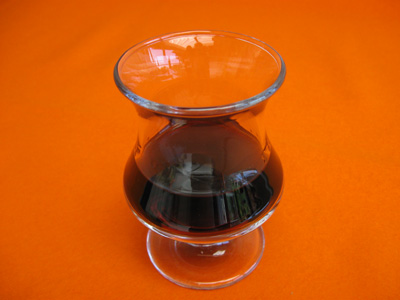
Walnut schnapps from 2015 Procedure without liability The walnuts are picked in late summer, late July to early August, while still being completely green. I use six walnuts, which are cut into quarters and drawn into a bottle of vodka. The walnuts must be completely covered with vodka. After a few weeks the schnapps turns brown, and after a few months almost black. Feel free to look at the schnapps once a week with the lid removed, because this will add a little oxygen to the glass. The walnuts are removed at Christmas time and the schnapps is filtered. 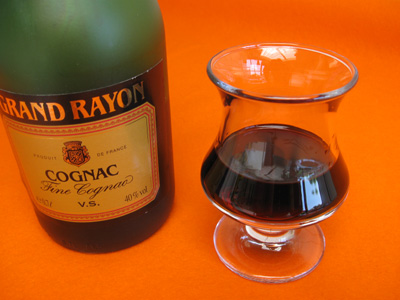
Walnut schnapps from 2015 The bottle must stand for many more months for the sediment to settle. The walnut schnapps is only drinkable after a year, but 5 years later it starts to taste as good as a French Cognac. Whether the walnut schnapps should be diluted is a matter of taste. Used as Cognac after 5 years, I do not dilute it. But if it is used before food as an aperitif, it is a good idea to dilute the walnut schnapps at Christmas time with an extra bottle of vodka of the same brand that was used for the extract. Back to the page where you came from. |
|
No. 2 Ingredients for Sloe schnapps ****
Danish version Next Down 1 bottle of Stolichnaya Vodka 38% 300 g sloe / blackthorn Brewing time 4 to 6 months Accessories: 1.5 liter decoction glass with lid The sweetness in the sloe schnapps appears when the berry has been frozen, therefore the birds only eat them when there has been frost. See also: Calculation of sugar and water in the sloe
News: In the year 2017 I came 4 pcs. "Plums in Madeira" in the sloe schnapps together with 4 tbsp. of the juice from the plums. Sloe is related to plums. 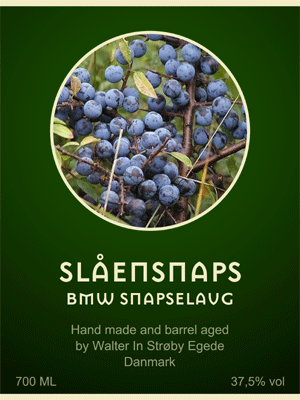
Ribe sloe for the schnapps Procedure without liability Sloe grows in many places in Denmark, mainly in forest edges and scrub, where the soil is moist. The small bluish-black plum-like berries ripen in late October to early November. After nights with frost, they can be picked and used for winemaking or as here spice schnapps. In Denmark the frost comes late, so therefore I pick my berries at the peak of the berries and put them in the freezer for a few nights. Because if you wait too long to pick the berries, the birds will eat them. The berries are pricked with a needle, put in the bottle and poured over with vodka. Place cold and dark and forget for the next 4 to 6 months, after which the berries are removed and the sloe schnapps is filtered. Let the bottle stand for a few more months for the sediment to settle. The color is orange red and the schnapps tastes a little bittersweet. 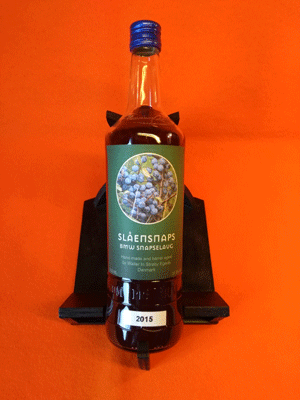
Sloe schnapps Tip: Clean all the pulp off the seeds and dry them in an oven. Crush the kernels with a hammer, put them in a glass and cover with some of the sloe schnapps. Let it soak for 4 weeks, filter and taste the sloe schnapps with this "essence". NB: In some recipes I mention Russian Vodka - Stolichnaya - which was distilled in Tambov, a Russian city in the southern part of the European part of Russia. Following Russia's 2022 invasion of Ukraine, the company in Latvia that makes Stolichnaya has changed its supplier of vodka from Tambov to Slovakia. Back to the page where you came from. |
|
No. 3 Ingredients for mint schnapps with a "Twist" of Chili Pepper ***
Danish version Next Down 1 bottle of Stolichnaya Vodka 38% 10 nice stems with leaves of the Peppermint plant or ½ l green leaves of the Peppermint plant ½ to 1 red chili pepper - split Brewing time 1 week and 1 week. See text Accessories: 1 liter glass with lid The mint schnapps gets a nice yellow-brown color and the mint tastes good in the schnapps.
Also try the mint schnapps for fish. It goes well with herring. If you lack good fish recipes, see here. Note: I have started making a 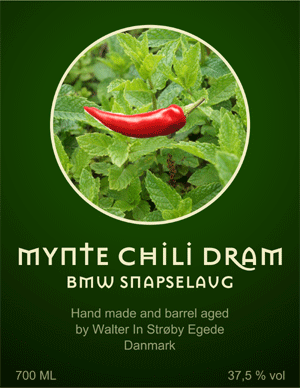
Mint schnapps Procedure without liability The mint plant is found in Denmark with many species, but the one I use I have in my the garden. It was purchased as a small spice plant and planted in the garden with the other spice plants. It must be kept "down" because otherwise the plant suffocates the other plants in the spice garden. I use the mint for two things: Mint jelly for roast lamb and mint schnapps for a stimulant - gives air in the nose if it is clogged. My plant is a Peppermint plant - in Latin Mentha-Piperita, because my plant resembles it in the leaves and flowers as well as in smell and taste. Around Sct. His I take the best stems and fill them in a clean decoction bottle - as many as possible - pour a bottle of vodka on and let it soak max. Fourteen days. The chili pepper only lasts for 7 days. The mint schnapps is then filtered and returned to the original schnapps bottle. It can be drunk immediately, but gains something after a few months of storage. 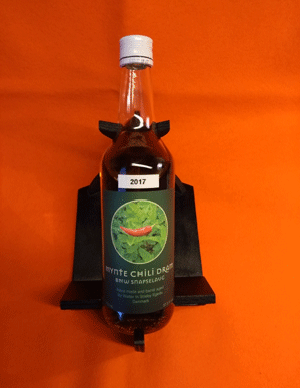
Mint schnapps Remember to taste it with the chili, you can always add more, but do not take it out. Back to the page where you came from. |
|
No. 4 Ingredients for a good Rompot - RomTopf ****
Danish version Next Down 700 ml Stroh Rom 60 (60 Vol.% alcohol) 200 g Danish blackberries 200 g Danish raspberries 200 g Danish strawberries 200 g Danish cherries, sour without stones 200 g Danish currants 200 g Danish black currants 250 g pearl sugar Options Stroh Rom 80 (80 Vol.% alcohol) or 247 ml Fine spirit 96 Vol.% Accessories: 3 l preserving jar - Fills 2345 ml The berries can be added to the glass as they ripen in the Danish summer. Partial amounts of sugar and rum are added gradually as the berries are added to the glass. If you want a very sweet Rumpot 30% sugar, you can go up to 510 g sugar, but first see Note: below.
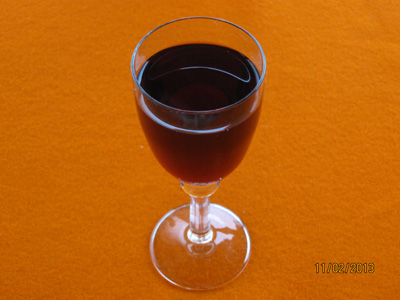
RumTopf - with Stroh Rum 60 from 2013 Excess juice was filtered and used for desserts Procedure without liability In clean glasses, the first berries are placed in the bottom and a subset (here 1/6) of sugar is sprinkled over. Pour in rum until the berries are covered. This is repeated as the berries ripen in your garden. When all the berries (here 6 kinds) have entered the glass, the last sugar must be sprinkled over and the remaining part of the rum poured over so that it covers with approx. 1 cm. The glass is closed and kept cold, dark and dry until Christmas Eve. Now you can serve a good Rompot to your risalamande. Alternatively, let some of the juice settle and use this as an accompaniment to a dessert - apple pie, ice cream and other goodies. Other berries can of course also be used - plums, gooseberries and blueberries - but if the berries are very hard, they must be pierced with a fork so that the juice draws out and the rum enters the berry. 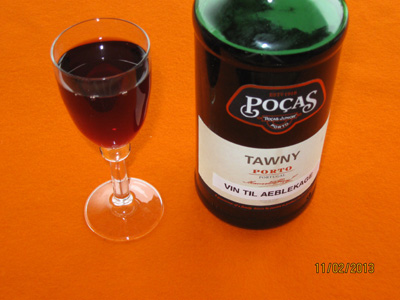
RomTopf - with Stroh Rom 60 from 2013 Here is an approximation of Port wine. Was used for apple cake Note: It is important that the alcohol percentage is high, for the sake of shelf life. The alcohol percentage decreases as it is diluted with the juice from the berries. The average for the amount of berries (1200 g), rum (700 ml, 60%) and sugar (250 g) gives an alcohol strength of approx. 22 Vol.%, sugar percentage of 18 % and a total volume of 1880 ml. In a RumTopf, the berries are not strained out, so I am not entirely sure how much it actually fills. You can use Stroh Rum 80 to adjust the alcohol percentage in your RumTopf, then you are sure of the shelf life. Or even better, use Finsprit 96 Vol.%, which is more neutral in taste. I usually do not go below 28 Vol.% for the sake of shelf life. I should mention that in 2013 I had not developed my programs in Excel or LibreOffice. You can calculate your own mixture on my RomTopf_Nr_4. Open LibreOffice in a new window. Only on a PC with the free LibreOffice calculator. Or my new Java Script: Calculation of water & sugar & Alcohol Vol.% for several berries and several alcohols for a RumTopf. If you are dealing with individual fruits and berries, you can use this model: Calculate Water & Sugar & Alcohol Vol.% in 31 fruits and berries. Back to the page where you came from. |
|
No. 5 Ingredients for a good cherry sauce *****
Danish version Next Down 350 g sweet cherries of the variety Regina 100 g pearl sugar 25 g syrup (light or dark) or heather honey 1 vanilla bean 4 whole cloves 1 pinch cardamom 1 pinch of cinnamon 130 ml Captain Morgan Rum 40% or Kirschwasser or Maraschino liqueur or Ameretto liqueur Accessories: 1 jam jar of ½ liters or the original jar Tong: Cherry Extractes The cherries are stoned with a suitable pair of tongs and placed in the glass layered with sugar, syrup and spices. The vanilla beans are mixed with a little sugar. The shell can be put in and dragged along for Christmas. If you want a slightly sweeter cherry sauce, you can go up to 50g of syrup. Alternative to syrup is honey, alternative to Rum is Kirschwasser or Maraschino liqueur. Remember your glass should be filled (almost) to the brim and stored cold and dark until Christmas.
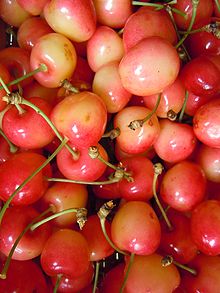
"Great Princess" Industrial production of Cocktail cherries in the United States is mainly made from the variety "Great Princess". The cherries are harvested ripe but not overripe. The cherries are stoned and then placed in salt water. The layer contains 0.7-1.5% sulfur and 0.4-1% calcium carbonate. Its pH is between 2.5 and 3.5. The process takes place at low temperatures and lasts four to six weeks. In this process, the cherries are bleached so that they lose their color and flavor completely. The process is similar to the treatment of other cherries before further treatment. Then wash the cherries thoroughly for one to two days to reduce the content of sulfur dioxide, then boil in dye in which they lie for a few days so that the whole fruit is permeated by the dye. Citric acid is added, which prevents the cherries from releasing the dye again. Finally, the cherries are soaked in Maltose syrup. Erythrosin (E127) or Allura Red AC (E129) is often used as a dye. Erythrosine may only be used in Europe for the production of cocktail cherries pickled in a syrup, and candied cherries. The original cherries "amarena" are from Bologna and Modena in Italy. The name "amarena" means bitter, which is why they get a special treatment before they come in the fine jars and are sold at a high price. The main producer of traditionally made cocktail cherries pickled in alcohol - Maraschino liqueur - is the Italian spirits producer Girolamo Luxardo. See also: Calculation of sugar and water in cherries 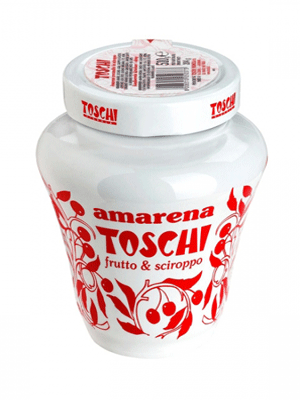
Cherry sauce for risalamande Procedure without liability There are probably many opinions about cherry sauce for risalamande. Some will have a thick sauce and others will have a thin sauce. Should it be very spicy - read perfumed - sweet or sour? I am of the opinion that cherry sauce should taste of the ingredients one comes in and preferably a bit of "Christmas". The cheap ones in cardboard boxes from Danish supermarkets are too bad and the good ones in jars from Italy are too expensive. But then it is good that in July / August you can make your own good cherry sauce for risalamande and let it ripen in the fridge for Christmas. 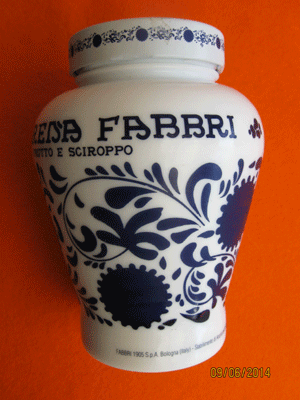
Cherry sauce for risalamande I have saved the beautiful blue jars from Fabbri Amarena, which I now use for my own recipe. There is also a red variant from Toschi Amarena. Both companies are from Italy and there is a big difference in price but a slight difference in taste. The blue 600 g is very perfumed in taste as it is added almond essence. The red 510 g is a little more "watery", hence the price difference. Both brands are made from black wild amarena cherries, sugar, water, glucose syrup, cherry juice, citric acid, aroma and grape skin color (anthocyanin) of black cherries. The small difference in taste must obviously lie in the composition of the ingredients and perhaps in the production process. The price difference, blue costs 90.00 DKK for 600 g = 15.00 DKK per 100 g - red costs 50.00 DKK for 510 g = 9.80 DKK per 100 g, I can not explain. In clean glasses, place the stoned cherries and sprinkle with layers of sugar, syrup and spices until the top is reached. Captain Morgan Rum 40% is poured on until the berries are covered. If you want to sacrifice more money, you can use the German Kirschwasser or Maraschino liqueur from Croatia. The glass is closed and kept dark and cold until Christmas Eve. Now you can serve a good cherry sauce to your risalamande. Be aware that no preservative has been added, therefore store the jar in the refrigerator. Gently shake the jar a few times a month. 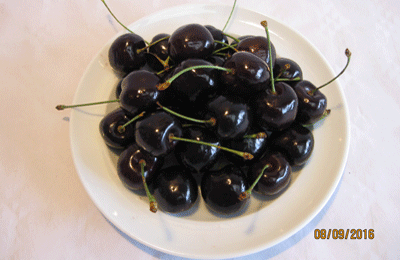
Regina sweet cherries from Danfrugt Skælskør are the ones I use You can buy your cherry trees at Dansk Hjemmeproduktion. They also sell the fine RomTopf jar for the recipe above. Back to the page where you came from. |
|
No. 6 Ingredients for plums in Madeira ****
Danish version Next Down 2.2 kg plums are picked and stoned gives approx. 2 kg without stones (shrinkage approx. 10%) 600 g pearl sugar 1 vanilla bean 1 whole cinnamon stick 4 whole cloves 1 dl water 4 dl Madeira 1 tbsp. Atamon 1 dl Captain Morgan Rum 40% or 1 dl Straw Rum 80% Accessories: 2 jam jars of 1.5 liters The syrup brine is made as follows:
Boil water and sugar for a syrup together with the spices - the vanilla bean is simply split lengthwise and cut into quarters. Turn off the heat and add Madeira and Atamon to the syrup. Pour the hot mixture over the plums. The mixture should cover the plums, if not, then refill with Jamaica Rum or a strong Stroh Rum. If you use Rum in a good amount, then you can simply dip the rubber pack in Atamon and not get it in the plums. I used Victoria plums, which I have in the garden, but all good plums can be used. The glass here is 1.5 liters. See also: Calculation of sugar and water in plums 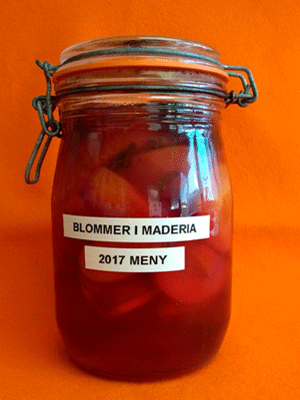
Plums in Madeira from 2017 Procedure without liability Clean a 1.5 liter boiling glass with boiling water and let it dry itself. Pour a little Atamon into the hot glass and close it. Shake the glass well and pour out the contents. What sits on the inside as well as the lid turns white when the glass is dry. This is what the "exercise" is about, namely depositing preservative on the inside of the glass. The plums are rinsed in cold water and wiped before halving and stoning. Then they are placed in the glass layered up to the edge. The syrup layer is poured over the plums. The glass is tightly closed with the gasket and left to cool, dark and dry. Now a vacuum is formed in the glass when the glass gets cold, and this helps to extend the shelf life. For the first week, I usually take the glass out and shake it so that the plums collapse and everyone is under the syrup layer. I have had unopened glass for 2 years, but once they are opened I put the glass in the fridge and then they can stay for approx. 1 month - maybe more. Tip: If you can not find Madeira, then a Portvin can also be used. Both types of wine have a strength between 19% and 20% - also called liqueur wine. For other alcohol percentage values, use my Wine and Schnapps percentage Excel spreadsheet. Open the EXCEL spreadsheet in a new window. Only on a PC with an Excel spreadsheet. Back to the page where you came from. |
|
No. 7 Ingredients for a good Christmas schnapps ***
Danish version Next Down 700 ml 37.5Vol.% Vodka 10 g Licorice root, sliced 10 g Potentilla, cut 5 g Orange peel, dried 6 g Bitter orange 4 pieces. Star anise 1 piece. Cinnamon stick 6 pieces. Cardamom 6 pieces. Carnations Bitterdram add: 2 g Wormwood (choose which one) Brewing time 2 weeks Accessories: 1 liter glass with lid A Christmas schnapps should of course taste a bit of Christmas. Therefore, there are also all the familiar Christmas spices in this schnapps. If it is to be a Bitterdram, 2 g Garden Wormwood or Beach Wormwood or Pontic Wormwood must be added. You choose for yourself. I prefer beach wormwood.
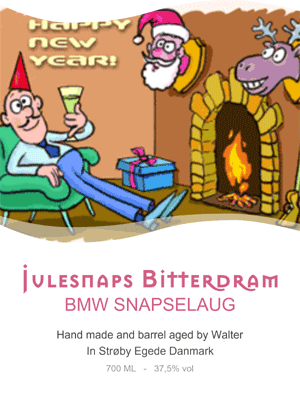
Christmas schnapps - Bitterdram Procedure without liability In a clean glass, add the dried spices and a bottle of vodka. The glass is closed and kept warm, dark and dry for two weeks. Then taste the schnapps and if you think it is good and tasty, filter it through two coffee filters and put in a clean bottle. I usually use the bottle on which the vodka is made. Put the bottle away for a few months for the Christmas schnapps to be completely ready (sediment). Now it can be decanted and the last can be drunk on the spot. I have made a Decanter with electric pump and it works perfectly. If there is a little missing for the bottle to be completely filled, dilute with more vodka of the same kind. The schnapps is made in early October, then it is ready to drink for Christmas lunch. I've started using two coffee filters stacked together, so the sediment seems to be less of a problem. But it takes longer. 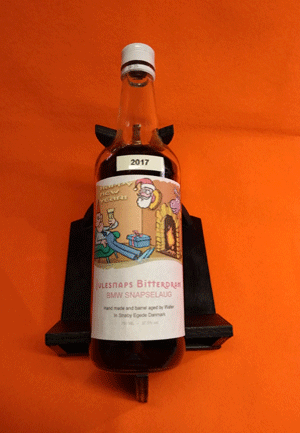
Christmas schnapps - Bitterdram Please note: In 2023 I found a 1/2 bottle of Christmas Schnapps No. 7 and a 1/2 bottle of Jelzin Bitterdram No. 10, which I mixed together for a new and really good "Dr. Jelzin's" Christmas Snaps. Not a bad idea, because then I had room for a new spice schnapps in the cupboard. Back to the page where you came from. |
|
No. 8 Ingredients for a good Master Hunter Bitterdram ****
Danish version Next Down 2 x 700 ml 40% alcohol by volume Vodka or
Brøndum Klar 119 grams of herbs according to the ingredient list 10 g / L schnapps Muscovado cane sugar dark Original Jägermeister consists of 56 herbs, fruits, roots and spices, of which I have found 53 of these. The ingredient list is found above with grams for each spice. However, 2 spices are missing in my collection - Ginseng and Mate - but the mixture is set over October 18, 2017. The original Jägermeister is made by breaking the ingredients and soaking in a solution of water and alcohol for 4 days. After which the mixture is filtered and stored in oak barrels for a year. After one year, the bitter is filtered again and mixed with sugar, caramel and alcohol to a strength of 35Vol.% A Jägermeister tastes good, but it is too sweet. That's why I do an experiment and call my bitter "Master Hunter Bitterdram". Accessories: 2 pcs. 1 liter decoction bottles with lid, rubber gasket and 2 hangers and a little patience. Tip: I have tried to add something dissolved "Pure licorice in small fractures" to Master Hunter Bitterdram and it gave the last "spice". I used 50 ml of alcohol and 5 g of licorice, which after it was dissolved, was decanted into the bitter. Try out sugar in "Master Hunter". There is a great decrease in the amount of alcohol. You could use a small sling / centrifuge for the reminiscences of all the extracts that you get. It will reduce spillage of the vodka that the herbs have soaked up. I made a Press Pistol and it works perfectly. 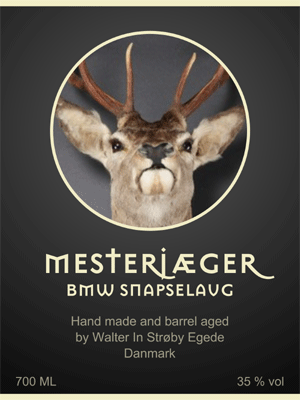
53 Herbs, fruits, roots and spices for Master Hunter Bitterdram Procedure without liability Mix all the dried herbs well and put half in separate decoction bottle and two bottles of 40Vol.% Alcohol are poured over. The bottles are closed with a rubber gasket and placed in a pot of water. The water is slowly heated to 40°C and no more. The pot should like to keep this temperature for approx. 4 hours, after which the decoction bottles are set at room temperature until the contents have taken this temperature. Now there is negative pressure in the decoction bottles. The bottles are kept warm, dark and dry for two weeks. After two weeks, the contents are filtered coarsely and the two alcohols are mixed into a new large, clean bottle. The spices are mixed and a new bottle of alcohol is poured on. Let it soak for another week or two. Then filter the contents roughly and mix the 3 alcohols. Taste the schnapps and if you think it is good and tasty, filter it through two coffee filters and put in clean bottles together with sugar. I use 10 grams of muscovado cane sugar per liter, but it's up to you to choose the amount. 10 grams of sugar lowers 1000 ml 40Vol.% To 39.75Vol.% For other alcohol percentage values, use my Wine and Schnapps percentage Excel spreadsheet. Open the EXCEL spreadsheet in a new window. Only on a PC with an Excel spreadsheet. 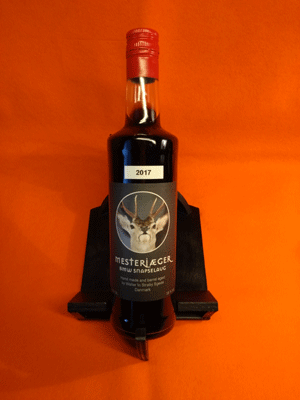
53 Herbs, fruits, roots and spices for Master Hunter Bitterdram Put the bottles away for a few weeks for "Master Hunter" to be completely ready (sediment). Now it can be decanted and the last one drunk on the spot. I have made a Decanter with electric pump and it works perfectly. If a little is missing for the two bottles to be completely filled, dilute with more alcohol of the same kind. Master hunter wins by several months of storage. I have started using two coffee filters put together - but it takes a long time - so with sediment it seems to be a very small problem. However, something can come after the sugar has come in. But do not filter for sugar, but decant only. Back to the page where you came from. |
|
No. 9 Ingredients for a good Curacao Liqueur ****
Danish version Next Down 700 ml Vodka 37.5Vol.% 4 pieces. Navel Oranges, Organic only the yellow shell 10 g Orange peel, bitter, dried 10 g Orange peel, sweet, dried 3 g Lemon peel, dried 6 g Pomeranian peel, dried 10 pcs. Almonds, chopped 11 pcs. Cloves 70 g Light Cane Sugar 130 ml of water Blue fruit color (option) Brewing time 3 to 4 weeks Accessories: 1 liter Glass Curacao is a small island in the Caribbean. Here, in 1527, the Spaniards introduced an orange - Seville orange - which is still used today to make the refreshing liqueur of the same name. The orange is a "Bitter orange", which is not normally eaten, but is good for liqueur production. See also: Calculation of sugar and water in orange.
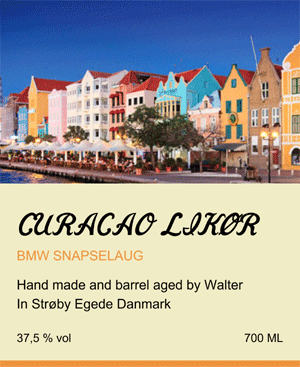
Cityscape from the capital Willemstad Error on the label, which must be 30Vol.% Procedure without liability Put the fresh orange peels and dried spices in a clean glass, and pour over a bottle of 37.5Vol.% Vodka. The glass is closed and placed in a warm, dark and dry place for 3 to 4 weeks. After 3 to 4 weeks, the contents are filtered and the schnapps is poured into a new, clean bottle. If you are satisfied with the clarity of the liqueur, it must now be mixed with sugar. I have started by making a liqueur of 30Vol.% with a sugar content of 100 grams per litre. Therefore, the recipe must be followed. Measure how many ml of schnapps came out of it, because something is lost in the fruit and the coffee filter. Dilute with more vodka so there is 700 ml in total. Mix 130 ml of water and 70 grams of cane sugar in a pan. (I use spring water without lime). For other alcohol percentage values, use my Wine and Schnapps percentage Excel spreadsheet. Open the EXCEL spreadsheet in a new window. Only on a PC with an Excel spreadsheet. Boil water and sugar until it melts - skim the surface if necessary - let the sugar mixture cool to 40°C. Pour the liqueur into the sugar mixture and stir well. Put it all in a clean clear bottle. Now fills slightly more (873 ml) than the bottle of vodka. 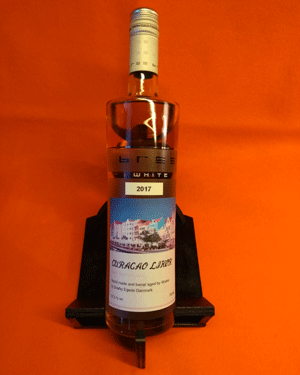
The real Curacao Liqueur without color Now it is up to you to decide if the pure yellow color should be the color of your liqueur. Or if it should be blue, add drop by drop blue fruit color until you have achieved it desired color. When I mention that oranges need to be organic, it's because we need to use the peel. I then assume that the oranges are not sprayed. Back to the page where you came from. |
|
No. 10 Ingredients for a good Jelzin Bitterdram ***
Danish version Next Down 700 ml Jelzin Vodka 37.5Vol.% 35 g Rowanberries, fresh, frozen or 10 g Rowanberries, dried 10 g Lemon peel, dried 6 g Pomeranian peel, dried 5 g Anise, whole ½ Vanilla bean, Bourbon 5 g Licorice root, dried Brewing time 10 days Accessories: 1 liter glass with lid Jelzin Vodka has changed its name to Divine Vodka. A new name but with the same content. Now why that, because it was not President Jelzin who was a criminal. He drank a lot of Vodka and was a dancing person who didn't do a "fly" any harm. It is conceivable that it was the successor who gave rise to the name change, because who wants to drink a Vodka with this name?
Fleggaard has Divine Vodka 3 l 37.5% in BIB for DKK 199.99, which gives DKK 66.66 per liter. 0.7 liters at Rema 1000 costs DKK 70.00 or DKK 100.00 per litre. So there is money to be saved when you are over the border to Germany. 
Jelzin Bitterdram Procedure without liability Rowan berries and the dried spices are placed in a clean glass, and a bottle of Jelzin 37.5% vodka is poured over. I used rowan berries of my own cultivation, which had been in the freezer for a few days. The glass is closed and placed in a warm, dark and dry place for one to two weeks. My snaps lasted 10 days. The schnapps is then tasted and if you think it is good and tasty, it is filtered through two coffee filters. Otherwise, you let it sit for a few more days. Pour Jelzin Bitterdram back into the original Jelzin bottle. Put the bottle away for a few months for Jelzin Bitterdram to be completely clear (sediment). Now it can be decanted and the last one drunk on the spot. I have made a Decanter with electric pump and it works perfectly. If there is a little missing for the bottle to be completely filled, dilute with more Jelzin Vodka. The schnapps is made in early October, then it is ready to drink for Christmas lunch. 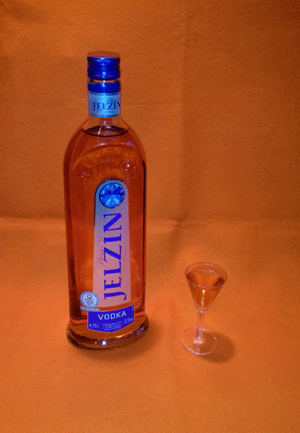
Jelzin Bitterdram Jelzin Bitterdram is now made and it has a great taste. Round and mild - not too bitter - a little sweet. Can be drunk at room temperature and I think it is good for mild cheese. It became very clear, so there is no precipitation. Please note: In 2023 I found a 1/2 bottle of Christmas Schnapps No. 7 and a 1/2 bottle of Jelzin Bitterdram No. 10, which I mixed together for a new and really good "Dr. Jelzin's" Christmas Snaps. Not a bad idea, because then I had room for a new spice schnapps in the cupboard. |
|
No. 11 Ingredients for cough syrup **
Danish version Next Down 30 g Danish Heather Honey or *Callunaheide Honey 15 g Glycerin, clean from the pharmacy 1 cl Lemon juice, organic 6 cl Vodka 37.5% vol 5 drops Peppermint oil 1 dl Blackcurrant juice, concentrated or the juice you prefer Maybe Aronia Juice from COOP Accessories: 250 ml clean bottle 1 dl metal bowl 1 droplet pipette 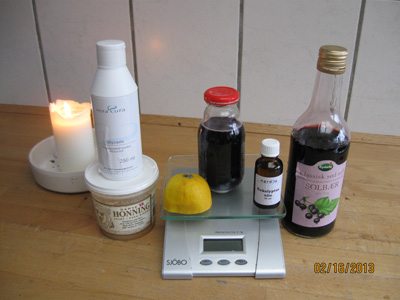
A good cough syrup for productive cough Procedure without liability Use a small metal bowl of 1 dl to heat honey and glycerin in. It must not get too hot (max 30°C), but just melt together. Cool slightly and mix in Vodka and lemon juice. Drizzle 5 drops of Peppermint oil in and stir. Pour into a 250 ml clean sterile bottle. The mixture that you have just made takes up approx. 100 ml and it is now diluted with approx. 100 ml of concentrated blackcurrant juice or the juice you prefer. Shake the bottle well for the next 2 days. Store in the refrigerator. Limited durability.
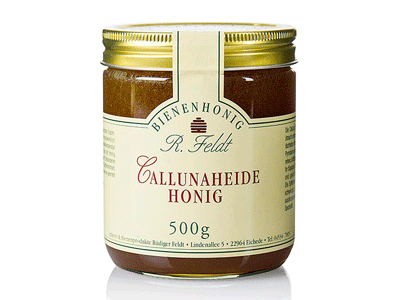
Expected alcohol > 8Vol.% Alcohol content in alcoholic beverages can be calculated by this formula: alcohol [ml] = amount [ml] * vol. %. Thus, a bottle of schnapps gives 700 ml * 40% = 280 ml. Or 280 * 0.789 = 221 grams of alcohol. One unit of alcohol is equal to 12 g of pure alcohol (ethanol CH3CH2OH), and in a 40Vol.% Vodka there are 221/12 = 18.4 unit of alcohol, each of 70/18.4 = 3.8 cl Vodka. Glycerin is also a "sugar alcohol" that helps increase the alcohol percentage in cough syrup? There is 16 ml of alcohol in 200 ml of the cough syrup. It provides an 8Vol.% strength. *Callunaheide Honey is a special heather honey that comes from large heather areas in Germany, Norway and the Pyrenees . This heather honey is very tough and sticky, so it makes a good cough syrup for productive coughs. The soothing enzymes in honey die at temperatures above 38°C. Back to the page where you came from. |
|
No. 12 Ingredients for a good Cranberry Liqueur - Lady Like ****
Danish version Next Down 700 ml Vodka 37.5Vol.% 250 g Cranberries, fresh 1 Nutmeg, crushed 10 pcs. Cardamom seeds, crushed 1 piece. Cinnamon, whole 2 pcs. Mandarins with peel, organic Options: 1 Clementine or 1 Orange Option: 1 tbsp. Heather honey Brewing time 8 weeks and then 2 weeks Store in the dark. In sunlight the schnapps loses its color Accessories: 1 liter glass with lid The schnapps gains a lot when stored for several months. Store in the dark. In sunlight, the schnapps loses color. See the recipe below Cranberry Snaps. See also: Calculation of sugar and water in cranberries
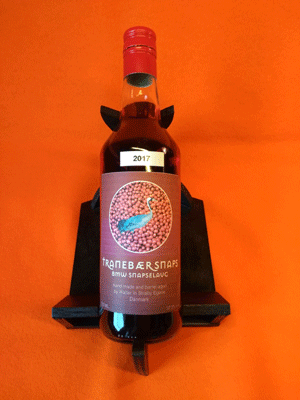
Cranberry Liqueur - Lady Like Procedure without liability I just bought fresh cranberries, which are put in the freezer for a few days before I start mixing. Fresh fruit / berries burst the cells so that the aroma and essential oils can better be absorbed into the alcohol. That's my thesis. The frozen cranberries are thawed and cut in half and put in a glass, add the 3 spices and mandarin both. Option: Dissolve honey in some of the vodka at 30 ° C to 40°C. Once the honey is dissolved, mix it in the rest of the vodka, and put it all in the bottle for the spices and fruits. The bottle is now placed warm, dark and dry. Must draw 2 months (minimum). Taste the schnapps and rate color (pink to red) and sweetness. The color may disappear if the schnapps is exposed to sunlight. You can always let the schnapps absorb a little more and honey can be added if there is a lack of sweetness. If the color and sweetness are satisfactory, remove the berries, tangerines and spices using a sieve. The schnapps is poured back into the clean glass and left in the dark for at least a week - preferably more. The schnapps forms a sediment that you do not want to get into the coffee filter before the clear schnapps has run through. The sediment tends to stop the filter quite quickly. This applies to all schnapps with citrus fruits. Note: Cranberry Liqueur still drawing. When it's done, I'll try my Philips juicer on the pulp, because there's still a lot of vodka in the cranberries. Is now tested but can not be recommended for the Cranberry Liqueur. 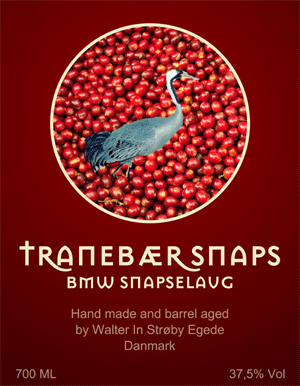
Cranberry Schnapps Cranberry Snaps I had 100g of extra cranberries, which I put a bottle of vodka on and put away for two months. It has now been found and filtered through a coffee filter. It has a great color and taste, is crystal clear, so there is no need to make more of it. I call it Cranberry Snaps as it only has the natural sweetness of the cranberries. I can only recommend making such Cranberry Snaps. The cranberries were squeezed through my Press Pistol and gave more than 10 cl of snaps. Fantastic effective tool. Can be recommended for Cranberry Snapsen. Back to the page where you came from. |
|
No. 13 Ingredients for a good Hunter schnapps ***
Danish version Next Down 700 ml Vodka 37.5Vol.% 5 g rowan berries, dried or fresh 20 g rowan berries, fresh 5 g Smooth licorice, root cut 3 g Tormentil root, cut 2 g Pors leaves, dried 1 g Rose petals, dried 3 g Rose hips, dried 2 g Heather flowers, dried 3 g Yarrow - Achillea, dried leaves 1 g Kvan seeds, dried 1 g Rejnfan (bitter) or 1 g Garden Wormwood, or 2 g Beach Wormwood> (bitter) Brewing time 1 week Accessories: 1 liter glass with lid The schnapps wins a lot by storage for several months. 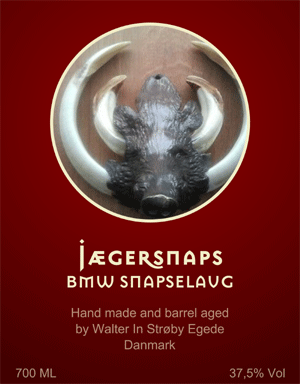
Hunter schnapps Procedure without liability I got hold of dried rowanberries, so I will try it for the first time. Most dried herbs are easy to buy in specialty stores with spices. But Tansy Common, Beach wormwood and Garden Angelica seeds are not easy to obtain. Tansy Common contains the toxin thujon, which can only be ingested in very small amounts, but the plant contains many different essential oils such as camphor and tobacco flavor. In addition, the plant gives a bitter taste, which can also be produced with Garden wormwood and Beach wormwood. Garden wormwood is used in absinthe and also contains many different essential oils, including thujon (thujon occurs in the plant thuja) so it is also used wisely. Garden Angelica seeds and leaves are used for bjesk, vermouth, liqueur and gin. Also in Carlsberg Jacobsen beer. So it should be available.
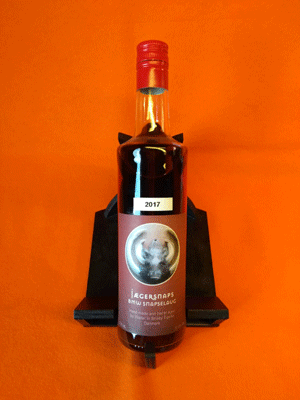
Hunter schnapps Put all the herbs in the glass and pour a bottle of vodka over. Set the glass dark and warm for a week. Taste the schnapps and if it is good, then filter it and put it in a clean bottle. Store it away for a few months and check for sediment. If so, decant the schnapps. If it is to be sweetened, then add a few sugar lumps in the schnapps, and when they are dissolved, it is ready to drink. Back to the page where you came from. |
|
No. 14 Ingredients for a good Fishermann Bitter ***
Danish version Next Down 700 ml Vodka 37.5Vol.% Spice schnapps brewing time 2 weeks: 5 g Licorice root, sliced 5 g Tormentil root, cut 5 g gentian root, sliced 5 g Althearod, sliced 4 g Eucaluptus leaves, dried 1 g Garden wormwood, dried 3 g Fennel seeds 3 g Anise seeds 3 g Peppermint, dried 2 g Coffee beans Espresso Licorice brewing time 2 weeks: Sweetened down to approx. 35Vol.% With 10 g Heather honey 10 g Muscovado cane sugar 10 g Pure licorice in small brides 40 ml of clean water Accessories: 2 pcs. 1 liter glass with lid Note: Pure licorice in small fractures is also available with: Anise - Mint - Orange - lemon - Violet If you use these, you have to try fennel seeds, anise and peppermint in the spice schnapps. Using these licorice lozenges makes filtering easier, as the coffee filter does not stop so easily.
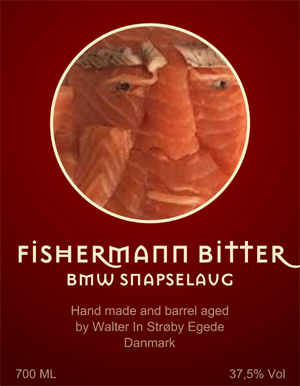
Fishermann Bitter Procedure without liability It will be convenient to use 2 glasses with lids to make this bitter. Put all the dried herbs in a glass and pour 3/4 of the vodka on. Close the lid and set the mixture away warm, dark and dry, for 2 weeks. In the second glass, add 40 ml of clean water, (I use bottled mineral water, without lime) heather honey, muscovado cane sugar and pure licorice in small fractures. Put the bottle in a water bath and heat to 50 ° C, shake well so that the ingredients dissolve and mix. Then pour in the rest of the vodka and close the lid. Placed on the "Fireplace shelf", where you can grab it for the next 2 weeks, so it can be shaken every day. The last week, the bottle is kept still to settle. After 2 weeks, the herbs are filtered off and the clear bitter is placed in a clean bottle. The sweet mixture is carefully decanted in so that any sediment does not enter. 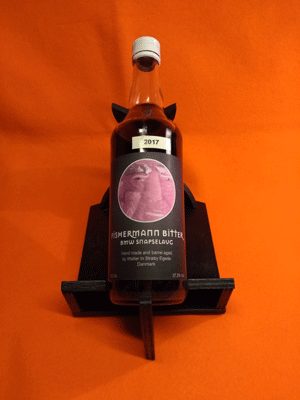
Fishermann Bitter Tip: Should there be a very thick sediment left, dilute it with more vodka, shake the bottle daily for 1 week or 2. Put the bottle still for a week and decant the contents into the bottle with: Fishermann Bitter. You can also pour everything into a glass and let it soak for 3 weeks, but there is a risk of problems with filtration. It is up to one to try oneself. If you want Fishermann Bitter reduced to 30Vol.% Use 150 ml of water. For other alcohol percentage values, use my Wine and Schnapps percentage Excel spreadsheet. Open the EXCEL spreadsheet in a new window. Only on a PC with an Excel spreadsheet. Back to the page where you came from. |
|
No. 15 Ingredients for a good 1 Single Bitter or 2 ***
Danish version Next Down 700 ml Vodka 37,5 Vol.% Spice schnapps brewing time 2 weeks: 5 g Licorice root, sliced 5 g gentian root, sliced 5 g Anise 4 pieces. Star anise 2 g Ginger, dried 3 g Lemongrass, dried 5 g Lemon peel, dried 5 g Orange peel, dried 5 g Pomeranian peel bitter, dried 2 g Garden wormwood, dried Licorice session brewing time 3 weeks: Sweetened down to approx. 35Vol.% With 10 g Heather honey 10 g Cane sugar 5 g Pure licorice in small brides 40 ml of clean water Accessories: 2 pcs. 1 liter glass with lid Note: Pure licorice in small fractures, see under schnapps no. 14. Using these licorice lozenges makes filtering easier, as the coffee filter does not block so easily.

1 Single Bitter or 2 Procedure without liability It will be convenient to use 2 glasses with lids to make this bitter. Put all the dried herbs in a glass and pour 3/4 of the vodka on. Close the lid and set the mixture away, warm, dark and dry, for 2 weeks. In the second glass, add 40 ml of pure water, (I use mineral water from a bottle, without lime) heather honey, cane sugar and pure licorice in small fractures. Put the bottle in a water bath and heat to a maximum of 40 ° C, shake well so that the ingredients dissolve and mix. Then pour in the rest of the vodka and close the lid. Placed on the "Fireplace shelf", where you can grab it for the next 2 weeks, so it can be shaken every day. The last week, the bottle is kept still to settle. After 2 weeks, the herbs are filtered off and the clear bitter is placed in a clean bottle. The sweet mixture is carefully decanted in so that any sediment does not enter. I have made a Decanter with electric pump and it works perfectly. 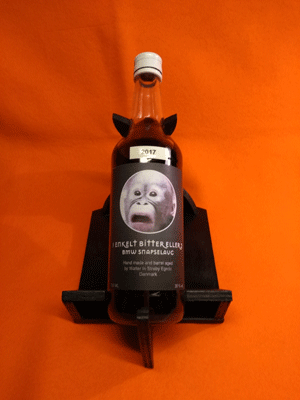
1 Single Bitter or 2 Tips: Should there be a very thick sediment left, dilute it with more vodka, shake the bottle daily for 1 week or 2. Put the bottle still for a week and decant the contents into the bottle with: 1 Single Bitter or 2. You can also pour everything into a glass and let it soak for 3 weeks, but there is a risk of problems with filtration. It is up to one to try oneself. If you want 1 Single Bitter or 2 set down to 30Vol.%, Use 150 ml water. For other alcohol percentage values, use my Wine and Schnapps percentage Excel spreadsheet. Open the EXCEL spreadsheet in a new window. Only on a PC with an Excel spreadsheet. Back to the page where you came from. |
|
No. 16 Ingredients for a good Kras'Bjesk
Danish version Next Down 2 x 700 ml Vodka 37.5 Vol.% 2 g Allspice (Jamaica pepper) 1 g Angelica root 5 g Anise seed 2 g Orange peel, dried 2 g Bogbean/Buckbean (Menyanthes trifoliata) - bitter, lacking 2 g Chili 0.5 g Juniper 1 g Gentian root 1 g Fennel seed 5g Rosehip husks, dried 4 g John's wort, missing or 4 Tonka beans, 4 cl essence 8 pcs. Coffee beans, slightly crushed 8 pcs. Cocoa beans, slightly crushed or cocoa nibs (essence) 1 pc. Cinnamon stick, whole 0.5 g Cardamom, whole ground 2.5 g Chinese bark, whole 0.5 g Coriander seeds 0.5 g Cloves, whole cloves 1 g licorice root, cut 1 g Lavender flower 2 tsp. Heather honey, or 4 cl essence 2 g Moss spores, leaves or squeegees - Myrica gala 1 g Paradise seed 1 g orange peel 1 g rhubarb root 5 g Pure licorice in small pieces 3 g Yarrow - Achillea 0.25 g Saffron, or 4 cl essence 2 g Sandalwood Red, gives color 2 pieces Star anise 2 g Wormwood, dried or 4 cl essence 1/2 vanilla pod, split Brewing time 4 weeks Accessories: 1 liter glass with lid This Kras'Bjesk will be tested with the above herbs. I have now worked with the weight distribution among the herbs and have come to the above result. You may need to use 2 fl. Vodka, but I'll see that along the way. There are approx. 55 grams of herbs in total.
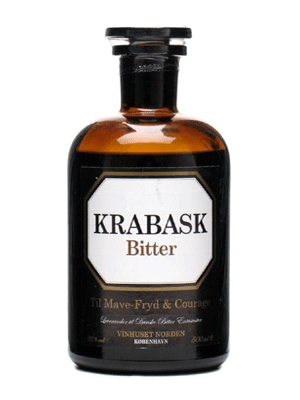
Kras'Bjesk Procedure without liability The recipe is under development - coming soon. Just need to find all 32 herbs and spices - 3 more missing. No! I have found Paradis seeds in Sweden. Missing John's wort and Bogbean (Menyanthes trifoliata). Paradise grain has become more popular in Europe as it is used in several beers, gin, Norwegian aquavit and gourmet cuisine. Instead of Buckbean you can use: Another herb that makes the schnapps bitter. But beware because there is already Beach wormwood in it. For carob, I have no idea for a replacement. Maybe Tonka beans? Back to the page where you came from. |
|
No. 17 Ingredients for a good sea buckthorn schnapps ***
Danish version Next Down 700 ml Vodka 37,5 Vol.% 500 g Sea buckthorn, berries cleaned of stems and leaves 25 g Rose hip shells, dried 6 pieces. Cardamom, whole 1 pk. Saffron 0.5 g, gives a good color But an expensive solution 1 to 2 tbsp. Heather honey Brewing time min 2 months Accessories: 1 liter glass with lid Sea buckthorn is known by many names, such as sea buckthorn, sand buckthorn, dandelion and Nordic lemon due to its high content of vitamin C. The taste is, in my opinion, a little sour / sweet and a little bitter and somewhat delicate, however, without squeezing the mouth together.
Can well tolerate a little company with some delicate flavors. See my note below. See also: Calculation of sugar and water in sea buckthorn 
Buckthorn schnapps Procedure without liability My friend from the schnapps guild was in North Jutland in October, to visit the family who live off the east coast. Here there are "wild" many sea buckthorn, but as he said: "You will look like a ragged cat if you are not careful when picking". Therefore, it is recommended to wear gloves and then cut some branches of she plants where the berries sit close together. Put the bag in the freezer for a few days and then remove the berries with a suitable fork. Pour the rose hip peel, cardamom, saffron, heather honey and the cleaned, rinsed and dried berries into a glass - in that order. Pour a bottle of vodka onto the berries, put the lid on and put the bottle away for at least 2 months in a cool, dark and dry place. When it is winter, the bottle is taken out and the contents are first strained into a metal strainer, then the liquid can be squeezed out of the berries. The schnapps is then filtered through a coffee filter and put into a clean bottle. 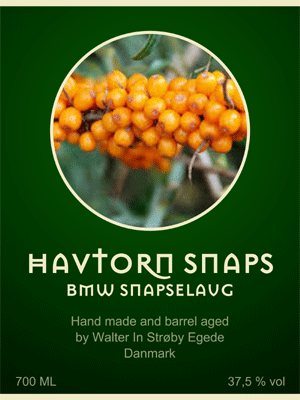
Buckthorn schnapps Taste the schnapps and fill the bottle with a little more vodka. If it lacks sweetness, now is the time to do it. Save the bottle for another 1 month and it is ready to drink for Easter. Therefore only *** stars. Please note: It was made in 2017 and now in 2023 I found it and tried it again. Now it gets **** stars. Then you can see what a long maturation gives to the products. Another tip is also to sweeten the sea buckthorn schnapps with "Glycerin 99.5%" E422. See No. 52 how to do. Sweet berries other than rose hips can also be used. Wild blueberries / blackberries, lingonberries, cranberries, mulberries and pomegranate seeds. Try it yourself. Back to the page where you came from. |
|
No. 18 Ingredients for a good Aronia Liqueur ****
Danish version Next Down 700 ml Vodka 37,5 Vol.% 300 g Aronia berries, fresh or 180 g Aronia berries, dried 6 pieces. Cloves 1 piece. Cinnamon, whole 2 pieces. Star anise 1/2 stick Vanilla Bourbon, cut 1/2 piece. Nutmeg, crushed After the mixture is drawn and sieved add 100 g Heather honey 50 ml Water only for dried aronia berries Soaking time 2 to 3 months and matures for 6 months. Accessories: 1 liter glass with lid A little aronia berry schnapps and *heather honey are mixed, heated to max. 38°C so that it melts together, and then mixed into the aronia liqueur. The Aronia Liqueur with 300 grams of fresh berries ends up with an alcohol strength of 27 Vol.% with the stated amount of honey. For 180 grams of dried berries, the alcohol strength ends up at 34 Vol.% with the stated amount of honey. The liqueur takes on a deep red colour. If a strong aronia liqueur is desired, use dried aronia berries. See also: Calculation of sugar and water in aronia berries.
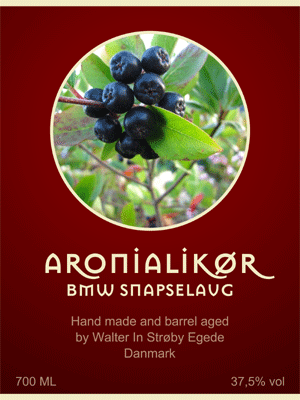
Aronia Liqueur Procedure without liability Aronia berries, also called sour berries, are well suited for an "Aronia Liqueur". It is tasty and full of vitamins, minerals and antioxidants. Antioxidants fight "The Free Radicals" in the body, that's what James Bond said in a movie (forgot which one). If fresh aronia berries are used, they are crushed first before being placed in the glass. I also suppose you could put them in the freezer for a couple of days before using them, in retrospect I only use this method now. The dried aronia berries are simply put in the glass. Then put the dried spices in the glass. Heat water and honey so it melts together and put it in the glass. Pour on a bottle of vodka, put the lid on, put the bottle away for 2 months cool, dark and dry. When it is spring, the bottle is taken out and the contents are first sieved in a metal strainer, then you can squeeze the liquid out of the berries. The schnapps is then filtered through a coffee filter and placed in a clean bottle. Taste the schnapps and fill the bottle with a little more vodka. If it lacks sweetness, now is the time to do it. Save the bottle for another 1 month and it is ready to drink for Easter. 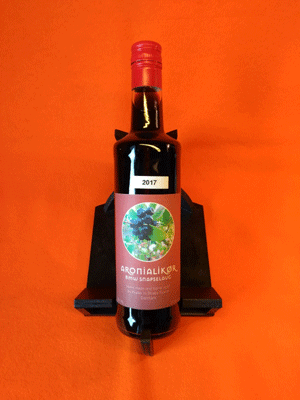
Aronia Liqueur Tip: I've heard that you can make jam from the aronia berries afterwards, but have not tried it. Judge for yourself. I squeezed the aronia berries through my Press Pistol, so there was almost nothing to make jam from, but I got 15% more schnapps out of them. Experiment in 2024 with Aronia berries made in two ways - fresh and dried at home in the oven - for an Aronia SnapsOn FB I have promised two recipes for aronia berries, one made with fresh berries and one with dried berries. Here comes the first result. I picked 5 kg of aronia berries the last week of August 2024 and the first two weeks of September. When I came the following week and wanted to pick a few more kilos, everything was ripped - either by birds or people who had heard of aronia berries on the spot. The berries that I use were all picked in September and were fantastically large and beautiful. I made two portions of 300 grains and below you can see what I came up with.

300 grams fresh aronia berries 700 ml Swedish Vodka 37.5 Vol.% 300 g Aronia berries, fresh Soaking time 2 months. Until mid-January 2025 Accessories: 1 liter glass with lid Expected result: Aronia berries contain 79.0% water and 8.0% sugar. Inserting these values into my Excel calculation program results in: An Aronia Berry Snaps at ABV 28 Vol.% and ABW 23%. The mixture takes up 937 ml with a sugar percentage of 2.6%. In 300 g of aronia berries there are approximately 63 g of dry matter, so the starting bottle should be for 937 ml + 63 ml = 1000 ml. See the bottle on the left. 
180 grams of dried aronia berries 700 ml Swedish Vodka 37.5 Vol.% 180 g Aronia berries, dried after 4 hours at 60°C in my convection oven Soaking time 2 months. Until mid-January 2025 Accessories: 1 liter glass with lid Expected result: The aronia berries above have lost 300 - 180 = 120 grams of water, which corresponds in percentage to 40% loss. Remaining water content becomes 79% - 40% = 39%. In the Excel spreadsheet, you must therefore insert 39% for water content instead of 79%. But the spreadsheet is password protected, so you can't do that. The code must be collected from me. I can do that and come up with the following result: An Aronia Berry Snaps at ABV 32 Vol.% and ABW 26%. The mixture takes up 817 ml with a sugar percentage of 2.9%. In 300 g of aronia berries there are approximately 63 g of dry matter, so the starting bottle should be for 817 ml + 63 ml = 880 ml. See the bottle on the right. 
300 g fresh to the left and 180 g dried to the right aronia berries Conclusion: By drying 300 grams of aronia berries for 4 hours at 60°C in a hot air oven, the alcohol percentage can be raised from 28 Vol.% to 32 Vol.% and the sugar percentage from 2.6% to 2.9%, by removing 120 grams of water from the berries. In principle, I had to dry for a few more hours, so that I removed (almost) all the water (300 * 79% = 237 grams). But you should also look at "Cost Benefit", such as buying a Vodka with a higher alcohol percentage. As a curiosity, I can mention that the company Mettler Toledo manufactures and sells small moisture analyzers that can determine the water content of berries and fruit in a very short time. Appliances consist of only two components - a scale and a heating unit. The test is done in exactly the same way as I have done. The sample is weighed before and after heating/drying and assumes that any weight loss is water. The device continuously measures the weight loss and as soon as the weight loss stops, it is assumed that all water has been expelled. The device then calculates the water content in % (weight before - weight after = weight loss and (weight loss / weight before)*100 = water content in %. I will return when the berries are to be sieved with further information. Back to the page where you came from. |
|
No. 19 Ingredients for a good Old Danish Dram ****
Danish version Next Down 700 ml Vodka 37,5 Vol.% 20 g Rowanberries, fresh, frozen or 5 g Rowanberries, dried 6 pieces. Cloves 20 g Almonds, sliced 1 piece. Vanilla Bourbon stick, cut 1 g Cardamom, whole, crushed 1 Nutmeg, whole, crushed 15 pcs. The five peppers, whole, crushed 1 g Allspice, whole, crushed 5 g Pure licorice in small brides 1 tsp. Muscovado cane sugar, dark or 1 tsp. Heather honey A little touch of Chili Pepper Soaking time 2 weeks Accessories: 1 liter glass with lid You should not confuse this "Old Danish Dram" with the one you buy. I have made it a little more round and soft in taste - not so bitter. But with a touch of Chili Pepper. I add my Chili essence in drop form.
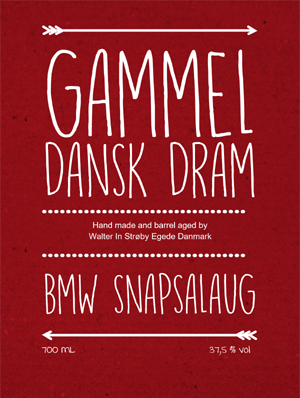
Old Danish Dram Procedure without liability It is the rowanberries that make this dram bitter, therefore I have limited the amount to 20 g. I myself have good rowanberries in the garden, so these are the ones I use. I have only used dried rowan berries in ready-made spice mixes. I have weighed these rowanberries and come to approx. 5 g, which I then use in this recipe. I am happy to sweeten a little with heather honey, it gives a good taste of heather flowers. Heather flowers can also be bought dried if you do not want to sweeten your schnapps. Muscovado cane sugar is also an option in schnapps that must be dark, it is a sugar that has not been refined. Has a better taste, the dark tastes a bit of licorice, the light tastes a bit of caramel. You choose. Put all dried herbs in the glass and pour heather honey / Muscovado cane sugar on top. If fresh rowan berries are used, they are placed in the glass so that they keep the herbs under the vodka. Pour on a bottle of vodka, put the lid on, put the bottle away for 2 weeks warm, dark and dry. 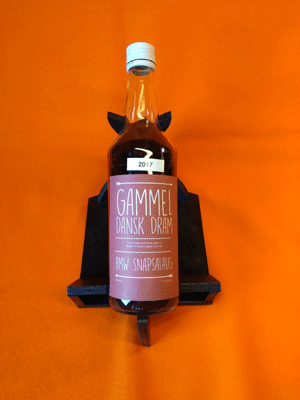
Old Danish Dram Taste the schnapps and if it is good, filter it through 2 coffee filters. Gammel Dansk Dram is put away for a few weeks to get a homogeneous taste. Then it is ready to drink. All spice schnapps wins by aged for months of storage. Back to the page where you came from. |
|
No. 20 Ingredients for a good Mulberry schnapps *****
Danish version Next Down 700 ml Vodka 37,5 Vol.% 100 g Mulberries white, dried 5 g Lemongrass, dried 1/4 Lemon peel organic only the yellow Alternative to lemongrass and lemon peel: 50 g sea buckthorn, fresh 10 g Almonds, sliced, 10 pcs. 1 stick Vanilla Bourbon, cut 1 g Cardamom, whole, 10 pcs. 50 g Heather honey (see text) Soaking time min 2 months Accessories: 1 liter glass with lid I would recommend that you experiment with the amount of heather honey depending on whether you want a mulberry schnapps (no heather honey) or a mulberry liqueur (heather honey as desired). You can always add more heather honey when the brewing time is reached.
A little about mulberry leaves. Used as a tea in Asian countries and helps lower blood sugar. Drinking a few cups of tea after a meal reduces the digestion of starch (carbohydrates) in food and avoids blood sugar peaks. The larvae of the silkworm also feed on mulberry leaves, and who has heard of a silkworm with diabetes? I got a fantastically good Mulberry Liqueur out of this mixture. If it is a Mulberry Snaps, you should go down to 5 g of heather honey or less. Dried white mulberries can be bought at Helsebixen. I have ordered again in 2024, will arrive at the beginning of October. 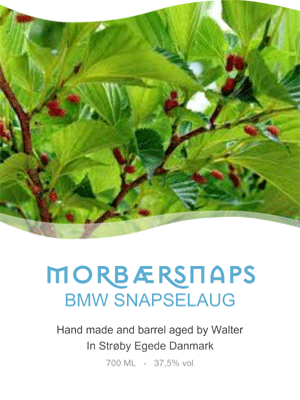
Mulberry schnapps Procedure without liability Mulberries are rarely found fresh in the trade as they decay very quickly. So if you want to make a mulberry schnapps, buy yourself a mulberry tree and plant it in the garden. There are several varieties: White mulberry, black mulberry, red mulberry and a hybrid between red and white mulberry. The tree can grow very well in Denmark in shelter and sun. I have heard that mulberries grow on Bornholm, and they can be picked in the late summer. I have bought organic mulberries, which originate from Turkey, which is known for its white mulberries, and are sold as dried mulberries. Mulberries taste like blackberries and raspberries, but are a little flat in taste. Therefore, a little acid in the form of lemons must be added. Lemongrass also gives a little sweetness and lemon peel a little bitterness. Fresh mulberries are very choppy and juicy a lot, so be careful with the color of black mulberries. The spices come in a glass along with the dried mulberries. Pour on a bottle of vodka, put the lid on, put the bottle away for 2 months cool, dark and dry. When the brewing time has elapsed, the bottle is taken out and the contents are first sieved in a metal strainer, then you can squeeze the liquid out of the berries. The schnapps is then filtered through a coffee filter and placed in a clean bottle. 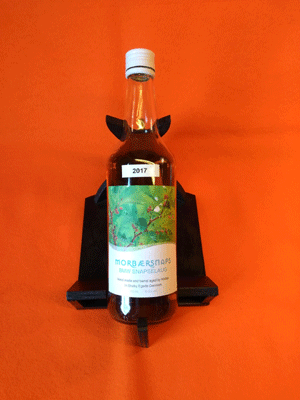
Mulberry schnapps Taste the schnapps and fill the bottle with a little more vodka; if it lacks sweetness, now is the time to do it. Store the bottle for another 1 month and it is ready to drink. You could use a small sling/centrifuge for the reminiscences of all the extracts that you get. This will reduce spillage of the vodka that the berries have soaked up. Does anyone have a suggestion for one? It's fixed with my Press Pistol. Back to the page where you came from. |
|
No. 21 Ingredients for a good Absinthe Pernod Bitter ***
Danish version Next Down 700 ml Finsprit 60 Vol.% or 700 ml Vodka 37.5Vol.% 20 g Fennel seeds 20 g Anise seeds 6 pieces. Star anise 10 g Licorice root, sliced 7 g Coriander 5 g Hyssop, dried 1 Nutmeg, crushed Choose 1 of the 3 wormwoods in that order: 2 g Pontic wormwood, dried 2 g Beach wormwood, dried 2 g Garden wormwood, dried 1 g Peppermint, dried 1 g Lemon balm, dried 1 tsp. Heather honey Green fruit color Soaking time 1 month Accessories: 1 liter glass with lid The first Absinthe Pernod I made was on Vodka 37.5Vol.% because it's the one we normally use. It can thus be enjoyed without diluting it with water, and it tastes excellent. If fine spirits are used 60Vol.%, The drink should be diluted with water.
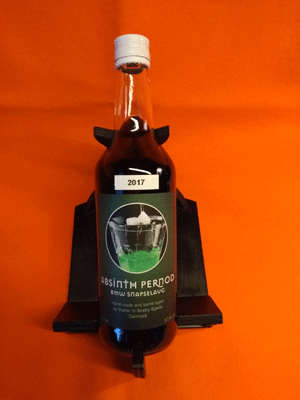
Absinthe Pernod Bitter Procedure without liability Absinthe was known in France in the artist milieu in the 1800s. In the 1920s, the sale of absinthe was banned because it was believed that the content of the drug Thujon drove people crazy. It was now probably the high alcohol percentage and then the amount of absinthe they drank. Thujon is found in wormwood, but in the amount of wormwood given in the recipe, there is no danger. A common EU rule says a maximum of 10 mg / liter of Thujon in an alcoholic beverage. If "Bitter" is written on the label, the limits are 35 mg per. liters. I will remember that for next time. I have mentioned 3 types of wormwood and the least bitter first: Pontic wormwood/Roman wormwood (Artemisia pontica), Beach wormwood (Artemisia maritima) and Garden wormwood (Artemisia absinthium). All three can be used, I used garden wormwood because I could not get the other two. They can be bought at nurseries as a perennial plant, so you can grow them yourself in the garden. I have now found Strand wormwood at the Wadden Sea in Jutland. Add all the dried herbs and a teaspoon. heather honey in the glass, pour a bottle of vodka on, put the lid on, put the bottle away for 1 month cool, dark and dry. When the brewing time has elapsed, the bottle is taken out and the contents are first sieved in a metal strainer, then you can squeeze the liquid out of the herbs. The schnapps is then filtered through a coffee filter and placed in a clean bottle. 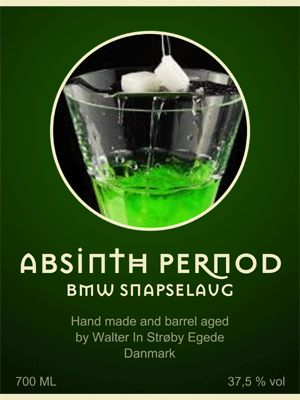
Absinthe Pernod Bitter If the absinthe is clear enough, add green fruit color drop by drop until the desired color is obtained. Back to the page where you came from. |
|
No. 22 Ingredients for a good plum liqueur ****
Danish version Next Down 500 ml of the plum juice in Madeira 200 ml Captain Morgan Rum 40% My alcohol blend for the plums consists of 400 ml Madeira 19%, 100 ml Captain Morgan Rum 40% and 100 ml Stroh Rum 80%. Mixing these three gives a mixture of 600 ml with 33% alcohol. In this mixture the plums suck for a year.
The plums are used for desserts, but there is always juice left over for approx. 22% alcohol that I collect and add more Captain Morgan Rum. This is the one described here: Plum liqueur 28 Vol.% 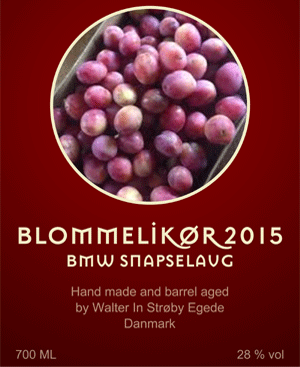
Plum liqueur 2015 Procedure without liability We have several Victoria plum trees in the garden and usually they give plums to the big "Gold Medal", just not in 2017. For several years I have been making Plums in Madeira - see recipe no. 6 - and the excess juice is not lost. It is stored for at least a year in a cool, dark and dry place. During this year, the wine has settled and become crystal clear. It is decanted into a new, clean bottle. I have made a Decanter with electric pump and it works perfectly. A 700 ml bottle of wine gives 500 ml before the sediment starts to flow. The bottle is filled with the same rum that was used for Plums in Madeira. 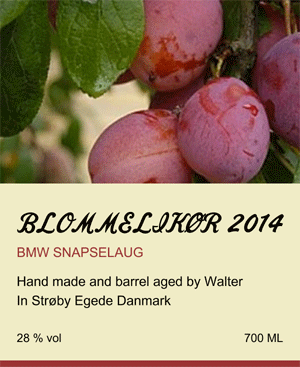
Plum liqueur 2014 Captain Morgan Rum is inexpensive and extremely excellent for this purpose. There are so many flavor nuances that after a few years have formed a perfect whole. In the recipe - Plums in Madeira - I mention something about Atamon, which I used before I came up with making Plum Liqueur. I do not use it anymore, as it is not necessary when the "wine" in which the plums are, is at 33% alcohol. I also collect the juice from Rompot and Cherry, recipe no. 4 and 5, treat this in the same way and get a fantastic dessert wine for ice cream. Nothing should be wasted. Back to the page where you came from. |
|
No. 23 Ingredients for a good Christmas orange schnapps ****
Danish version Next Down 700 ml Vodka 37.5Vol.% 2 Oranges, organic ½ Lemon, organic 1.5 g Cloves 15 pcs. 12 g Cinnamon sticks 2 pcs. 1.5 g Cardamom seeds 15 pcs. 1 stick Vanilla Bourbon, cut 5 g Coffee beans Espresso 40 pcs. 1 tbsp. Heather honey Soaking time 1 month Accessories: 1 liter glass with lid The peel of the oranges and lemon is finely chopped off, so that very little of the white comes with it. See also: Calculation of sugar and water in orange.
New: I have purchased a Swissgold gold filter, so it is used instead of a coffee filter. A Philips juice press/centrifuge is also included. But it has not yet been tried, as the spice schnapps is still brewing. 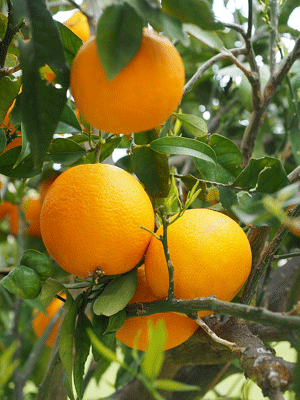
Christmas orange schnapps Procedure without liability It will soon be Christmas, so a traditional Christmas schnapps must also be made for the "sweet" Christmas time. How sweet it should be, you decide for yourself by adding more or less heather honey. A tablespoon will be medium sweet, so you have a starting point for the dosage. Start by rinsing the citrus fruits, remembering organic fruits, wiping them off for water and cutting off the peel finely. Put the shells in the glass. Peel the oranges so that the white comes off, divide them into small boats. Put them in the glass. The lemon is also peeled for the white, but only half of the lemon comes in the glass. The spices and heather honey are put in the glass and a bottle of vodka is poured on. Shake the glass so that it all mixes well. Put the bottle away for 1 month cool, dark and dry. When the brewing time has elapsed, the bottle is taken out and the contents are first sieved in a metal strainer, then you can squeeze the liquid out of the citrus fruits. The schnapps is then filtered through a coffee filter and placed in a clean bottle. Taste the schnapps and fill the bottle whole with a little more vodka. If it lacks sweetness, now is the time to do it. Save the bottle for another 1 month and it is ready to drink for Christmas. Back to the page where you came from. |
|
No. 24 Ingredients for a good Dill schnapps ***
Danish version Next Down 700 ml Rachmaninoff Vodka 37.5Vol.% 2 Dill tops, fresh, organic maybe also 1 tbsp. Dill seeds, dried 1/4 Lemon peel, organic, only the yellow Soaking time 4 to 7 days Accessories: 1 liter glass with lid The dill tops - at this Christmas time - are purchased potted dill, but if you have screen dill in the garden in the summer, you should use it, because this dill gives much more flavor. Soaking time approx. 4 weeks. Can be diluted as desired.
Finely cut off the peel of the lemon, so that none of the white comes with it. Drawing time for lemon only 2 days. An alternative option is to make the schnapps on crown dill or dill seeds. I have tried that in the last few years, when I got to know a farmer. He had 3 rows of 20 meter crown dill in the kitchen garden and I was allowed to take all I needed for my Dillsnaps. The recipe is quite clear: 3 to 4 crown dill, 1/4 lemon peel and 1 bottle of Vodka 37.5% (Rema 1000 - the cheap one.) 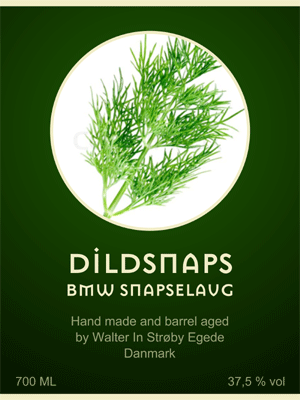
Top shot dill schnapps Procedure without liability The many times I have been to Sweden for fish parties and crayfish feasts, there have been huge amounts of dill in all forms; and no crayfish without a dill schnapps. Hence this very easy recipe for a dill schnapps. Buy two pots of organic dill and cut the top into small pieces. Put the tops in the glass, pour a bottle of vodka over. Set the glass warm, dark and dry for 2 to 4 days. Try tasting the schnapps every 24 hours to judge the taste. If there is a good dill taste, add the yellow lemon peels and let it soak for another 24 hours. Once the perfect taste has been achieved, the schnapps is filtered through a Swissgold gold filter into a new clean bottle, so no taste is lost in paper. The schnapps can be drunk immediately and does not gain much when stored, on the contrary, the taste will diminish over time if it is exposed to sunlight. The schnapps is enjoyed at room temperature along with a good old-fashioned marinated herring. Of course, it should also be drunk for boiled crayfish in a dill soup. 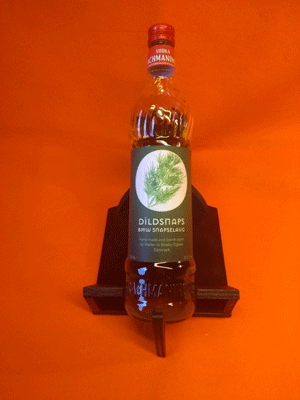
Dill schnapps I'm just going to tell you how the farmer stored his crown dill through the winter. He had the large 10 l white food bins, which he filled up and put in the freezer. He could do that because of the large freezer capacity that they have in the countryside. Tip: I took 3 to 4 stalks of dill umbels, they were vacuum sealed in my vacuum sealer and I had dill for next year's consumption in the freezer. Back to the page where you came from. |
|
No. 25 Ingredients for a good Blue Sapphire Gin ***
Danish version Next Down 700 ml Castelgy London Dry Gin 37.5Vol.% 5 g Juniper berries crushed, dried 2 g Licorice root, sliced 2 g Angelica root, sliced 4 g Java pepper or 2 g Black pepper and 2 g Allspice 1 g Coriander, dried 10 g Rod Cassia cinnamon, whole 2 g *Orris root, whole 12 pcs. Grains of Paridise or 2 g Cardamom seeds, dried 12 pcs. 1/4 Lemon peel, organic, only the yellow Soaking time 1 week The amount of herbs can be adjusted. *I could not find Orrisrod in DK Read online about Iris Palida Accessories: 1 liter glass with lid The peel of the lemon is cut off finely so that none of the white comes with it. The peel is lightly chopped.
After 1 week, taste the Gin. Judge for yourself whether it should brew more. Juniper must carry the taste of Gin, it is a condition to call it GIN. Another condition is that the alcohol strength is at least 37.5%. The other herbs should just give you little favorite notes for the whole in Gin. The name suggests that the Gin should be blue, maybe I should try it next time. Gin was made in Holland in the 17th century from malted grain mesh and was called Genever, which was originally supposed to be a medicine for kidney disorders. Today, Holland has two kinds of Genever - Oude (old, straw colored) and Junge (young, light and clear) Genever. Several Geneva matures in oak barrels for 3 years. The English took over Gin production when they came into conflict with France and stopped the import of Cognac. 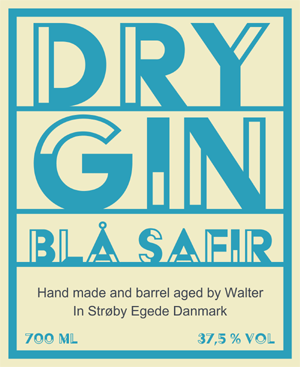
Blue Sapphire Gin The cheap Gin from Lidl just got a "spice" and became mild, round and with many notes of the added herbs. The fruit of the juniper - Juniperus communis - is actually not a berry but an cone. The first year they are green, the second year they are dark blue. Only the dark blue cones are used, the green ones have a strong turpentine-like taste. The cones are harvested in September and allowed to air dry for a few days. Gently pound them in a mortar without crushing them and pour them into a bottle. Pour on neutral alcohol so that it covers and let the bottle stand for a week. Check regularly after each day if it is necessary to pour more alcohol on, as the cones absorb the alcohol. Fill again to cover the cones. When the week has passed, strain the mixture through a Swissgold gold filter, do not filter with a coffee filter, aesthetic oils settle in the paper. Let the essence stand for a month so that it clears and a precipitate forms. Gently decant the essence into a beautiful bottle and mix with vodka for a pleasant taste. It reminds of Gin. It's Gin. 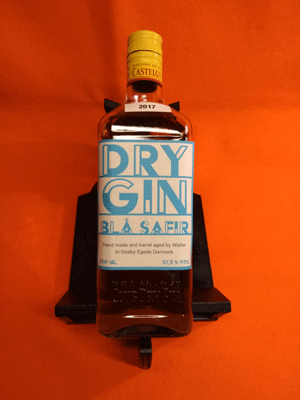
Blue Sapphire Gin Procedure without liability It is a bit of a rate to make your own Gin, because the taste and color will probably be different when you do not use the steam infusion method. Gin production takes place in 3 different ways: 1. Cold compounding: Cold blend of a very strong alcohol and herbs also called "Bath Gin". You get an essence that is filtered and mixed with a neutral alcohol, which eventually has a strength of at least 37.5%. It is the cheapest way to produce gin and the only legal way to make gin in private. 2. Distilled Gin: This is the method by which most Gin is produced. The desired herbs are added to alcohol, in which they soak for a few days, after which the alcohol is redistilled. The method is slightly more expensive than method 1. Beefeater Gin is made this way. 3. Steam infusion: This is the method, with two or more consecutive distillations of a high concentrate of alcohol. With the "Steam infusion" method, the herbs do not touch the alcohol, but are hung in baskets over the alcohol distillate in the outlet funnel on the distillation apparatus, which is a Pot distiller. The alcohol strength is adjusted with water after distillation. It is an expensive method of making Gin. Hendrick, Blue Sapphire and Tangueray Gin are made this way. So it's easy to see what I'm up to: "Bathtub" Gin. But it must be tried. The price of Gin determines the method by which it is made. 1 the very cheap Gin. 2 supermarkets Gin, Gordon and Beefeater. 3 the finer Gin, Hendrick, Blue Sapphire and Tangueray. Put all the spices in the glass and pour a Castelgy London Dry Gin over - (It was on offer in Lidl for DKK 59.95). You can also try Rachmaninoff Vodka - (It was on offer in Lidl for DKK 49.95) Set the glass warm, dark and dry for 1 week. Once the right flavor is obtained, the schnapps is filtered through a Swissgold gold filter into a new clean bottle, so no flavor is lost in paper. It's an attempt and the result comes here. The experiment ended satisfactorily, the Gin tasted good, was mild, round and had many notes of herbs. But I could not get the "colorless" that a purchased Gin is. Initial filtration as described above, but it was necessary to filter through a coffee filter to get it completely clear - ended with a light brownish-yellow color. In order for the drink to be called GIN, it is a condition that it is made on juniper, and that the alcohol strength is at min. 37.5%. Then the manufacturers can add its own flavors in the form of fruits, seeds, herbs and roots. Some of the most commonly used spices are seen here: Coriander, Java pepper, Grain of Paradise, Allspice, Angelica root, Licorice root, Orris root (Iris Pallida), Cassia cinnamon, Cardamom seeds, Chinese bark = (Quinine), Quinine pure, Wormwood, Rose petals, Blue Lotus flower, Chamomile flower, Elderflower, Violet flower, Saffron, Laurel leaves, Ginger, Vanilla, Grapefruit, Orange, Lemon, Lime, Black currant and Cucumber. Should you know of more, I would love to hear from you. Back to the page where you came from. |
|
No. 26 Ingredients for a good breakfast schnapps **
Danish version Next Down 700 ml Rachmaninoff Vodka 37.5Vol.% 1 Orange, organic, only the yellow peel ½ Lemon, organic, only the yellow peel 1 g Star anise, crushed 5 g Licorice root, sliced 5 g Galangal root, Alpinia officinarum, sliced 1 stick Vanilla Bourbon, cut 1.5 g Lemon balm, dried 10 pcs. Peppercorns, black 3 g Kinabark 0.25 g Safran ½ pk. 5 g Muscovado cane sugar, dark Soaking time 2 weeks for herbs and 1 week for citrus fruits and sugar Accessories: 2 pcs. 1 liter glass with lid The peel of orange and lemon is finely chopped off, so that very little of the white comes with it. Feel free to use a couple of boats of each in the vodka. Twice as many orange boats as lemon boats.
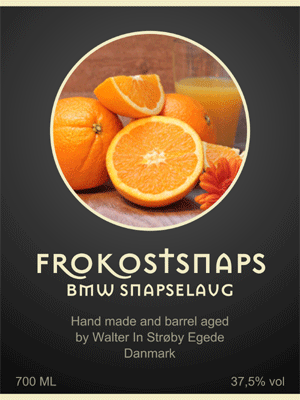
Breakfast Schnapps Procedure without liability This lunch schnapps I let brew separately in two glasses. That's because I want to control the citrus flavor by adding more or less in the final phase. Divide the vodka in 2 and use half on each extract. Alternatively, make a whole bottle of vodka of 2 to 3 oranges and 1 lemon so you get a powerful essence. It can later always be used for many other spice schnapps. But then do not add sugar. Put the herbs in the glass and pour the vodka over. Decide for yourself whether there should be sugar in now or later. Set the glass warm, dark and dry for 2 weeks. Once the right taste is achieved, the schnapps is filtered through a Swissgold gold filter into a new clean bottle, so no taste is lost in paper. The breakfast schnapps is flavored with citrus vodka (possibly sugar). This lunch schnapps is powerful because the brewing time is long, so there may be schnapps drinkers who want to dilute it with extra vodka. So just do it. It gains even more when stored for a few months. 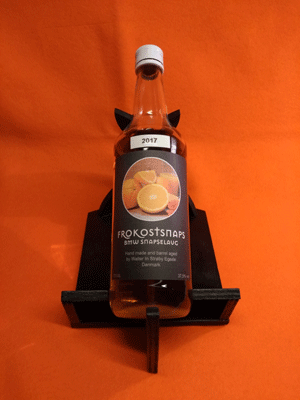
Breakfast Schnapps Then both glasses are filtered and I have tasted both extracts. I made an essence. They are mixed in proportion 3 parts herbs and 1 part citrus fruits. It gives a fresh taste of orange, lemon and many notes of the other spices. The 5 grams of muscovado cane sugar is just right, it is equivalent to 7 grams per liter. Back to the page where you came from. |
|
No. 27 Ingredients for a good Goodnight Dram *
Danish version Next Down 700 ml Rachmaninoff Vodka 37.5Vol.% 10 g Valerian root, cut 5 g Passion flower, dried 3 g Damia leaves, dried 2 g Hops, dried 2 g Mead herb, dried 2 g Oregano / Spanish hops, dried 2 g Lemongrass, dried 3 g Lemon balm, dried 3 g St. John's wort, dried 3 g Yarrowa - Achillea, dried Option: 5 g Cane sugar or Heather honey Soaking time 2 weeks Accessories: 1 liter glass with lid 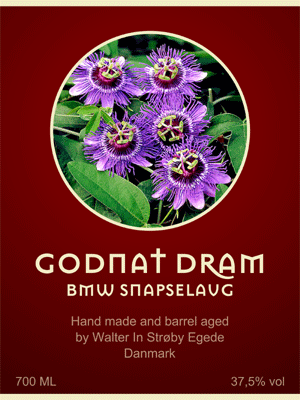
Good night Dram with passion flower Procedure without liability Valerian root has been known in Denmark for many years as a natural remedy used for insomnia. Extracts of valerian root - both in tea and in schnapps - are not toxic, but you have to be careful with excessive amounts if you have to drive a car or work with machines, it has a relaxing and sleep-inducing effect. That's why my dram is also called "Goodnight Dram".
Valerian root is mixed with the other herbs, which are also known for its soothing and relaxing effects, and will give a good taste in the schnapps. Pour on a bottle of vodka and set the glass warm, dark and dry for 2 weeks. Once the right taste is obtained, the schnapps is filtered through a Swissgold gold filter into a new clean bottle, so no taste is lost in paper. 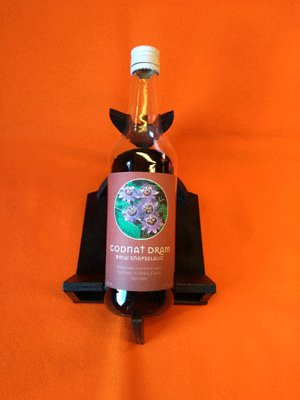
Good night Dram with passion flower Option: If you think this dram just needs to be rounded up, add a little sugar or heather honey. Just be aware that honey gives a blurry tinge to the schnapps, but it is livable. Please note: Honestly, I am not satisfied with the taste of this Godnat Dram, so only * star. I will try to see if I can do something about the taste. Will return if successful. I have bought a spice - Wild Herb Tea Good Night - from T.I. Spices. It contains more than 25 different herbs. Have now made a mixture which stands and draws. Then I have to taste it in a few months - mid 2024. Back to the page where you came from. |
|
No. 28 Ingredients for a Good Beach Wormwood Bitter ****
Danish version Next Down 700 ml Rachmaninoff Vodka 37.5Vol.% 10 g Beach Wormwood, fresh top stems or 10 to 20 g Beach Wormwood, dried Soaking time 36 to 48 hours at room temperature Accessories: 1 liter glass with lid Probably the most famous herb for a bjesk and the easiest to make. Only 2 ingredients are used and a few hours. It is important to taste after 24 hours and then still every 12 hours. The glass should be warm, then it will go faster. Ready to drink after a few weeks.
I have changed the recipe a bit. Uses fresh top stalks, brewing time 48 hours. Filtered through my Swissgold gold filter. Store for 2 months. Then decant with my Decanting apparatus with electric pump. Got one more *. Is suitable for the Christmas table with beer, smoked eel and marinated herring. 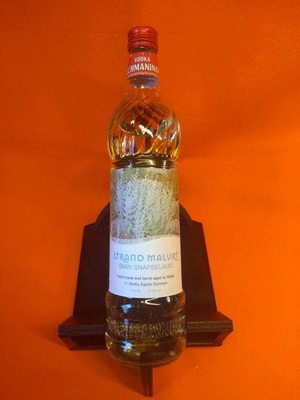
Beach Wormwood Bitter Procedure without liability When buying wormwood, you must be aware that there are 3 types of wormwood: Garden wormwood (Artemisia absinthium) which is the most common wormwood in the garden, Beach wormwood (Artemisia maritima) which is widespread along the west coast of Jutland, where it grows together with mare straw, beach cabbage and yellow snipe, Roman wormwood (Artemisia Pontica) used to make absinthe. I have only used the first 2 and here Beach wormwood is absolutely preferable. It is more "soft" in taste and much more aromatic. Disadvantages are that it is expensive to buy dried, but next year we will collect it ourselves in June/July/August and then dry some bundles for the coming of winter. There are also gray buckthorn (Artemisia vulgaris), which belong to the same family and give a strong bitter taste in the schnapps. I also mean that they call it "Poor Man's Pepper", but ask Jørgen Skouboe from 'Nak & Æd', I think they gathered gray buckthorn for their dishes. 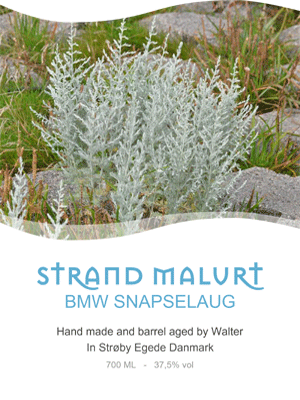
The plant Beach Wormwood grows here on a beach dike Use garden wormwood for the schnapps with many herbs to give a bitter taste, but use beach wormwood for a "Solo" bjesk. When I find Roman wormwood, I have to come up with a rating of the herb. Back to the page where you came from. |
|
No. 29 Ingredients for good recipes from Hirtshals
Danish version Next Down Bjesk recipes from Hirtshals Museum, made from my essences, mixed and diluted with approx. 600 ml vodka 37.5Vol.% There can be a difference in the taste of essences, so therefore the measurements are only a guideline. After 2 weeks they are tasted and the measurements are adjusted. All Bjesk deserve 3 to 4 stars, but judge for yourself.
29 A Hirtshals Bjesk 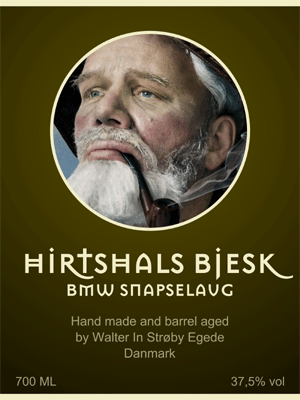
Hirtshals Bjesk Bjesk is tasted and 15 cl is very fine 3 cl Pors essens 3 cl Yarrowa - Achillea essens 3 cl Juniper essence 3 cl St. John's wort essence 3 cl Potentilla essence Remove 15 cl from a bottle of vodka and mix in the essences. Shake the bottle well and let it mature for at least 2 weeks. 29 B Museums Bjesk 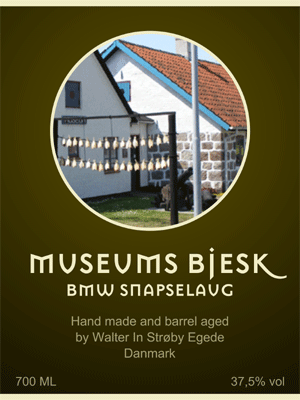
Museums Bjesk Bjesk is tasted and 10 cl is very fine 1 cl Pors essens 6 cl Potentilla essens 3 cl Wild Thyme essence Remove 10 cl from a bottle of vodka and mix in the essences. Shake the bottle well and let it mature for at least 2 weeks. 29 C Vendsyssel Bjesk 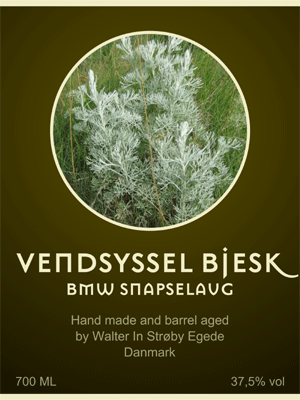
Vendsyssel Bjesk Bjesk is tasted and 10 cl is very fine 4 cl Pors essens 4 cl Juniper essence 2 cl Beach wormwood essence Remove 10 cl from a bottle of vodka and mix in the essences. Shake the bottle well and let it mature for at least 2 weeks. 29 D Dune Bjesk 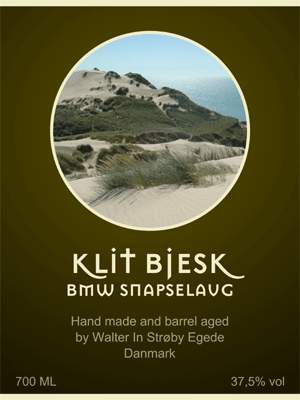
Dune Bjesk Bjesk is tasted and 10 cl is very fine 4 cl Pors essens 3 cl Yarrowa - Achillea essens 3 cl St. John's wort essence Remove 10 cl from a bottle of vodka and mix the essences in. Shake the bottle well and let it mature for at least 2 weeks. 29 E Chræn Mans Bjesk 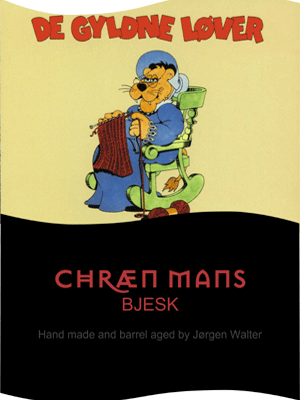
Chræn Mans Bjesk Bjesk is tasted and 9 cl is very fine 3 cl Beach wormwood essence 2 cl Ginger essence 3 cl Nutmeg essence 1 cl Cloves essence Remove 9 cl from a bottle of vodka and mix the essences in. Shake the bottle well and let it mature for at least 2 weeks. 29 F Mose Konens Bjesk 
Mose Konens Bjesk Bjesk is tasted and 15 cl is very fine 3 cl Blackthorm essence 3 cl Tansy essence 3 cl Yarrow - Achillea essence 3 cl Pors essens 3 cl Rum dark Remove 15 cl from a bottle of vodka and mix in the essences. Shake the bottle well and let it mature for at least 2 weeks. 29 G Spices Havens Bjesk 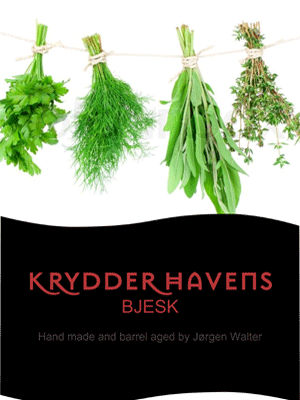
Spices Havens Bjesk Bjesk is tasted and 10 cl is very fine 2 cl Sage Essence 2 cl Wild thyme essence 2 cl Peppermint essence 2 cl Dill essence 2 cl Hops essence Remove 10 cl from a bottle of vodka and mix in the essences. Shake the bottle well and let it mature for at least 2 weeks. 29 H Chili pepper Bjesk 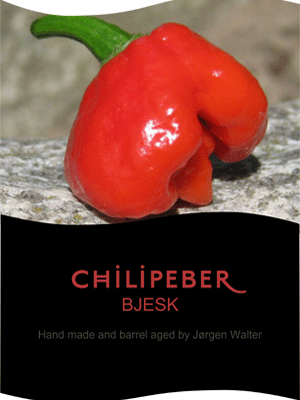
Chili pepper Bjesk Bjesk is tasted and 9 cl is very fine 1 cl Chili pepper essence 2 cl Lemon essence 4 cl Orange essence 2 cl Anise essens 1 to 2 tsp. Heather honey Remove 9 cl from a bottle of vodka and mix in the essences. Shake the bottle well and let it mature for at least 2 weeks. Back to the page where you came from. |
|
29 I Ingredients for sun eggs ****
Danish version Next Down I want to come up with a recipe for Sun Egg, which is an excellent snack for a good bite and a good, glass of beer
8 pcs. Eggs, fresh 2 pcs. Onions, only the outer yellow onion scales or 1 tbsp. Turmeric 1 piece. Red chili pepper 1 L Water 260 g Salt Brine: approx. 20% and 16° Baumé Open the Brine Excel spreadsheet in a new window If you want red eggs: 1 Beetroot large, peeled slices or 1/4 Red cabbage finely chopped Serving: Olive oil White wine vinegar Dijon mustard HP Sauce English sauce Tomato ketchup Tabasco Choose for yourself what and how much of the above you want to use. 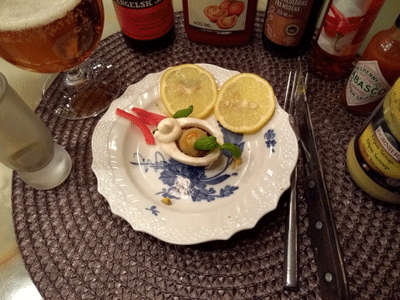
Sun eggs in onion peels as a snack Procedure without liability Sun eggs is a Sønderjysk regional dish that you used when you had to cure a hangover, or just enjoy a snack with a dram and a glass of beer. You can make sun eggs in several "funny" ways, you can add different colors and patterns by using root vegetables / cabbage and cracking the shell in different ways. Boil water with salt and the cleaned root vegetables (onion peel, chili peppers, sliced beets or sliced red cabbage), cool the brine. Boil the eggs for 20 minutes over medium heat, cool them in cold water. Roll an egg on the kitchen table and gently crack the shell with the palm of your hand, it will give different patterns on the egg white when it has been in the brine for at least a week. If the shell is removed before the eggs enter the red brine, the whole white turns red. Choose what color you want on your eggs. Yellow: onion scales or turmeric. Red: beetroot or red cabbage. Put the hard-boiled eggs in a decoction glass and add the filtered brine so that it covers all the eggs. All eggs MUST be under the brine, use a small plate if necessary, the eggs sink to the bottom after a few days in the brine. The eggs must mature a week before they are eaten. The brine is a strong brine, so the shelf life in the refrigerator is approx. 3 weeks. 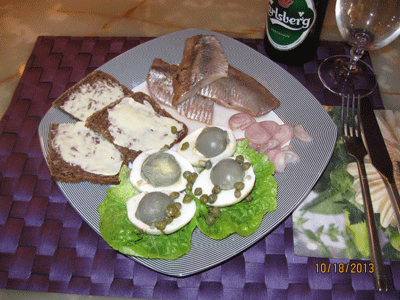
Sun eggs for a lunch of homemade marinated white herring Once the eggs have been in the brine for a few weeks, the yolk gradually turns black. It is normal and has no effect on health. It is called a "Sørgerand" = "Mourning Edge" and occurs because iron sulphide is formed - FeS - the iron (Fe) comes from the yolk and the sulfur (S) comes from the white. It also occurs if the egg is boiled for too long. Serving: Cut the egg lengthwise, take out half the plum, and season with the spices mentioned in that order. Place the plum with the cutting surface facing down. Back to the page where you came from. |
|
29 J I make my essences like this
Danish version Next Down In a 250 ml bottle with a screw cap I put 20 g roots / bark / hard seeds, 10 g plants / flowers / soft seeds or 5 g of some strong / bitter plants, such as wormwood / horseradish. Saffron essence is made on 1 g. Vanilla essence is made on 4 sticks. The bottle is filled with vodka and left to cool, dark and dry for a few weeks. All roots / bark draw for (at least) 4 weeks, plants / flowers / seeds pull for (at least) 2 weeks, garden wormwood draw for 2 days / beach wormwood draw for 4 days / gray buckthorn draw for 4 days warm, dark and dry. The mixture is then passed through a Swissgold gold filter into a new, clean bottle. If a sediment forms, you can either decant the essence or filter it through a coffee filter to get it completely clear. My porse essence is now ready and I want to make a bjesk according to the above recipes. Do yourself the favor of making the essences crystal clear, it saves later work with filtration / decanting.
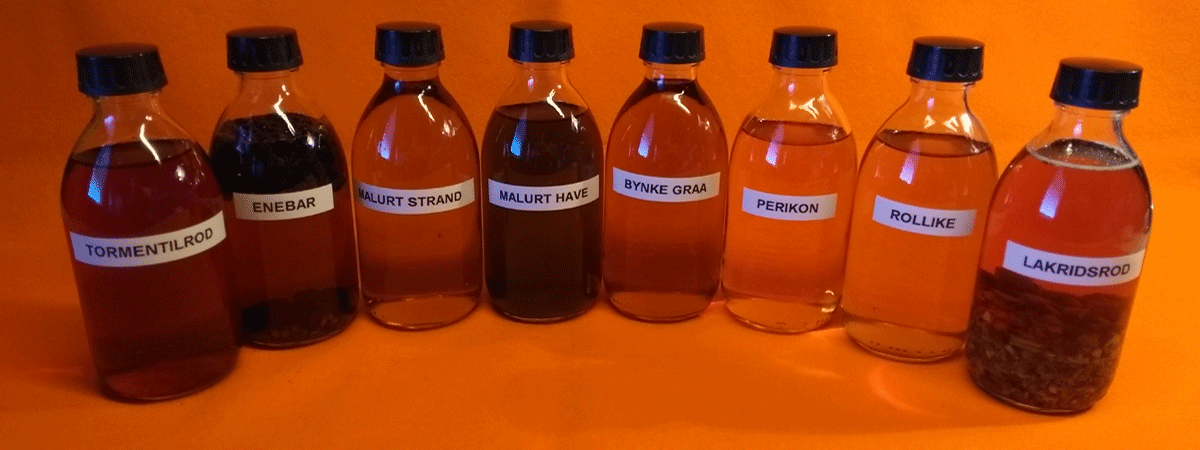
Some of my 91 essences. Juniper and licorice root are still drawing. Æ, Ø and Å are not available on my label printer. 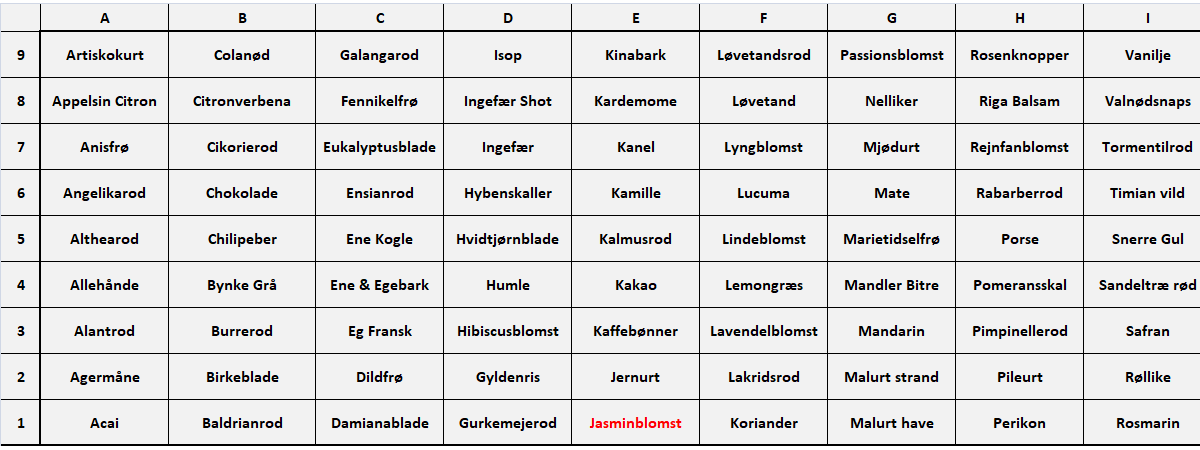
List of my essences in stock. Jasmine flower essence with red writing I can not find. Have found it now. Back to the page where you came from. |
|
No. 30 Ingredients for a good Pors Schnapps *****
Danish version Next Down 700 ml Rachmaninoff Vodka 37.5Vol.% 20 g Pors catkin (flowers), picked early spring or 20 g Pors leaves, picked summer and autumn 6 cl Sherry, Choose your own Sherry 1 small twig of rosemary 2 g Licorice root 2 g Oak, dried 2.5 g sugar / heather honey. See tips Soaking time for leaves at room temperature 2 to 4 weeks Soaking time for catkin (flowers) at room temperature 4 to 8 weeks Taste the extract regularly and finish when you seem to have hit your personal taste. Accessories: 1 liter glass with lid Tips: If you want a "pure" pors schnapps without sherry, rosemary, licorice root and oak, you should (maybe) add 1 tsp. sugar or 1 tsp. heather honey, which gives the schnapps a round taste. An alternative to Sherry could be Vermouth - sweet or dry.
Pors Schnapps gets better and better after a few months of aged. 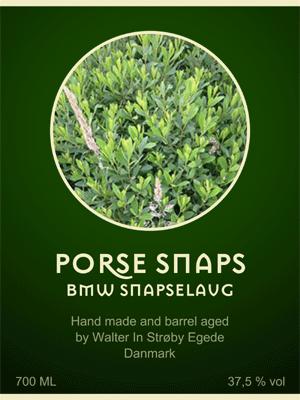
Pors Snaps made from herbs. See the recipe above. Procedure without liability Pors schnapps are not only made on pors, but are added with a few other spices. Aalborg Pors schnapps 40% was launched in 1965, which I knew and was frequently used for fried eels, was added sherry, rosemary by infusion and caramel (maybe licorice root and honey)? After De Danske Spritfabrikker founded in 1881 passed to other hands (Swedish Wine and Spirits 1999 - Pernod Ricard 2008 - Norsk Arcus 2012 - Finnish Altia), the recipe has changed. Now oak has been added, or stored in oak barrels? Thylandia Pors schnapps 42% are only made on fresh porse leaves. I have not tasted it yet. Braunstein also makes a Pors schnapps 38% no idea what it's made of. Pick your fresh pors spices and put it in the glass along with the other herbs. Pour on your favorite vodka and set the glass warm, dark and dry for the next 4 weeks to 8 weeks. When the brewing time has elapsed, the bottle is taken out and the coarse contents are first sieved in a metal sieve, then the schnapps can be filtered through a coffee filter and placed in a clean bottle. 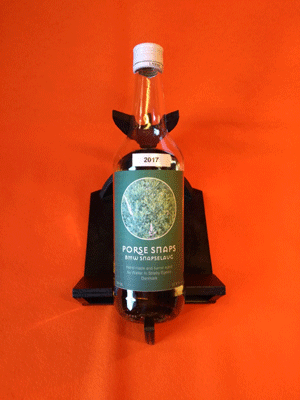
1 bottle of Pors Snaps made with essence: 9 cl Pors, 3 cl Sherry, ½ cl Rosemary, ½ cl Licorice root, ½ cl Oak and Vodka for the rest A Pors schnapps made according to this recipe will only get better after aged for a few months. The color will also darken with time (do not stand in sunlight). Taste the extract regularly and finish when you seem to have hit your personal taste. NB: Smoked oak is available in light, medium and strong smoked. Can be bought where you buy accessories for beer brewing. I used a heavy smoked oak. You can buy oak chips, french heavy roasted here or here. American oak chips can be bought here. If you can no longer get oak with a smoke flavor, you must smoke it yourself. Back to the page where you came from. |
|
No. 31 Ingredients for a good Christmas Bjesk - Essence ***
Danish version Next Down 700 ml Vodka 37.5Vol.% 5 g * Angostura bark Orange peel of 2 organic, only the yellow Lemon peel of ½ organic, only the yellow 2 g Galangal root, Alpinia officinarum 1 g Ginger 5 g Coffee beans 3 g Cinnamon whole 5 pieces. Cardamom seeds whole 4 g China bark, Cinchona 5 g Licorice root 3 g Nutmeg, ½ nut 10 pcs. Carnations whole 4 g Sandalwood 2 g ** Beach wormwood 1 piece. Vanilla It is difficult to buy * Angostura bark, then try with 2 g oak bark and 2 g gentiana root. ** Beach wormwood is added for the last 3 to 4 days.
Soaking time 4 weeks at room temperature. Should be diluted as desired. Accessories: 1 liter glass with lid. 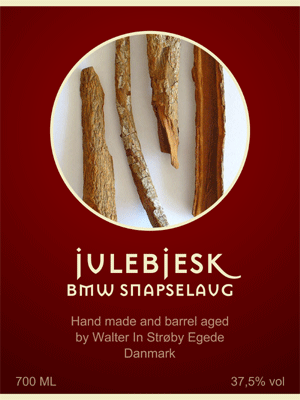
Christmas Bjesk Procedure without liability This Christmas Bjesk is made to be diluted - a kind of essence - and to be added to other "Bjesker" as desired. Put all the dried herbs in the glass (except the beach wormwood) and divide the orange and lemon peels, which come on top. It helps keep the herbs under the vodka. Put a bottle of vodka on so that it covers and set the glass warm, dark and dry for 3 weeks. Taste the Christmas Bjesk and if it is satisfactory, add beach wormwood and let it mature for another 3 to 4 days. If you only have garden wormwood, you may only need to let it mature for 1 to 2 days. When the right taste has been achieved, the Christmas Bjesk is filtered through a Swissgold gold filter into a new clean bottle. You can then let the bottle stand and settle for a few weeks and then decant it. If you can't wait, filter the Christmas Bjesk through a coffee filter. But remember citrus fruits tend to give a blurred "bjesk". When the Christmas Bjesk is ready, it can be used to add other "Bjesker" or drunk independently, if diluted with an appropriate amount of vodka. Try it out. 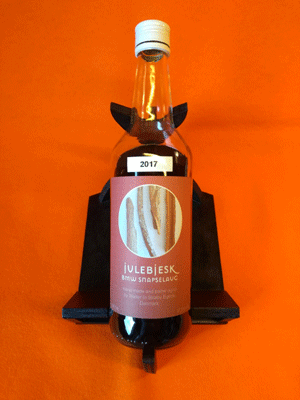
Christmas Bjesk The first bjesk that I want to try the Christmas Bjesk in, is "Ugly Krumpen" below. "Ugly Krumpen" was a gentleman who lived a free and cheerful life in a hurry with several mistresses. There was just the "Chin" of it that these mistresses were married ladies. He also ended up in jail for a few years. The myths about "Ugly Krumpen" (Stygge Krumpen) are many, read them yourself. Back to the page where you came from. |
|
No. 32 Ingredients for a good "Ugly Krumpen" Bjesk (Stygge Krumpen) ***
Danish version Next Down 700 ml Vodka 37.5Vol.% 3 cl Galium verum essence, see bjæsk 3 cl Christmas Bjesk, see above 3 cl Bitter orange essence 3 cl Pors essens 3 cl Safran essence 2 cl Beack wormwood essence 3 cl Potentilla essence Soaking time 2 weeks at room temperature. Accessories: Measuring glass of 250 ml 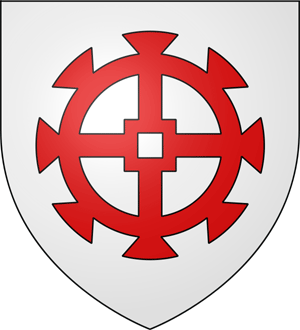
Ugly Krumpen's Coat of Arms: The mill wheel Procedure without liability This bjesk is very easy to make once all the essences are made. Pour 250 ml of vodka from a bottle into a measuring cup. Store the vodka in a bottle for later use - new essences?
Measure out all the above essences (230 ml in total) and put them in the bottle with your favorite vodka. Shake the bottle to mix the essences. Put the bottle away for a few weeks warm, dark and dry. Wait for all the ingredients to mix into a homogeneous liquid. Enjoy. 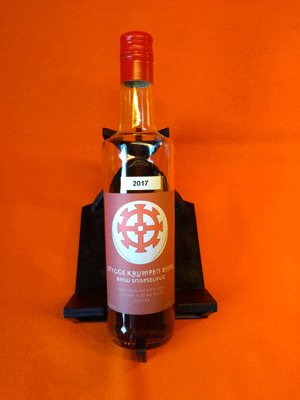
Ugly Krumpen Bjesk When the time comes for the first taste test, I will assess whether the Bjesken should be diluted with more vodka, or whether it is suitable according to the recipe. It is often the case that the herbs are more or less powerful in taste and aroma. Back to the page where you came from. |
|
No. 33 Ingredients for a good "BåjWåj" Bjesk from Hugo's recipe ***
Danish version Next Down 700 ml Vodka 37.5Vol.% 3 cl Galium verum essence, see bjæsk 3 cl >St. John's wort essence 3 cl Myrica essence 2 cl Riga Black Balsam 1½ cl Beach wormwood essence According to signe, it should mean "Bådvand = Boat water" in North Jutland. Bjesken was named bjesk of the year in 2017.
Soaking time 2 weeks at room temperature. Accessories: Measuring glass of 125 ml 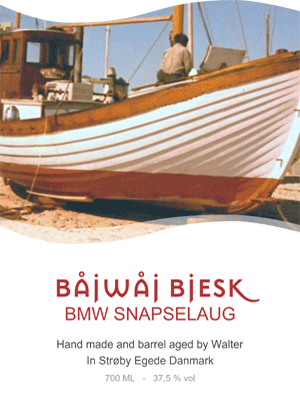
"BåjWåj" Bjesk from Hugo Procedure without liability This bjesk is very easy to make once all the essences are made. Pour 125 ml of vodka from a bottle into a measuring cup. Store the vodka in a bottle for later use - new essences? Measure out all the above essences (125 ml in total) and put them in the bottle with your favorite vodka. Shake the bottle to mix the essences. Put the bottle away for a few weeks warm, dark and dry. Wait for all the ingredients to mix into a homogeneous liquid. Enjoy. 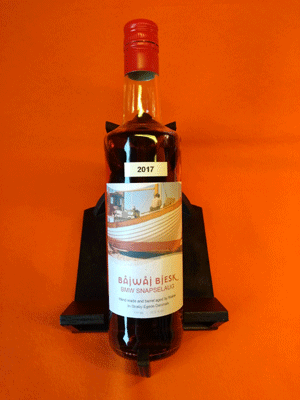
"BåjWåj" Bjesk from Hugo When the time comes for the first taste test, I will assess whether the Bjesken should be diluted with more vodka, or whether it is suitable according to the recipe. It is often the case that the herbs are more or less powerful in taste and aroma. I have tasted the Bjesk and there is no need to do more with it. Just leave it to mature for a few more weeks. Back to the page where you came from. |
|
No. 34 Ingredients for a good Anxiety & Restlessness Bitter 2018 ***
Danish version Next Down 700 ml Absolut Vodka 40Vol.% 1 g Allspice whole, crushed 1 g Anise seeds whole, crushed 5 g Orange peel, dried 5 g Catechu, astringent Acacia Catechu 5 g Gentiana root, sliced 2 g Turmeric root dried, sliced ?? 1 g Hibiscus flower 2 g Ginger dried, sliced 3 g Cinnamon whole, crushed 2 g Cardamom seeds, crushed 3 g Chinese bark, cut 1 g Cumin seeds, crushed 1 g Coriander seeds, crushed 1 g Cloves whole, crushed 5 g Licorice root, whole cut 2 g Garden Wormwood, dried 1 g Maté, dried 1 g Nutmeg, dried 3 g Nutmeg whole, crushed 5 g Dandelion root, sliced 6 pieces. Pure licorice in small brides 3 g Sandalwood red, cut 5 g * Angostura bark 2 g ** Canada wild ginger, sliced?? 2 g ** Virginia snake root, cut 10 g *** Heather honey Soaking time 4 weeks at room temperature. Accessories: 1 liter glass with lid. Bottle with Drop Counter. It must become a powerful tasting essence, as it is only used drop by drop in drinks, otherwise you will hear: The "Scream" 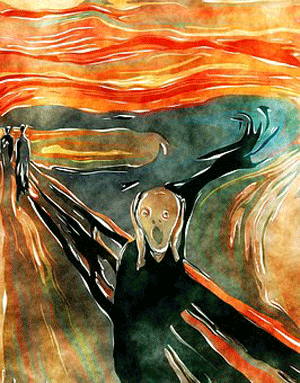
Anxiety & Restlessness Bitter 2018 The "Scream" Procedure without liability This Anxiety & Restlessness Bitter 2018 is used drop by drop in other alcohols, such as Akvavit and Vodka as well as in Drinks. An Absolut Vodka 40% vol is used here. However, if you can get a vodka at several percent, and want to sacrifice the money on this, then just do it.
Just omit ** Canada wild ginger and ** Virginia snake root. You may want to use a little more dried ginger and turmeric root. Instead of 5 grams * Angostura bark, 2.5 grams of oak bark and 2.5 grams of galanga root are used. Angostura trifoliata is a medicinal plant native to South America. Its bark is usually misunderstood, which was used in Angostura brand bitters, named after the city Angostura in Venezuela. However, Angostura bark is used in a number of other aromatic bitters, such as Abbott's Bitters. It will be difficult to obtain these herbs. Angostura bark must not be sold in the EU. Canada wild ginger. Virginia snake root is a totally protected plant. *** Heather honey is added as desired, but 10 g to 700 ml of vodka is appropriate. The herbs are comminuted and mature into alcohol, filtered through canvas, sand, and sweetened with heather honey. It is the official procedure for several thousand liter production. But first use a Swissgold gold filter and then a coffee filter for the small production of 700 ml. After filtration, the bitter matures cold, dark and dry for several months. If there is a sediment in the bottle, the bitter is decanted into a new clean bottle. I have made a Decanter with electric pump and it works perfectly. Maybe more vodka needs to be refilled after filtration. Can you find small bottles with drop spouts, then fill some of these. Anxiety & Restlessness Bitter 2018 is now ready for use. 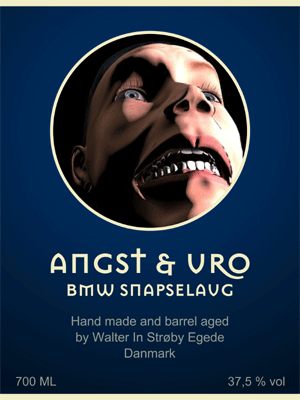
Anxiety & Restlessness Bitter 2018 Note: I could not obtain Catechu, astringent Acacia Catechu. See Astringent. Try biting into a beaten berry and you will get the feeling of "Astringent". Squeezes the mouth together. You could possibly add 10 pcs. sloe, or 1 pc. cut organically quince kvæde with peel. I have not done that and it was not necessary. Back to the page where you came from. |
|
No. 35 Ingredients for a good Wunderberg Bitter ***
Danish version Next Down 700 ml Absolut Vodka 40Vol.% 5 g Alantrod Inula helenium, cut 1 g Allspice whole, crushed 5 g Angelica 2 g Anise seeds, crushed 5 g Organic lemon peel only the yellow 5 g Croton eluteria, Cascarilla bark This bark is used in Campari and Vermouth Tastes a bit of vanilla, citrus and oak bark 5 g Gentiana, cut 2 g Fennel seeds, crushed 5 g Rose hip shells, dried 5 g Chinese Bark, cut, (Quinine) 6 g Chinese Cinnamon whole, crushed 1 g Cloves whole 10 g Licorice root, sliced 1 g Heather flower, dried 3 pieces. Almonds bitter, sliced 10 g Almonds sweet, sliced 10 g Nuts, sliced 10 g Orange Peel, dried 3 g Peppercorns black whole, crushed 30 g Rowanberries, fresh from frost 2 g Sandalwood 3 pieces. Star anise, whole 2 g Beach Wormwood, dried 1/4 Vanilla bean The famous Underberg Bitter is composed of various herbs from 43 countries around the world, even from Scandinavia - maybe Denmark, Rowanberries from Stevns? Here are a few herbs that give a good taste to a Wunderberg Bitter. Maybe a little heather-honey? So the women can join. Two new Underbergs have been launched in Denmark. Greenberg with honey for women. Brasilberg in large bottles for men.
Soaking time 4 to 8 weeks at room temperature. Accessories: 1 liter glass with lid. 
Underberg Bitter Procedure without liability Everyone knows Underberg Bitter, and it's an attempt to make a bitter that tastes like the original bitter. In the original Underberg Bitter there are herbs from 43 different countries. Then, by nature, there must be at least 43 different herbs. The alcohol strength is 44Vol.% and available in small 2 cl bottles. Here I use an Absolut Vodka 40Vol.% Try the recipe yourself and judge if you managed to make a "Wunderberg Bitter" that tastes good. A new Underberg Greenberg Bitter was launched in 2012 specifically for women. The alcohol percentage is reduced to 22Vol.% but the contents of the bottle are raised to 4 cl. Flower honey has been added (as well as other herbs with a not so bitter taste)? Another bitter from the same family is: Brasilberg Bitter at 42Vol.% in 100 cl bottles. It is a grandson of Underberg's founder, who settled in Brazil and made his own bitter of herbs and plants from the Amazon region. It is darker and sweeter, not so bitter, but an expensive bottle. Put all the herbs and fruits in the glass and pour a bottle of vodka over. The bottle is closed with a rubber gasket and placed in a pot of water. The water is slowly heated to a maximum of 40°C and no more. The pot should like to keep this temperature for approx. 4 hours, after which the boiling bottles are set at room temperature until the contents have taken this temperature. Now there is negative pressure in the decoction bottles. The bottles are kept warm, dark and dry for 4 to 8 weeks. Then the contents are first filtered coarsely, later through a coffee filter. 
Brasilberg Bitter The Wunderberg Bitter is poured into a new, clean bottle and left to cool, dark and dry for a few months, where it settles and matures. It can then be decanted into the permanent bottle from which it is served. I have made a Decanter with electric pump and it works perfectly. Note: I could not obtain Croton eluteria (Cascarilla) bark. Should maybe try adding a little Campari as this bark is part of Campari. Not too much, the bitter should reluctantly become too "thin". Back to the page where you came from. |
|
No. 36 Ingredients for a good "The Rich People's Balsam" ****
Danish version Next Down 2 x 700 ml Absolut Vodka 40Vol.% 10 g Orange peel, organically dried 5 g Valerian root, sliced ?? ½ Cup Birch buds 60 g Blueberries, fresh or frozen 60 g Blackberries, fresh or frozen 5 g Chicory root, sliced 5 g Oak bark, dried 20 g Hazelnuts, sliced 2 g Garden wormwood, dried 60 g Raspberries, fresh (frost) 10 g Ginger, dried 10 g Coffee beans, whole espresso 5 g Kalmusrod, cut 5 g Licorice root, sliced 1 Handful Lindeblomst, only the white 70 g Heather honey 6 g Nutmeg, whole but crushed 5 g Pepper black, crushed 5 g Peppermint, dried 60 g Prunus padus, Bird Cherry, Bird Cherries, Fresh or Frosted 5 g Bitter orange 1 g Arnica montana, Guldblomme = Gold flower, only the yellow flower. The plant is moderately toxic. Read the page first. I had no birch buds, so I used 10 cl Birkesnapse Liqueur No. 38
Accessories: 1 liter glass with lid. Riga Black Balsam is composed of 24 different herbs, berries and honey, here are 22 kinds out of the 24. Riga Balsam was first made in 1752 by pharmacies Kunze in Riga, the capital of Latvia. It is a bittersweet liqueur, which is made from many local herbs. 1st pull 4 weeks 2. pull 4 weeks at room temperature. The two features are mixed and filtered. 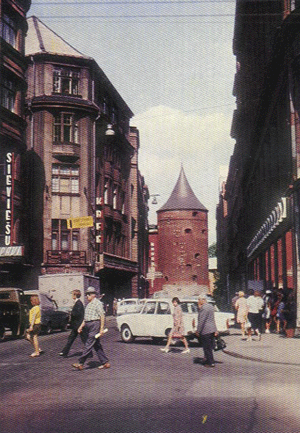
This is what the street scene looked like when I was in Riga in 1973 Valnu iela, a street in the old town of Riga Procedure without liability Not everyone knows Riga Black Balsam, but it is an attempt to make a Balsam that tastes like the original Riga Black Balsam. The recipe for the original Riga Balsam is secret and consists of 24 herbs, berries and honey. The alcohol strength is 45Vol.% Here I use an Absolute Vodka 40Vol.% Try the recipe yourself and judge if you managed to make "De Riges Balsam" = "The Rich People's Balsam" that tastes good.
My first acquaintance with Riga Black Balsam was in 1973, when I was part of a Danish trade delegation to Riga. In the absence of Old Danish, we drank Riga Balsam. Balsam is a term for a drug, and we were in favor of "Prevention" rather than "Cure". It worked. One place where Riga Balsam has made its way is in Marstal on Ærø with the sailors. The merchant ships from Marstal have Riga Balsam in the medicine cabinet. When I use a lot of herbs, honey and a long brewing time, I like to heat the mixture to create a vacuum. Put all the herbs and fruits in the glass and pour a bottle of vodka over. The bottle is closed with a rubber gasket and placed in a pot of water. The water is slowly heated to a maximum of 40°C and no more. The pot should like to keep this temperature for approx. 4 hours, after which the boiling bottles are set at room temperature until the contents have taken this temperature. Now there is negative pressure in the decoction bottles. The bottles are kept warm, dark and dry for 4 to 8 weeks. Then the contents are first filtered coarsely, later through a coffee filter. 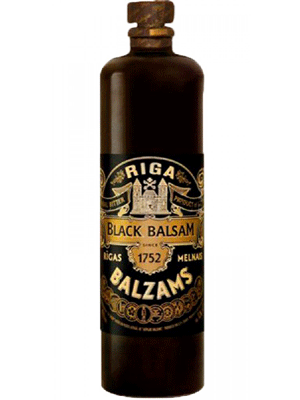
Riga Black Balsam in ceramic bottle Riga Black Balsam is poured into a new, clean bottle and left to cool, dark and dry for a few months, where it settles and matures. It can then be decanted into the permanent bottle from which it is served. I have made a Decanter with electric pump and it works perfectly. Original Riga Black Balsam is served from ceramic bottles. Back to the page where you came from. |
|
No. 37 Ingredients for a good Pirate Blackcurrant Rum ***
Danish version Next Down 700 ml Vodka 37.5Vol.% 500 g Blackcurrants fresh or frozen 30 g Heather honey Make a Spiced Rum 700 ml Vodka 37.5Vol.% ½ cl Allspice (2 pcs.) 1 tsp. Orange peel, sweet ½ cl Ginger (1 cm) ½ cl Coffee beans (4 pcs.) ½ cl Cinnamon (1 g) 2 cl Caramel (1 tbsp.) ½ cl Cardamom (3 pcs.) 2 pcs. Almonds bitter, sliced 1 tbsp. Almonds, flakes 10 g Molasses or Muscovado cane sugar ½ cl Cloves (3 pcs.) 1 tsp. Bitter orange peel ½ tsk. Pink peppercorns (6 pcs.) 1 cl Vanilla, or 1 stick vanilla, split Pirate Blackcurrant Rum is made in two glasses. In the first glass come blackcurrant, heather honey and vodka. If you make it from fresh black currants and can get hold of fresh green leaves, then add 10 to 20 pieces. Soaking time 4 weeks.
In glass number two, a "Spiced Rum" is made according to the above recipe. It should be noted that I have made it on my essences, therefore the measurements are in cl. The dimensions in ( ) indicate the quantity in pieces or grams for herbs. Soaking time 1 week. Accessories: 2 pcs. 1 liter glass with lid. Calculation of sugar and water in blackcurrants 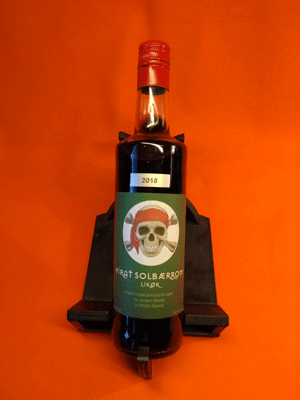
Pirate Blackcurrant Rum Procedure without liability Start with black currants as this blend takes the longest time. Pour the blackcurrants into the glass along with fresh leaves from the bush. Add heather honey and pour on vodka. Close the jar tightly with a rubber gasket and put it away - cool, dark and dry - let it mature for 4 weeks, after which it is first filtered coarsely, later through a coffee filter. One week before the blackcurrants are done, put the "Spiced Rum" over. Filter the mixture through a coffee filter and then mix "Blackcurrant" and "Rum" together in a large bottle (1.5 liters). Now there are two ways to use the blackcurrant leftovers: Squeeze them through my Squeeze Pistol, or make jam from them. Simply add more sugar and give a very short boil. Pour hot into jam jar and close immediately. Store cool, dark and dry. If you squeeze the blackcurrants, the juice comes up in the large bottle and is refilled so that the bottle is filled. Now the blackcurrant rum must mature and settle, so store it away for at least 4 months before decanting the bottle. I have made a Decanter with electric pump and it works perfectly. You pick blackcurrants in August and for Christmas you have the most beautiful Blackcurrant Rum. Just call it: "Pirate Blackcurrant Liqueur". I will return with more info on blackcurrant jam when that time comes. I bought 2 bags of frozen blackcurrants of 300 g in Rema 1000 for only DKK 10.00. Leaves can of course not be obtained in April. The blackcurrants had drawn so much vodka that I had to squeeze the berries to get some juice. Therefore no blackcurrant jam this time. Back to the page where you came from. |
|
No. 38 Ingredients for a good Birch schnapps Liqueur *****
Danish version Next Down 2 x 700 ml Vodka 37.5Vol.% 7.4 liters of birch juice, freshly tapped Tapped the first week of April from a birch tree with a diameter of at least 20 cm. A hole of 12 mm is drilled obliquely upwards approx. 10 cm into the trunk 2 m up. A nozzle item no. 364835 (see my press gun) and a hose is fitted. 4 to 5 liters of juice run in 3 to 4 days.
Accessories: An empty 5 liter vinegar can (cleaned). New white mouthpiece for silicone. 1 meter 12 mm silicone hose. 2 meters of string for attaching cans to the tree trunk. When the hole is to be closed, a branch is cut off the trunk and the branch is debarked, fitted to the hole and knocked in. I usually dab the spot with Atamon to prevent fungus. Some use tar to cover the hole after the branch is knocked in. 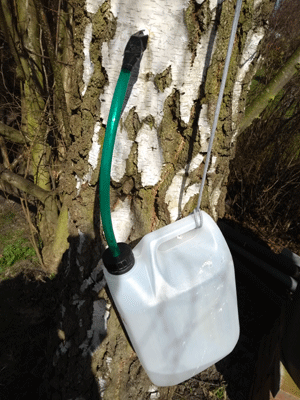
Drained from the tree on April 10, 2018 at my neighbor Bjarne Procedure without liability Raw birch juice can be used in several ways. For the production of wine and for the production of a good Birch schnapps Liqueur. If you want to make wine, search the web and find great recipes. Use my Excel spreadsheet "Sukkermåling Birk" to find the amount of sugar that needs to be added to obtain a suitable alcohol strength. Here I will describe how I made 2 bottles of 700 ml Birkesnapse Liqueur of 27Vol.% in 5 days. 7.4 liters of raw birch sap were tapped in 5 days and boiled for 6 hours to 430 ml = 435 g of concentrate = 1.012 g/ml. Reduction 7400/430 = 17.2 times. According to the "books", birch sap contains only 1% solids, whereas maple sap contains several % solids. Maple syrup is made from the sap from Sugar Maple. Find online how they tap sap in Canada from the tree for maple syrup. 40 liters of maple sap yields 1 US gallon of syrup or 3.8 liters. 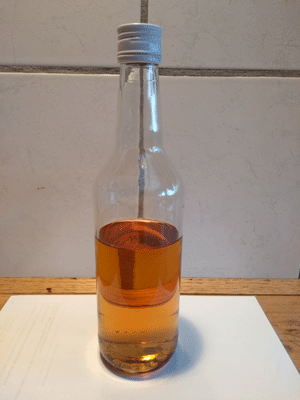
430 ml = 435 g concentrate of 7.4 l of birch juice The amount of concentrated birch sap in the bottle in the picture above is 430 ml. It tastes fantastic and is very sweet. Was mixed with vodka as follows: 215 ml concentrated birch sap in each bottle and topped up with 485 ml Vodka 37.5%. Birkesnapse Liqueur therefore had an alcohol percentage of 27Vol.% With this percentage, it can keep without being refrigerated. I would call the birch schnapps a "Liqueur" as it is still a little sweet. I will use one bottle as essence in other "Snapse", which must have a "Flavor" of birch. The other may need to be "diluted" a little more with another spirit. Using two bottles of Vodka, 700 ml and 40Vol.%, and 430 ml of concentrated birch sap, the total alcohol percentage becomes 30%. For other alcohol percentage values, use my Wine and Schnapps percentage Excel spreadsheet. Open the EXCEL spreadsheet in a new window. Only on a PC with an Excel spreadsheet. Back to the page where you came from. |
|
No. 39 Ingredients for a good Blackberry Liqueur ****
Danish version Next Down 700 ml Vodka 37.5Vol.% 620 g Blackberries wild 1 Vanilla bean split 2 to 4 tbsp. Heather honey 3 cl Licorice essence. See text Wild blackberries grow in Denmark in many places in fences, scrub, field boundaries and forest edges. They mature differently over a longer period of time. Usually from August to October.
Accessories: 1 liter glass with lid. Soaking time: 3 months at room temperature. I have found a method to handle a cloudy "schnapps" completely. I had a sloe schnapps that was very cloudy, put it in the freezer for 2 weeks, after which it was decanted and the rest (the sediment) was sieved through 2 coffee filters. It became quite clear at room temperature. Try it yourself. See also: Calculation of water and sugar in blackberries. 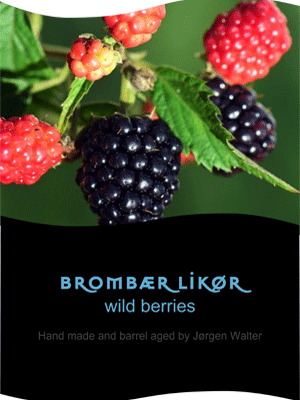
Ripe and unripe Blackberries 2018 Procedure without liability Everyone has probably noticed that the summer of 2018 was very special hot and long. It had my wild blackberries in the fence too. I picked the first 620g on July 21st. They were totally black and mature, but a little smaller than they were in 2017. As long as there are enough of them, it does not matter. I could pick blackberries until the end of September, but with a lot of competition from the birds. Put all blackberries in the bottle with a split vanilla bean and pour 2 to 4 tbsp. heather honey over. Then pour vodka on so it stands a few cm. from the top. Close the bottle and put it away for 3 months - it may need to be shaken along the way. I used only 2 tbsp. heather honey, which was too little. After 3 months, filter the mixture - first coarsely in a sieve - then finely in 2 coffee filters. This is when you taste the blackberry liqueur with more heather honey or with a licorice/moscovado cane sugar mixture: This consists of 200 ml vodka, 20 g pure licorice and 20 g moscovado cane sugar. I used 3 cl licorice essence and 1 tbsp. heather honey. 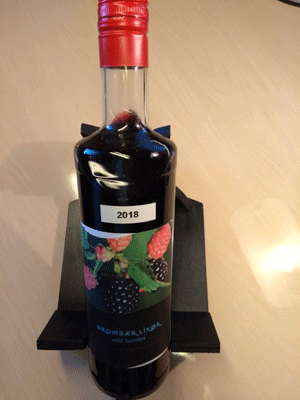
Blackberry Liqueur 2018 Set the blackberry liqueur to mature for at least a month. Then check for sediment. This sediment must be decanted off. I have made a Decanter with electric pump and it works perfectly. If the bottle is not completely full, you can calmly refill with vodka or a good rum. Let the bottle mature for Christmas, then you have a good blackberry liqueur for the coffee with cakes. Back to the page where you came from. |
|
No. 40 Ingredients for a good stomach bitter "Spices Garden Bjesk" **
Danish version Next Down 700 ml Vodka 37.5Vol.% 2 cl Artichoke essence 2 cl Dandelion essence 2 cl Dandelion root essence 1 cl Anise essens 1 cl Althearod essens 1 cl Hop hops 1 cl Lemon balm essence 1 cl Tarragon essence 1 cl Merian essens 1 cl Mint essence 1 cl Sage Essence 1 cl St. John's wort essence 1 cl Yarrowa - Achillea essens ½ cl *Rhubarb essence *Rhubarb tends to blur the schnapps Season with a little pure licorice and moscovado cane sugar as in the recipe above No. 39.
Accessories: 1 liter glass with lid. Maturation time: 1 month at room temperature on essences 2 months at room temperaturen on herbs 
Spices garden Bjesk 2018 Procedure without liability One could also call the recipe: "Garden Herbs" since many of these herbs from the garden are included. Dandelion is best known under the name Dandelion. The Latin name is Taraxacum officinale. Officials suggest that it is a medicinal plant. Artichoke and dandelion are known as a good remedy for intestinal fermentation and diarrhea, plus many more "diseases" that I will not get into here. The other herbs have - in addition to a flavoring effect - also a certain effect against an inflatable stomach. It is especially the bitter substances that are beneficial. If you have a tendency to heartburn, you must be careful with too much "bitter substance". I have gradually made 100 small bottles of essences of every conceivable herb and root. Therefore, these essences must also be experimented with. This stomach bitter is exclusively made on essences. It could also be made from dried herbs and roots. Then you just had to use 2 cl = 2 tbsp. and 1 cl = 1 tbsp. You have to try the maturation time yourself, but 2 weeks will be a good estimate. 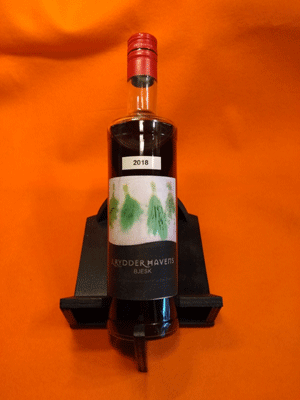
Extended version "Spice Garden Snaps", gets 4 **** Finally, leave the "Stomach Bitter" cold, dark and dry so that it can mature and the sediment can settle. It can then be decanted and is then ready to drink. I have made a Decanter with electric pump and it works perfectly. After a few years I tasted this bjesk and found that the development had stalled. It lacked a little sweetness and something sour. I had the 2nd extraction from my wild apples with vanilla bean, so therefore the bottle was poured on these and put away for 6 weeks. The bottle was taken out and was filtered, sample tasted and found much better. Went from 2 ** to 4 ****. The name must also be renamed from Bjesk to Snaps. Would be excellent for a cheese board. Back to the page where you came from. |
|
No. 41 A Ingredients for a good Walnut Braun Whisky ****
Danish version Next Down Walnut Braun Whisky 2 x 700 ml Vodka 37.5Vol.% 500 g ripe walnuts with shell 1 tbsp. Heather honey 2 cubes Smoked French Oak 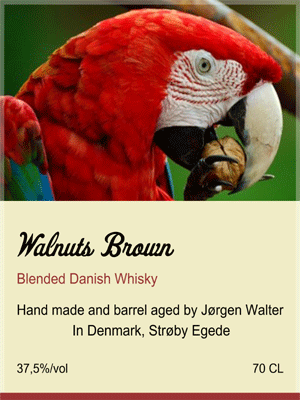
Calculation of sugar and water in walnuts Accessories: 2 glasses of 2 liters with lid Soaking time: 1 year Maturation time: 2 years 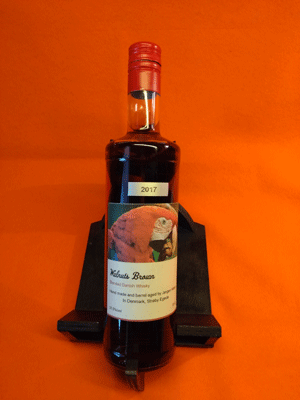
Walnut Brown Whiskey. Mixed in November 2017 Bottled in November 2018 Back to the page where you came from. Procedure without liability for Walnut Braun Whisky and Hazelnut Brown Whiskey
Crack all the nuts and put them in separate glasses with shells. Put French Oak in each glass and 1 tbsp. heather honey in the walnuts. The hazelnuts are more sweet, so here I do not use heather honey. Pour on vodka so that it covers. Put the glasses away: Cool, dry and dark for at least 1 year. The mixture is then filtered and filled into clean bottles. After a few months, the whiskey is decanted and can now be poured into the remaining bottles. I have made a Decanter with electric pump and it works perfectly. There will always be a little missing in each bottle, so refill with a whiskey. I used approx. 10 cl. Grant's whiskey per bottle. Note: Smoked oak is available in light, medium and heavily smoked. Can be bought where you buy accessories for beer brewing. I used a heavily smoked oak. Back to the page where you came from. No. 41 B Ingredients for a good Hazelnut Braun Whisky ****
Danish version Next Down Hazelnut Braun Whisky 2 x 700 ml Vodka 37.5Vol.% 500 g ripe hazelnuts with shell 2 cubes Smoked French Oak 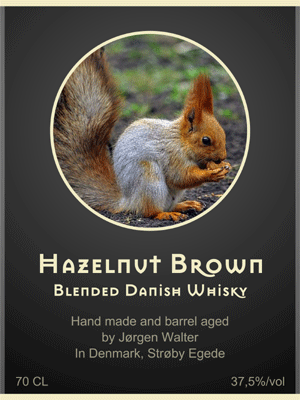
Calculation of sugar and water in hazelnuts Accessories: 2 glasses of 2 liters with lid Soaking time: 1 year Maturation time: 2 years 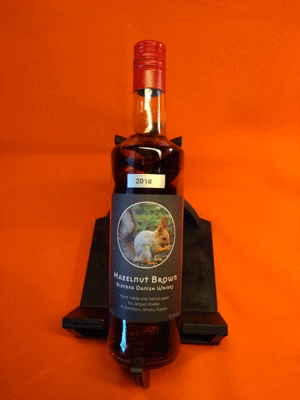
Hazelnut Braun Whisky. Mixed in November 2017. Bottled in November 2018 Back to the page where you came from. |
|
No. 42 Ingredients for a good Vermouth. Wermut in German means wormwood **
Danish version Next Down 325 ml Vodka 37.5Vol.% 425 ml Liebfraumilch 9.5% from Rema 1000 gives an alcohol strength of 21.5% 2 pcs. Star anise crushed 1 tbsp. Gentian root cut 1 tsp. Licorice root cut 1 tsp. Garden wormwood dried 1 tsp. Lemongrass / Lemon verbena dried 1 tbsp. Juniper crushed 1 tsp. Cardamom seeds crushed 4 pieces. Carnations whole crushed 1 tsp. Sage dried 4 pieces. Rosebuds dried 1 tsp. Espresso coffee beans crushed 2 tsp. Coriander seeds crushed 1/4 Vanilla stick split 1 piece. Orange peel organic, only the yellow or Bergamotte peel or Pomeranian peel bitter Accessories: 1 liter glass with lid. Soaking time: 3 weeks with herbs in vodka. Then 2 weeks with vodka and white wine mixed. 425 ml Liebfraumilch 9.5% gives an alcohol strength of 21.5%.
700 ml Liebfraumilch 9.5% gives the alcohol strength of 18.5%. Alternative spices: Saffron and 1 Bergamotte, if you can get this citus fruit. Otherwise use Pomeranian shell, or 2 drops of bergamot oil. 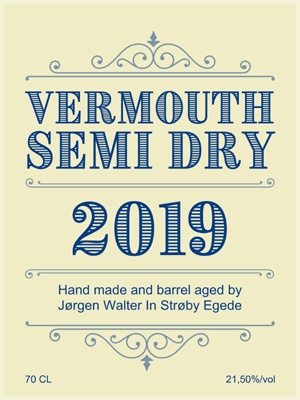
Vermouth Mixed December 2018 Procedure without liability Put all the ingredients in a bottle and pour on the vodka. Let the mixture stand for 3 weeks cold, dark and dry, shake the bottle a few times the first few weeks. Then filter the mixture into a new, clean bottle and pour in the white wine. Now the bottle is stored cold, dark and dry for at least 2 weeks to mature and not least to settle. The contents are then decanted into a new, clean bottle. I have made a Decanter with electric pump and it works perfectly. The Vermouth is now ready to be enjoyed chilled. Maybe on a few ice cubes and a slice of lemon. Wermut in German means "Wormwood" and is a spicy liqueur wine - over 14% to 24% alcohol - invented by an Italian Antonio Benedetto Carpano from Turin. He was inspired by a German liqueur spiced with wormwood. There are 3 different types of Vermouth, a sweet, medium sweet and dry Vermouth. The sweet Vermouth is usually reddish/brown and less bitter than the clear/yellow and drier Vermouth. It all depends on the 50 different herbal extracts that Vermouth is made from. Vermouth originated because in the 1700s people had very bad wine and they wanted to hide this wine with some herbs. Among other things "Wormwood" - hence the expression "Get Wormwood in the Cup". Maybe? 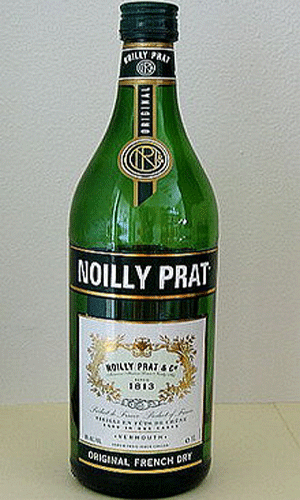
A purchased Noilly Prat Vermouth If you do not have all these herbs, you can try experimenting with other herbs yourself, but use a garden wormwood/beach wormwood/cola wormwood and gentian root. It gives a bitter taste. For other alcohol percentage values, use my Wine and Schnapps percentage Excel spreadsheet. Open the EXCEL spreadsheet in a new window. Only on a PC with an Excel spreadsheet. Back to the page where you came from. |
|
No. 43 Ingredients for a good Rowanberry Safran Schnapps ***
Danish version Next Down Year 2018 700 ml Vodka 37.5Vol.% 400 g Rowan berries fully ripe 1 pk. Safran ½ gram 1 to 2 tbsp. Cane sugar (optional) Year 2024 700 ml Vodka 37.5Vol.% 310 g Rowan berries fully ripe 100 g Apples, 1 large apple 2 tsp. Paradise seeds, 4 cl essence 4 cl Heather honey essence (optional) Tasting: Very sour Accessories: 1 liter glass with lid. Soaking time: Rowan berries/Safran 3 months in vodka. Then 1 year of maturation. Rowan berries/Apples/Paradise seeds 3 months in vodka. Then 1 year of maturation. Try making a safran essence of ½ g saffron and 250 ml of vodka. This essence can be used for many schnapps. Gives a nice color and adds a good aroma. I added my rowanberry schnapps 1 tbsp. organic cane sugar. See also: Calculation of sugar and water in rowan berries.
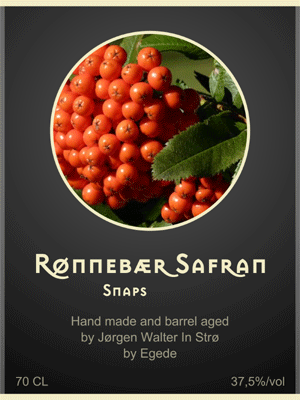
Rowanberry Safran Schnapps Procedure without liability The rowanberries are picked as late as possible so that they are fully ripe. It gives the best sweetness in the schnapps. But do not wait too long, because the sunbird also likes rowanberries when they are sweet and there is a shortage of food. It will be a good idea to put the rowanberries in the freezer for a few days, just as you do with the sloe. It will burst the cells in the fruit so that the aesthetic oils come out in the vodka. I picked my rowanberries in mid-October and let them mature in vodka until the end of January. They got an excellent taste, much better than the ones I made the year before, which I took somewhat before in September. 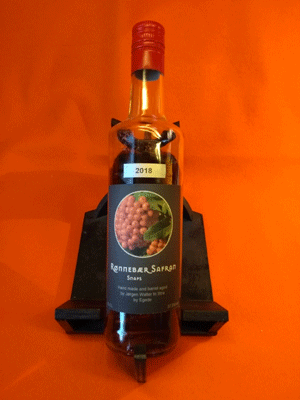
Rowanberry Safran Schnapps I made a saffron essence on a letter saffron (½ g) and 250 ml of vodka, which I put 30 ml in the rowanberries. It gives a nice color and a good taste to the "Schnapps". The schnapps can actually be drunk now, but I have good experience of letting it mature for several months. So I do. The schnapps was filtered in 2 pcs. coffee filter and it was completely ready, so I do not think that rowanberry schnapps should be decanted, but I shall see after a few months. I made this Rowan Berry Saffron Snaps in 2018 and put it away. I forgot all about it and now we are writing 2024, where I found it. It is better than any other (bought) spirit that I have tasted. I am changing from *** stars to **** stars. Then you'll see what time can do to your Spice Schnapps. Back to the page where you came from. |
|
No. 44 Ingredients for Rose hip Safran Schnapps **
Danish version Next Down 700 ml Vodka 37.5Vol.% 340 g Rose hip ripe, purified weight 3 cl Safran essence 1 to 2 tbsp. Cane sugar (option) Accessories: 1 liter glass with lid. Soaking time: Rose hip 4 to 6 weeks in vodka. Then 1 year of maturation Try making a saffron essence of ½ g saffron and 250 ml of vodka. This essence can be used for many snaps. Gives a nice color and adds a good aroma. I have not added sugar yet.
Note: Rose hips must not be green or yellow. They contain pectin and the schnapps becomes gelatinous. They must also not be brewed for too long or too cold. See also: Calculation of sugar and water in the rose hip. 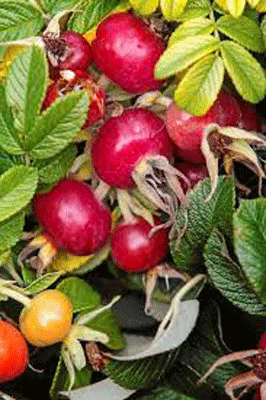
Red ripe rose hips Procedure without liability The rose hips are picked at the end of August so they are fully ripe, but not over ripe and smudged. It gives the best sweetness in the schnapps. I pick my rose hips in the meadow next to Køge Bay. Here come no vehicles, only fresh sea air with a little cold-fog. It is a good idea to put the rose hips in the freezer for a few days after they have been halved and the flower and stem have been removed. The kernels have not yet been removed. This is done by hitting the bag with the frozen rose hips hard on the kitchen table. I removed well over 90% of the kernels and the rest could easily be taken out with a small spoon. By freezing the fruit, the cells in the fruit burst so that the aesthetic oils come out in the vodka. I picked my rose hips last week in August and they are going to be drawing in vodka until *Christmas. I made a saffron essence on a letter saffron (½ g) and 250 ml of vodka, which I put 30 ml in the rose hips. It gives a nice color and a good taste to "Snapsen". 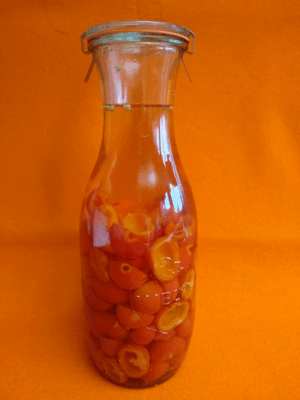
Rose hip Safran Schnapps *Postscript: It was far too long to brew for Christmas, the schnapps became jelly-like. I looked at the snap after 2 months and at that time it was OK. Therefore, I recommend 4 to 5 weeks. Back to the page where you came from. |
|
No. 45 Ingredients for Nymose Bitter ***
Danish version Next Down 688 ml Vodka 37.5Vol.% 4 cl Sloe essence 4 cl Wormwood essence 2 cl Tansy essens 2 cl Yarrowa - Achillea essens Accessories:
1 liter glass with lid if you want use fresh berries and herbs. Soaking time: The sloe mature 4 months alone. Then put the herbs in and let them mature for 4 days. Only 2 to 4 weeks with essences. Option: I also used 4 cl Mose-Pors from the bottle here. The plant can be purchased nurseries 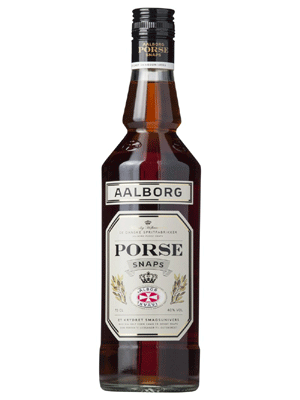
Mose-Porse in a bottle Procedure without liability This bitter is made from 4 essences as described above. Start with a bottle of vodka and pour 12 cl into a glass, which can later be made into a "Bloody Mary". Then measure out the 4 essences and pour these into the vodka bottle. 
Sloe - Wormwood - Tansy - Yarrowa - Achillea Nymose Bitter Most dried herbs are easy to buy in specialty stores with spices. But Tansy, beach wormwood and kvan seeds are not easy to obtain. Tansy contains the toxin thujon, which can only be ingested in very small amounts, but the plant contains many different essential oils such as camphor and tobacco flavors. In addition, the plant gives a bitter taste, which can also be produced with beach wormwood. Garden wormwood is used in absinthe and also contains many different essential oils, including thujon (thujon occurs in the plant thuja) so garden wormwood is also used with care. Garden angelica leaves and seeds are used for bjesk, vermouth, liqueur and gin. Also in Carlsberg Jacobsen beer. So it should be available. Back to the page where you came from. |
|
No. 46 Ingredients for Acorn Snaps ****
Danish version Next Down 700 ml Vodka 37.5Vol.% 200 g Acorn This corresponds to 70 pcs. Accessories: 1 liter glass with lid. Soaking time Acorn draws 6 months Stored for 6 months Option: I use Whiskey or Cognac, see the text below. You can add a little more flavor to the schnapps by roasting half of the acorns in an oven at max. 60°C until they turn black but not burnt. Before the schnapps is stored, you can taste it to decide whether it needs to be diluted a little. This is where I use Whiskey or Cognac. The procedure is very similar to that for green walnuts. But I'm not cutting the acorns. Maybe I should try that next time.
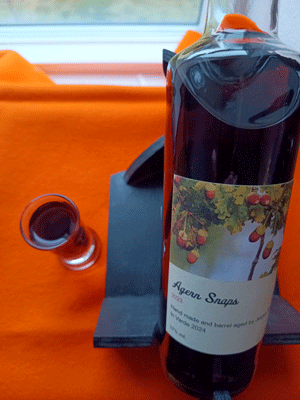
Acorn Snaps Procedure without liability This schnapps is made from 200 g of acorns picked in the first week of September. They haven't fully ripened yet, so they haven't turned hard and brown. All the acorns are freed from the bowl, which is usually stuck on the branches of the tree. If the acorns are dirty or covered with spider webs, rinse them in water and dry them on a tea towel for a day before putting them in a bottle. Put the acorns in a bottle and pour a bottle of vodka over them and let them soak for 6 months in a cool and dark place. But don't put the bottle too far away, as it pays to shake the bottle once a week for the first 3 months. During the last month, the bottle stands still, so that any sediment collects at the bottom of the bottle. Now decant the contents into a clean bottle and filter the rest through a coffee filter ot two. The two "snaps" are mixed and the bottle is stored for at least 6 months. If something is missing for the bottle to be full, add the same vodka that was used previously. However, I can recommend using a Whiskey or Cognac. The bottle must be kept dark, cool and still for 6 months, after which it is decanted again - or as I do, using a riser so that no sediment gets into the new and last bottle. It is always wonderful to see a sparkling clear schnapps in your glass. Back to the page where you came from. |
|
No. 47 Ingredients for "Wild Apple" Snaps ****
Danish version Next Down 500 ml Vodka 37.5Vol.% 300 g cleaned wild forest apples with peel This corresponds to approx. 10 pcs. 1/2 vanilla pod, split 150 ml Tansy mild essence 50 ml Mulberry essence Accessories: 1 liter glass with lid. Soaking time: The apples take 2 months. Stored for 6 months Option: I use a mild Tansy essence and a Mulberry essence. Before the schnapps is stored, you can taste it to decide whether it needs to be sweetened or diluted a little. The same vodka as before is used here. Since they are wild apples, the variety is of course not known, but they can be seen in the picture below. Tasted fantastically good, sweet and not at all sour, but very dry in the meat. That must be an advantage, because then the schnapps is not diluted that much. See also: Calculation of sugar and water in apples.
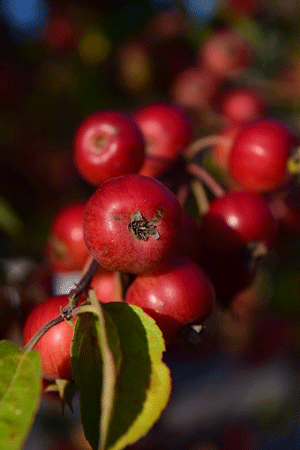
Wild apple that I use for schnapps Procedure without liability This schnapps is made from 400 g of wild forest apples picked in the first week of October. They were small with good flavor and perfectly ripe but with a little juice. All apples were cleaned, stem and flower (top and bottom) were cut away. Quartered, but the core housing with all the brown cores was not cut away. Put the apples in a bottle and pour 500 ml Vodka, 150 ml Tansy mild essence and 50 ml Mulberry essence over it and leave it to soak for 2 months in a temperate and dark place. Take out the bottle and strain the contents into a new, clean, dark bottle, where the "Apple Schnapps" rests for a few months and forms sediment. Now the contents can be decanted into the remaining clean, dark bottle, which is stored for at least 6 months. If there is a little left for the bottle to be full, add the same vodka that was used earlier. 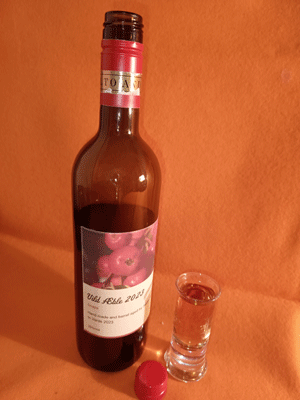
Strained and bottled, must be diluted and matured The bottle must be kept dark, cool and still for 6 months. It is always wonderful to see a sparkling clear schnapps in your glass. The apple schnapps is taste tested after 1 year and gets absolutely 5 stars. To be made again in 2024. Please note: My Rejnfan essence is a very mild essence that is brewed from a handful (approx. 5 g) of the yellow flowers and 250 ml Vodka for 1 week. See under essences I visited this place in September 2024 to harvest some more wild apples for an apple schnapps. But believe me! there was not a single apple on the four trees that stood by the lake shore. There have been others before me. Back to the page where you came from. |
|
No. 48 Ingredients for Quince schnapps ****
Danish version Next Down 700 ml Vodka 37.5Vol.% 2 pcs. Quinces, large - weighed 520 g 1/2 vanilla pod, split 1 tbsp. Heather honey as desired Not in yet Option: 1/2 orange peel or 1/2 lemon peel or 1 Cinnamon stick or 5 Cardamom capsules or 5 Cloves, whole or 1 Star anise Accessories: 1 liter glass with lid. Soaking time: The quinces take 2 months. Stored for 6 months The schnapps can be calculated here: Calculation of water and sugar and Alcohol Vol.% in fruit and berries for spice schnapps. Or this Sugar and water in quince. 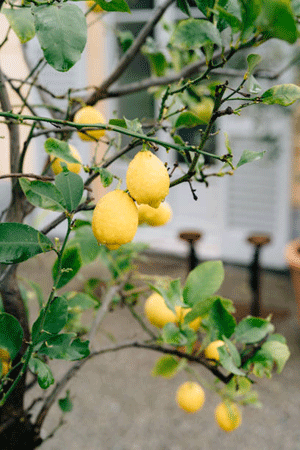
The quince schnapps was made November 2023 Procedure without responsibility This schnapps is made from two large quinces from Turkey, bought from a Turkish greengrocer at the end of November. The quinces were rinsed in clean water and dried. First divided into 1/8 parts and then halved. Stem, flower and pith were cut away. Approx. 445 g after the quinces were cleaned.
Put the split quinces and half a split vanilla bean into a bottle and pour 700 ml of Vodka over it and let it soak for a minimum of 2 months in a temperate and dark place. If you want more flavourings, I have mentioned several options above. Take out the bottle and strain the contents into a new, clean bottle, where the quince schnapps rests for a few months and forms sediment. Now the contents can be decanted into the remaining clean bottle, which is stored for at least 6 months. If something is missing for the bottle to be full, add the same vodka that was used earlier. 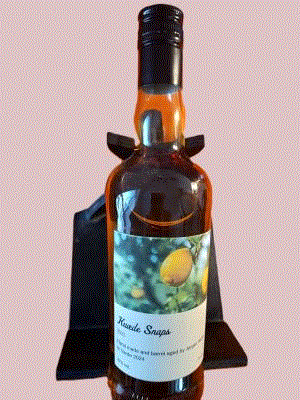
The quince schnapps was made November 2023 The bottle must be kept dark, cool and still for 6 months. It is always wonderful to see a sparkling clear schnapps in your glass. Please Note: Before storing the schnapps, you can taste it to decide whether it needs to be sweetened or diluted a little. The same vodka as before is used here. The bottle must be filled up. Back to the page where you came from. |
|
Nr. 49 Ingredients for a good "Walter-Angler Bjesk" of the mild kind ****
Danish version Next Down 700 ml Vodka 37.5Vol.% 4 cl Porse essence 3 cl Beach Wormwood essence 1 cl Dill essence 1 cl Pomegranate essence 1 cl St. John's wort essence 1 cl Sorrel root essence 1 cl Curry herb essence Inspiration from my essences and knowledge from Signe af Hirtshal's essences
Soaking time 2 weeks at room temperature. Accessories: Measuring glass of 200 ml 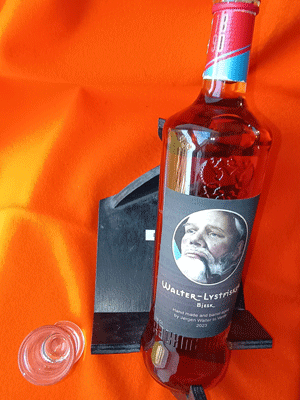
"Walter-Angler Bjesk" Procedure without liability This mild and tasty bjesk is very easy to make once all the essences are made. Pour 12 cl of vodka from a bottle into a measuring cup. Store the vodka in a bottle for later use - new essences? Measure out all the above essences (a total of 12 cl) and put them in the bottle with your favorite vodka. Shake the bottle to mix the essences. Put the bottle away for a few weeks in a warm, dark and dry place. Wait for all ingredients to mix to a homogeneous size. Enjoy.
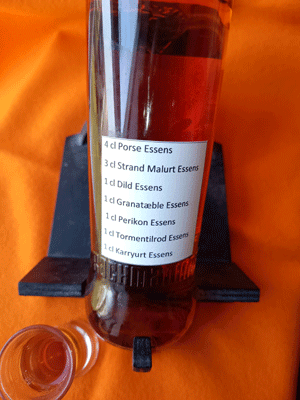
"Walter-Angler Bjesk" When the time comes for the first taste test, I will assess whether the Bjesken needs to be diluted with more vodka, or whether it is suitable according to the recipe. It is often the case that the herbs are more or less strong in flavor and fragrance. The "Walter-Angler Bjesk" has been sample tasted for a Christmas lunch in 2023 - got 4 **** from the participants - and nothing more needs to be done to it. Just leave it to mature for a few more weeks. I can recommend making a new bottle for Christmas 2024 and putting it away until then. Back to the page where you came from. |
|
No. 50 Ingredients for Christian the IV Stomach Bitter
Danish version Next Down 700 ml Vodka 37.5Vol.% 1 g *Angelica root 5 g *Anise seeds 1 g *Lemon peel, dried 0.5 g *Juniper 1 g *Fennel seeds 1 g *Galangal 1 g *Ginger 1 g *Calamus root 0.5 g Cardamom, whole 2.5 g **Cassia cinnamon 0.5 g *Cumin, whole 1 g *Coriander seeds, whole 0.5 g Cloves, whole 1 g *Licorice root, cut 0.5 g *Nutmeg 1 g *Nutmeg, grated 0.5 g ***Paradise seeds, whole 1 g *Pomeranian peel, dried 1 g *Rose flowers, buds 1 g Rosemary flowers 0.5 g *Cumin, whole 1 g ****Zedoarrot, dried - missing The herbs without a star have not yet been purchased *Herbs with *star I have in stock. **Cassia cinnamon contains more coumarin than Ceylon cinnamon. ***Paradise seeds may not be sold in Denmark. Must be purchased abroad. Bought in Sweden. ****Zedoarrod I'm not quite comfortable with the website. Looking for other options. Option: A little sugar or heather honey or Glycerin 99.5% E422. Glycerin's sweetening effect is 26 times that of sugar and is dosed with 1 - 10 ml per litre.
Soaking time 4 weeks at room temperature, dark and dry. But look at the bitter after 2 weeks. Accessories: 1.5 liter glass with lid. 
Christian the IV Stomach Bitter Procedure without liability Inspiration for Christian the IV Stomach Bitter comes from my reading about "Christian Firtal" and all his deeds as well as the 24 children with 5 different women. So take courage! there is courage in this Stomach Bitter. Measure out all the above herbs for a total of 22 and put them in a suitable bottle and pour your favorite Vodka over. Shake the bottle well to mix the herbs. Put the bottle away for a few weeks in a warm, dark and dry place. Wait for all ingredients to mix to a homogeneous size. Take a taste test and form an impression of the stomach bitter's development. Should it take longer? Should it be diluted with more Vodka? Or should a sweetener be added - sugar/heather honey/Glycerin 99,5% E422? 
Christian the IV Stomach Bitter When the time comes for the final taste test, I will assess whether the stomach bitter needs to be diluted with more vodka or whether it is suitable according to the recipe. It is often the case that the herbs are more or less strong in flavor and fragrance. If Christian den IV Stomach Bitter tastes good - in your opinion - it is time for a rough sifting of all the herbs, so that the Stomach Bitter can be put into a clean bottle. Then this is where I will put the bottle away for several months warm, dry and dark. Take the bottle out quietly without shaking it. Decant the contents of the bottle with a Decanting device with a hose so that the sediment does not get into the new, clean bottle. Back to the page where you came from. |
|
No. 51 Ingredients for a good Varde Bitter *****
Danish version Next Down 700 ml Vodka 37.5Vol.% 10 g licorice root, cut 10 g angelica root, sliced 10 g tormentil root, cut 10 g St. John's wort, dried 5 g dandelion root, dried 5 g yellow snarl, dried 5 g meadwort, dried 5 g aniseed, whole 5 g fennel seeds, whole 5 g The five peppers, whole 4 pcs. tonka beech, halved 2 pcs. star anise, whole The 5 Peppers are: Black, white, red, green and allspice - all whole seeds Option 1 cl cola herb, essence 1 cl curry herb, essence Soaking time 2 weeks at room temperature, dark and dry. But look at the bitter every day and give it a shake. Accessories: 1 liter glass with lid 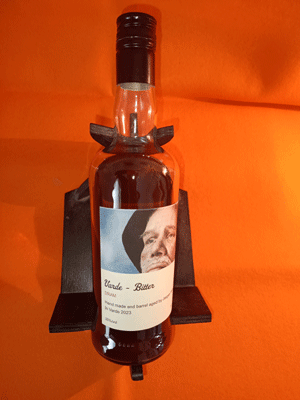
Varde Bitter Procedure without liability This Varde Bitter is very easy to make. Most herbs can be bought in shops that sell spices. I had cola herb and curry herb in my garden. I made good essences of all the herbs from the garden and those that I gathered around. It turned out to be about 90 bottles. See here.
Measure out all the above dried spices as well as the two essences and put them in a bottle and pour your favorite vodka over. Shake the bottle well so that the spices and essences mix with the vodka. Put the bottle away for a few weeks in a warm, dark and dry place. Wait for all ingredients to mix to a homogeneous size. Enjoy. 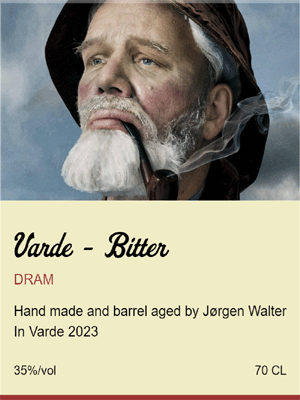
Varde Bitter When the time comes for the first taste test, I will assess whether the Bitter needs to be diluted with more vodka, or whether it is suitable according to the recipe. It is often the case that the herbs are more or less strong in flavor and fragrance. Varde Bitter is a test taste and must be diluted with a little more vodka so that it fills a whole bottle again. (After all, something is lost during the process). Just leave it to mature for a few more weeks. Back to the page where you came from. |
|
No. 52 A punch for a sweetening agent "Glycerin 99.5%", E422
Danish version Next Down 500 ml Glycerin 99.5Vol.% E422 Mixing ratio 1 ml to 10 ml per 1 liter of: Homebrewing beer Homemade wine Homemade spice schnapps Accessories: 10 syringes, 10 ml Retailer Here I bought: Lund Teknik. Check prices: Citrus Snaps 700 ml Vodka 37.5Vol.% 2 small Grape OK, whole 1 Cinnamon stick 10 Cloves, whole 2 Star anise, whole 20 Szeuchuan Pepper, whole 1/2 vanilla pod, split 2 tbsp. Heather honey 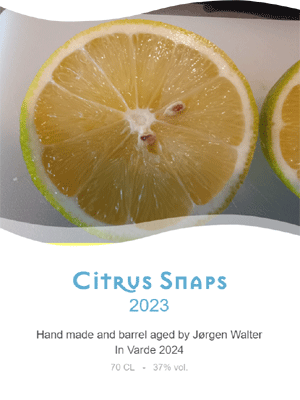
This Citrus Snaps got 10 ml of glycerin Procedure without liability The short version: Glycerin 99.5%, E422, food sweetener. Gives fullness and sweetness, is not perishable. The sweetening effect is 26 times that of sugar and is dosed with 1 – 10 ml per litres. To get more body in low-alcohol beer - wine - spice schnapps, typically 1 - 10 ml per 1 liter is used.
Glycerin is also known as glycerol or propanetriol. It is a colorless, odorless and hygroscopic liquid, which is a very sweet-tasting trivalent alcohol that is very viscous at room temperature. Glycerin's molecular formula is C3H8O3. * Glycerin is a sugar alcohol with e-number E422 and is used in food as an emulsifier or stabilizer, but despite its sweetness, glycerin must not be used as a sweetener. Glycerin is used in skin creams because of its moisturizing properties. So what do we have? A tasteless trivalent alcohol that gives a fullness and a lot of sweetness to a spice schnapps that just needs to be spiced up. I tried it with a 700ml Citrus Snaps which was very sour. I added 10 ml of glycerin. It helped tremendously. Test the acidity again in 4 weeks. So what don't we have? We don't have sugar, which can ferment into alcohol and carbon dioxide in beer and wine. So glycerin cannot be used as a carbonating agent. But it can do so much else. 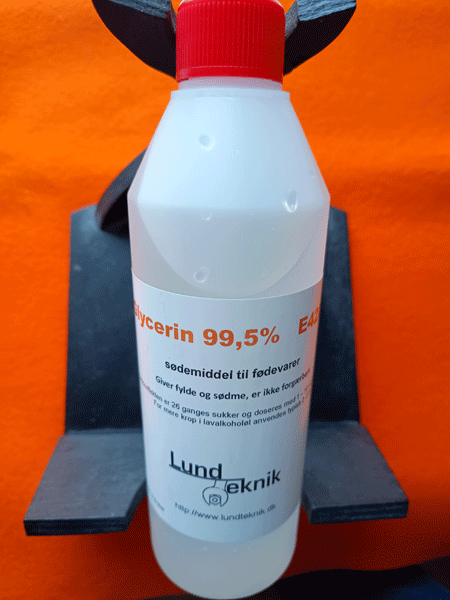
Glycerin 99,5%, E422 2 tbsp. Heather honey was not enough to add sweetness to the Citrus Schnapps. I had long wondered about glycerin and after reading about beer brewers using glycerin in a BREW to give it a fuller body, I wanted to try it in this Citrus Snaps. I was pleasantly surprised. What is Glycerin and what is it used for? * Described above and it is used for many purposes in the home: Use in food, Use in cream and soap, Glycerin for cleaning, Remove stains with Glycerin, Soften laundry, Wiping off dust, Avoid frost blasts. I will only mention "Use in food" and what it says: "Glycerin must not be used as a sweetener". I think it is because Glycerin is an alcohol and therefore it must not be used in soda to make it sweeter. After all, children drink soda. But it is used in mayonnaise as an emulsifier and stabilizer, so that 2 immiscible substances - water and oil - do not separate over time. Kids love mayonnaise. A few other things where glycerin is used: In e-cigarette liquid, in the production of nitroglycerin - explosive and heart medicine - in films for scenes of rain and children's toys for soap bubbles. I could go on, but will stop here. Back to the page where you came from. |
|
No. 53 Ingredients for an Elderflower and Lemon Snaps ***
Danish version Next Down |
|
700 ml Vodka 37.5Vol.% 12 large elderflower screens 1 small organic lemon Option Use a sweetener of your choice after the 2 weeks are up. First strain the extract roughly from the Vodka and press the flowers so that more Vodka comes into the glass. If you know in advance that you want to sweeten your schnapps, it is always a good idea to wait to add the sweetener to the brew after you have strained it through a coffee filter.
Soaking time 2 weeks at room temperature, dark and dry. But check the schnapps regularly and give it a shake. Accessories: 1 liter glass with lid Read about Glycerin above. It is a flavorless sweetener. If you want to sweeten a schnapps that you have made without adding any flavor, you should use Glycerin 99.5%, E422. The sweetening effect is 26 times that of sugar, so dose with caution. Start with 1 to 10 ml per 1 liter of schnapps, so remember 1 pack of 10 ml syringes when you shop. 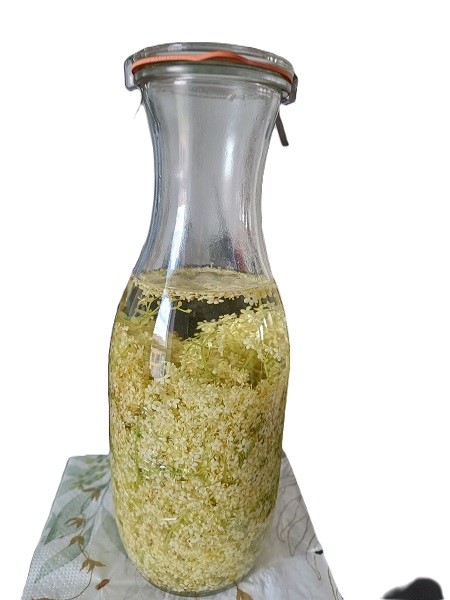
Elderflower and Lemon Snaps. I need an organic lemon, it will arrive tomorrow My 1 l bottle filled with 12 screens and 700 ml Vodka. A week after filtering my Elderflower and Lemon Schnapps, I have tasted it and have come to the conclusion that the schnapps does not need much sweetener, but a "flavor enhancer". I have chosen an essence of Tonka beans. Tastes sweet and of vanilla, caramel and a bit of cinnamon.
Procedure without liability This Snaps must be made from June 1 and until St. His. Why is that? Yes! the elderflower must be in top form, well developed, but not "overripe".
Collect the well-developed screens from the tree - or several trees, cut the screen with pruning shears so that the branch is damaged as little as possible. I cut 15 screens but only got use for the 12 big ones for my 1 liter glass. At home, you can clean the flower and cut off most of the green stems before putting them in the glass. Any insects are also peeled off. Shake the bottle well to mix the flowers and the Vodka. With the flowers in the glass, add the lemon, which has been cut into 1/8 parts. The lemon helps to keep the small flowers below the surface. Put the bottle away for a few weeks in a warm, dark and dry place. Wait for all ingredients to mix to a homogeneous size. Enjoy. When the time comes for the first taste test, I will assess whether the Schnapps needs to be diluted with more vodka, or whether it is suitable according to the recipe. It is often the case that the herbs are more or less strong in flavor and fragrance. 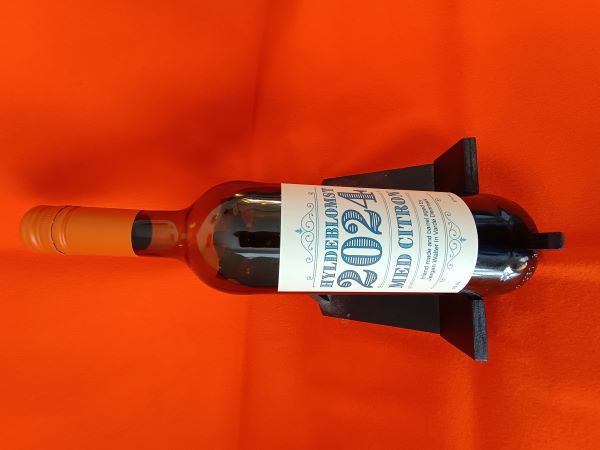
Elderflower and Lemon Snaps Elderflower and Lemon Schnapps is a test taste and it does not need to be diluted with more vodka, but there is a little missing, so it fills a whole bottle again. (After all, something is lost during the process). Just leave it to mature for a few more weeks. At that time, I will filter the schnapps through a coffee filter and give it 10 ml of glycerin (as a sweetener without taste). Back to the page where you came from. |
|
Nr. 54 Ingredients for an Aronia Snaps 2024
Danish version Next Down |
|
2 * 700 ml Vodka 37.5Vol.% 2 * 400 g Aronia berries Option 1 to 2 g of sugar 1 tsp. Licorice root 1 tsp. Pomeranian shell Soaking time 2 to 3 months at room temperature, dark and dry. But look at the schnapps in the first month and give it a shake. Leave it alone for the next month before the berries have to be sieved.
Accessories: Two 1 liter glass with lid Read about Glycerin above. It is a flavorless sweetener. If you want to sweeten a schnapps that you have made without adding any flavor, you should use Glycerin 99.5%, E422. The sweetening effect is 26 times that of sugar, so dose with caution. Start with 1 to 10 ml per 1 liter of schnapps, so remember a pack of 10 ml syringes when you shop. In the first instance, I will get 1 piece. sugar cubes in the schnapps when it is left to draw. 
A bunch of aronia berries just picked This Snaps must be made from August 1st or from the aronia berries are fully ripe, but before the birds take them, because they love the berries when they have become overripe and sweet.
Collect the well-developed berries from the bush and remove the berries from the stem with a fork on the spot, and you will come home with cleaned aronia berries. I rinsed the berries under cold water - let them dry a bit on kitchen paper before putting them in the freezer. I froze the berries for 5 days, then I was ready with the vodka. My two 1 liter glasses filled with 400 g aronia berries and 500 ml Vodka. There couldn't be more in the glass, but the rest 200 ml Vodka will come when it needs to be sieved and the glass needs to be refilled. The schnapps is made according to the procedure below. See also: Calculation of water and sugar in aronia berries. Procedure without liability 700 ml Vodka 37.5Vol.% - - 400 g Aronia berries - - 2 g added sugar The berries contain: Water 316 grams - - Sugar 32 grams - - Plus 2 g added sugar The snap ends with: Volume 1017 ml - - 26Vol.% Alcohol - - 33 grams of sugar/L The mentioned values are calculated according to my Excel spreadsheet RumTopf and KrydderSnaps calculations of berries, sugar and alcohol and are of course only valid if you extract all the sugar from the berries and squeeze the berries to the last drop with my Presse Pistol. But use the result as a guideline for: Volume, alcohol Vol.% and sweetness. From here on down will be written later when I get that far. There will be some corrections, since all the Vodka could not be in the glasses. Put the bottle away for a few months in a warm, dark and dry place. Enjoy. When the time comes for the first taste test, I will assess whether the Schnapps needs to be diluted with more vodka, or whether it is suitable according to the recipe. It is often the case that berries are more or less strong or sweet in taste. 
2 bottles are now filled with 400 g berries and 500 ml Vodka Awaiting the tasting. Back to the page where you came from. |
|
No. 55 Pear Snaps 2024
Danish version Next Down |
|
900 ml Vodka 37.5Vol.% Read the text below 4 pieces Pear 130 g/pc. Thin yellow shell of 1 Öko. Lemon ½ vanilla pod 1/8 g Saffron or 2 cl Saffron essence 2 tbsp. Öko. Cane sugar approx. 12 g Option 1 tsp. Pomeranian shell (not used) Soaking time 2 to 3 months 2 times cool, dark and dry. But look at the schnapps for the first 4 weeks and give it a shake. Leave it alone for the next 2 weeks before the fruit must be sieved. The vodka came in a clean, new bottle to await the next extraction. Pour a new bottle of vodka over the pears and let it soak for another 4 weeks. Then strain and mix the 2 extracts and put it in a large bottle or two small ones. Add more vodka if the bottle(s) are not full.
Accessories: 1 liter glass with lid Read about Glycerin above. It is a flavorless sweetener. If you want to sweeten a schnapps that you have made without adding a flavor, you should use Glycerin 99.5%, E422. The sweetening effect is 26 times that of sugar, so dose with caution. Start with 1 to 10 ml per 1 liter of schnapps, so remember a pack of 10 ml syringes when you shop. Initially, I added 2 tablespoons of organic cane sugar to the schnapps when it was soaking and that was sufficient. 
At the end of August, the pears are ready to be harvested for a good pear schnapps This Snaps should be made from August / September, when the pears are at their peak - ripe but not overripe. I used 4 Clara Friis Pærer which had just started to change color from light green to light yellow. I don't have any bulbs in the garden, so they were bought and were right at the top.
4 pcs weighed 520 grams and all could almost be in my glass, I had to eat half a pear and it tasted excellent. So it must be a good "Pear Schnapps". My 1 liter glass filled with 500 g pears and approx. 500 ml Vodka. There couldn't be more in the glass, but the remaining 200 ml of Vodka comes when it needs to be sieved and the glass needs to be refilled. The schnapps is made according to the procedure below. See also: Calculation of water & sugar & Alcohol Vol.% in fruit and berries for spice schnapps. Or this Sugar and water in pear. Procedure without liability 700 ml Vodka 37.5Vol.% - - 500 g Pears - - 12 g added sugar and spices The pears contain: Water 425.5 grams - - Sugar 54.5 grams - - Plus 12 g added sugar The schnapps ends up with: Volume 933 ml - - 20 Vol.% Alcohol - - 66.5 grams of sugar total Sugar 7.1% - - Sugar per 1 liter 71 grams The values mentioned are calculated according to my Excel spreadsheet RumTopf and KrydderSnaps calculations of berries, sugar and alcohol these values ??are of course only valid if you extract all the sugar from the berries and press the berries to the last drop with my Presse Pistol. I measured 600 ml of Pear Schnapps after the schnapps had been strained in my Swissgold gold filter. So here are the final calculations: Insert 600 ml into cell N39 in the spreadsheet and read the efficiency as 64.31% in cell N40. Find the nearest whole number 64% in cell G36 and enter this value. The efficiency changes to 76.95% in cell N40. Find the nearest whole number 77% in cell G36 and enter this value. The efficiency changes to 71.85% in cell N40. Find the nearest whole number 72% in cell G36 and enter this value. The efficiency changes to 73.73% in cell N40. Find the nearest whole number 74% in cell G36 and enter this value. The efficiency changes to 72.97% in cell N40. Find the nearest whole number 73% in cell G36 and enter this value. 73% is already in cell G36, so that is the result for the efficient berry utilization of the Pear Schnapps. Then you need to check the ABV% in cell D18, it has increased to 23%. The reason for this is that we could not extract all the water (juice) and sugar from the fruit. The sugar percentage has decreased to 6.3% or 63 grams of sugar per liter. Use the result as a guideline for: Volume, ABV% and sugar%. Those were the calculations with only 500 ml of Vodka, so now I fill up to 1000 ml of total Pear Schnapps. 400 ml of Vodka at 37.5 Vol.% must be added to the 600 ml of Pear Schnapps at 23 Vol.%. The values are entered into my Excel spreadsheet and the result is a Pear Schnapps at 29 Vol.%. If I want a Pear Schnapps at 35 Vol.% I must add 136 ml of Stroh Rum 80. I mention Stroh Rum because I have this Rum. If it is to be a neutral fine spirit 96 Vol.%, you must use 98 ml. But my Java Script Calculation of water & sugar & Alcohol Vol.% in fruit and berries for spice schnapps can also be used, but lacks the berry utilization rate, so interpolation from 64% to 73% is missing. 
1 bottle is now filled with 500 g pears and 500 ml Vodka and spices Waiting for a tasting. I took a tasting on September 2nd and it looks good. On September 24th I strain the schnapps from the pears and add new vodka and let it steep for another month. After which the two schnapps are mixed in a new, clean bottle. Now we are at the beginning of December 2024 and I have done everything described above, except for filling Stroh Rum 80 and I can tell you that the Pear Schnapps tastes 10 stars. Therefore, I will first do an experiment on a smaller scale so as not to ruin anything. WAITING. Back to the page where you came from. |
|
No. 56 Apple of Paradise versus Apple of Sargent Snaps
Danish version Næste ned |
|
700 ml Vodka 37.5Vol.% 330 g Paradise apples, 62 pcs. ½ vanilla pod 4 cl heather honey essence (own product) Preface: I have found a small solitary apple tree in the wild, which produces very small, bright red apples. I have named it a Paradise apple tree, but I think on closer inspection that it is perhaps a hybrid / Sargent apple tree (Malus sargentii). A description of the apples: 1 large apple 7.2 g - Average of the 62 apples 5.4 g - Length 28 mm - Diameter 22 mm - Stem 13 mm. The apples are "squeaky" sour but with a good apple flavor and yet quite sweet in taste. The kernels were brown and that means I picked them at the right time.
Accessories: 1 liter glass with lid Soaking time 2 to 3 months 2 times at room temperature, dark and dry. But look at the schnapps for the first 4 weeks and give it a shake. Leave it alone for the next 2 weeks before the fruit must be sieved. Pour the vodka into a clean, new bottle to wait for the next extraction. Pour a new bottle of vodka over the apples and let it soak for another 4 weeks. Then strain and mix the 2 extracts and put it in a large bottle or two small ones. Add more vodka if the bottle(s) are not full. Read about Glycerin above. It is a flavorless sweetener. If you want to sweeten a schnapps that you have made without adding any flavor, you should use Glycerin 99.5%, E422. The sweetening effect is 26 times that of sugar, so dose with caution. Start with 1 to 10 ml per 1 liter of schnapps, so remember a pack of 10 ml syringes when you shop. For this Paradise Apple Schnapps I used 4 cl of my homemade Heather Honey Essence. When I use my own "Honey Essence", it is because it has soaked for a long time and settled. Therefore, no turbidity in the Spice Schnapps. 
The large apple on the left 7.2 g, length 28 mm, diameter 22 mm, stem 13 mm This Snaps should be made from September / October when the paradise apples are at their peak - ripe but not overripe.
62 pieces weighed 330 grams and all could be in my glass. My 1 liter glass filled with 333 g Paradise apple and approx. 500 ml Vodka. There couldn't be more in the glass, but the remaining 200 ml Vodka comes when it needs to be sieved and the glass needs to be refilled. The schnapps is made according to the procedure below. See also: Calculation of water & sugar & Alcohol Vol.% in fruit and berries for spice schnapps. Or this Sugar and water in paradise apples. Procedure without liability 700 ml Vodka 37.5Vol.% - - 330 g paradise apples - - 4 cl heather honey essence added Paradise apples contain: Water 263 grams - - Sugar 65 grams - - Plus 4 cl heather honey essence The snap ends with: Volume 967 ml - - 27.3Vol.% Alcohol - - 65 grams of sugar + a little heather honey Sugar % 6.7 - - Sugar per 1 liter 67 grams The mentioned values are calculated according to my Excel spreadsheet RumTopf and KrydderSnaps calculations of berries, sugar and alcohol and are of course only valid if you extract all the sugar from the berries and squeeze the berries to the last drop with my Presse Pistol. But use the result as a guideline for: Volume, alcohol Vol.% and sweetness. But my Java Script Calculation of water & sugar & Alcohol Vol.% in fruit and berries for spice schnapps can do the same. From here on down will be written later when I get that far. There will be some corrections since all the Vodka could not be in the glass. Put the bottle away for a few months in a warm, dark and dry place. Have fun. When the time comes for the first taste test, I will assess whether the Schnapps should be added to vodka, or whether it is suitable according to the recipe. It is often the case that fruits are more or less strong or sweet in taste. 
A cut branch with 5 apples Awaiting the tasting. Taste after 2 months: Very pleasant balance between sour and sweet. Feel free to let it soak for a few more months and add more vodka when it is filtered and bottled. Back to the page where you came from. |
|
No. 57 Kumquat Christmas Schnapps 2024
Danish version Next Down |
|
700 ml Swedish Vodka 37.5Vol.% 300 g 25 pcs. Kumquat fruits, halved 10 pieces Cloves, whole 10 pieces Cardamom seeds, whole 2 pieces Star anise, whole 1 pc. Cinnamon stick, whole Option Maybe half a vanilla bean - I'll wait. Maybe some sweetener of your choice, once the fruit has been strained the first time. I didn't add any of this after I tasted the Christmas schnapps. It was neither sour nor sweet, but just right. If I have to say something - a little "tame" in taste - nothing special about these fruits. Better to eat the fruits fresh and whole. So I'll stick to that until next year. I'll finish the Christmas schnapps and hide it away for several years, then we'll see what it develops into. Preface: Kumquat is a species in the citrus genus and vine family. Wild kumquat grows in southern and southeastern China as well as in Japan. The fruits are mainly imported from Israel, South America and South Africa. Kumquat is grown both for the sake of the fruit for consumption and as decoration. The peel, which is very thin, has a slightly bitter taste and the fruits are usually eaten whole and unpeeled, giving an intense taste of sweet, sour and bitter.
Kumquat is a shrub or small tree. The flowers are white and fragrant, and the fruits are small, round or oval. It is crossed with other species and forms part of, for example, limequat and calamondin, a type of citrus fruit. Accessories: 1 liter glass with lid Soaking time 2 to 3 months cool, dark and dry. But watch the schnapps for the first 4 weeks and give it a shake. Leave it alone for the next 2 months before straining off the fruit. Put the Christmas schnapps in a clean, new bottle and top up with more vodka if the bottle is not full. *600 ml Swedish Vodka, there could not be more in the glass, the remaining 100 ml Swedish Vodka will be added when straining and refilling the glass. Measured pH 3.2 at 24°C. Pleasant with the acid in balance. 
I found these large, beautiful Kumquats in Meny - 1 tray 150 g, DKK 30.00. Follow the big supermarkets, which carry a large selection of exotic fruits. I bought my two packages of 150 g for DKK 30.00 per piece. in Meny in October. The fruit was from South Africa and perfect in taste and appearance.
The two packages contained 28 pcs. and weighed 320 grams together. I ate some to test how sweet, sour and bitter they were. A very pleasant taste - not too sour and bitter with just the right amount of sweetness. My 1 liter glass filled with 300 g Kumquat and approx. 600 ml Swedish Vodka. There couldn't be more in the glass, but the remaining 100 ml of Swedish Vodka comes on when it needs to be sieved and the glass needs to be refilled. The schnapps is made according to the procedure below. See also: Calculation of water & sugar & Alcohol Vol.% in fruit and berries for spice schnapps. Or this Sugar and water in kumquat. Procedure without liability 700 ml Vodka 37.5 Vol.% 300 g Kumquat Spices added, no influence on the measurements. Kumquat contains: Water 80% = 240 grams Sugar 15.90% = 47.7 grams The schnapps ends up with: Volume 940 ml Alcohol 28 Vol.% sugar 47.7 grams. Sugar 5.1 % Sugar per 1 liter 51 grams The values mentioned are calculated according to my Excel spreadsheet RumTopf and KrydderSnaps calculations of berries, sugar and alcohol, these values ??are of course only valid if you extract all the sugar from the fruit and squeeze the fruit to the last drop with my Presse Pistol. I measured 700 ml of Christmas schnapps after the schnapps had been strained in my Swissgold gold filter. So here are the final calculations: Insert 700 ml in cell N39 in the spreadsheet and read the efficiency as 74.47% in cell N40. Find the nearest whole number 74% in cell G36 and enter this value. The efficiency changes to 79.76% in cell N40. Find the nearest whole number 80% in cell G36 and enter this value. The efficiency changes to 78.48% in cell N40. Find the nearest whole number 78% in cell G36 and enter this value. The efficiency changes to 78.90% in cell N40. Find the nearest whole number 79% in cell G36 and enter this value. The efficiency changes to 78.69% in cell N40. Find the nearest whole number 79% in cell G36 and enter this value. 79% is already in cell G36, so that is the result for the efficient berry utilization of the Christmas schnapps. Then check the ABV% in cell D18, it has increased to 30%. The reason for this is that we were not able to extract all the water (juice) and sugar from the fruit. The sugar percentage has decreased to 4.2% or 42 grams of sugar per liter. Use the result as a guide for: Volume, ABV% and sugar %. But my Java Script Calculation of water & sugar & Alcohol Vol.% in fruit and berries for spiced schnapps can also be used, but lacks the berry utilization rate, so interpolation from 74% to 79% is missing. 
Was prepared the same day for a Christmas schnapps in 2025 I tasted the Christmas schnapps after 2 months because I saw that it became cloudy and had a tendency to form jelly. I have been exposed to this before with rose hips and rowan berries. My theory is: Too many berries in relation to the amount of alcohol and alcohol strength, too hot during soaking time and too long soaking time. I have always used fully ripe fruits, so that is not why. There is something called pectin that needs to be investigated and I will do that. See you. But the tasting was as follows: Very pleasant ratio between sour/sweet, but read under "Option" what I have written. Back to the page where you came from. |
|
No. 58 Fig & Sea buckthorn Schnapps
Danish version Next Down |
|
700 ml Swedish Vodka 37.5Vol.% 300 g Sea Buckthorn, fresh Or 50 g Sea Buckthorn Eco. dried 2 to 4 pcs. Figs, fresh 8 to 10 pcs. Figs, dried 1 stick Licorice root, whole Option Maybe some sweetener of your choice when the fruit is first sieved. NO! it is absolutely not necessary. It may need to be diluted after it has been stored for 3 to 6 months. Preface: I will try to use organic sea buckthorn from the Baltic Sea area. The company Biogan has an organic, dried sea buckthorn product in bags of 75 grams. To make 1 kg of dried sea buckthorn, you need 5.7 kg of fresh sea buckthorn. Normally I would use 300g of fresh sea buckthorn for a 700ml bottle of Vodka, so by quick math I only need 300*10/57 dried sea buckthorn = 53 grams. My fresh figs were small, therefore 4 pcs. On the other hand, the dried figs were large and I used 8 pcs. The advantage of using dried sea buckthorn is that the schnapps is not watered down, but you get all the good flavors and a crystal clear schnapps. Try using my Excel spreadsheet to determine a good brew, RomTopf og KrydderSnaps beregninger af bær, sukker og alkohol.
Accessories: 1 liter glass with lid Soaking time 3 months at room temperature, dark and dry. But watch the schnapps for the first few weeks and give it a shake. Then let it stand quietly until the fruits have to be sieved. Pour the vodka into a clean, new bottle and add more vodka if the bottle is not full. 
Figs & Sea Buckthorn My 1 liter glass filled with sea buckthorn, figs and 700 ml Swedish Vodka. It could all be in the glass. Keep an eye out in the big supermarkets this autumn, and there will be an abundance of fresh figs at "Cost Price".
Procedure without liability Put the bottle away to mature for a few months or more in a warm, dark and dry place. Have fun. When the time comes for the first taste test, I will assess whether the Schnapps should be added to vodka with sweetness, or whether it is suitable according to the recipe. It is often the case that fruits are more or less strong or sweet in taste. 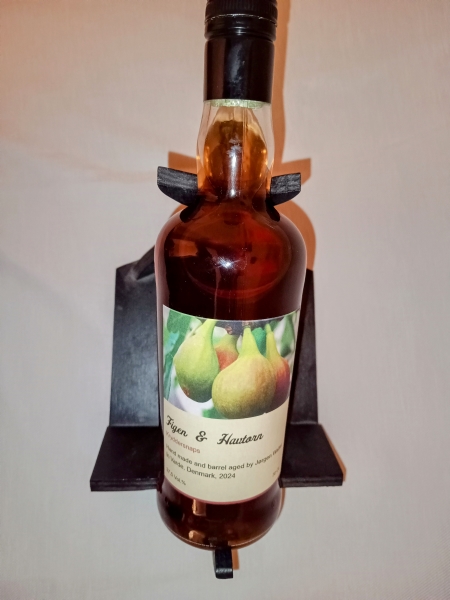
The first fig and sea buckthorn snaps in 2024 NB: I think that sea buckthorn is overrated for making a spice schnapps. So! If it is to stand alone. It is fantastic as an essence for many sweet fruits, or a combination of figs and sea buckthorn. My first test after 2 months was beyond all expectations. Crystal clear after filtering once in a coffee filter and a taste without parallel - suitably acidic and with a subdued sweetness. How will it be after a year or two? Back to the page where you came from. |
|
Nr. 59 Santa Maria Pear Snaps 2024
Danish version Next Down |
|
700 ml Swedish Vodka 37.5Vol.% 400 g 2 pcs. Santa Maria Pear 4 cl. Pernod Option Star anise, whole Preface: I found them at a "Foreign Greengrocer" here in town, some large pears which were definitely not from Denmark. They were from Italy and to be more precise, Florence. It was here that this variety was bred in 1951. The originator is A. Moretinni. He managed to create a variety by crossing Summer Duchess and Koschia. Read the description of this very sweet Pear Santa Maria.
Accessories: 1 liter glass with lid Soaking time 2 months in a cool, dark and dry place. But watch the schnapps for the first few weeks and give it a shake. Then let it stand quietly until the fruits are strained. Put the vodka in a clean, new bottle and dilute with more vodka if the bottle is not full. Or even better, put more vodka on the fruits and let it soak for another 2 weeks. Then mix the 2 extracts. You can expect a mild, sweet pear schnapps, which should only be matured in a cool, dark and dry place for a few months. Decant the schnapps if a little sediment has formed after maturation. 
The Santa Maria Pear that I bought didn't have "Red Cheeks". See below. Procedure without liability
Put the bottle away to mature for a few months in a cool, dark and dry place. Have fun. When the time comes for the first taste test, I will assess whether more vodka should be added to the Schnapps, or whether it is suitable according to the recipe. It is often the case that fruits are more or less strong or sweet in taste and this pear is very sweet. See also: Calculation of water & sugar & Alcohol Vol.% in fruit and berries for spice schnapps. Or this Sugar and water in pear. 
Fresh, ripe Santa Maria Pear, ready to pick My 1 liter glass filled with 2 Santa Maria Pears and 600 ml Swedish Vodka. It couldn't all be in the glass. Awaiting the tasting. Tasted after 2 months: Very sweet, lacking a little acid and needs to add more vodka, when it is filtered and bottled. Regarding acid sea buckthorn can work wonders. NB: Compared to the Danish pears that I otherwise use, Santa Maria pears are much sweeter and juicier, so I think you should add a few percentages when determining the sugar and water content . Thus gives: 10.9% + 2% = 12.9% for sugar and 85.1% + 2% = 87.1% for water. Back to the page where you came from. |
|
No. 60 Bergamot Liqueur 2024
Danish version Next Down |
|
700 ml Swedish Vodka 37.5 Vol.% *3 pcs. Bergamot fruits, see text below 6 pcs. Cardamom seeds, whole 6 pcs. Cloves, whole ½ Vanilla bean, split and cut 25 g Orange peel, Dr. Oetker 2 Stems Rosemary, organic. fresh 100 g Muscovado sugar per liter of liqueur that you get. Option Star anise, whole. Not used Preface: Bergamotte fruits are from Italy, but can also originate from other countries. I bought my Bergamots online at Camilla Plum. They come from Calabria in Italy, the part that forms the foot of the boot country. Read the description of this citrus fruit Bergamot. See also: Calculation of water & sugar & Alcohol Vol.% in fruit and berries for spice schnapps.
Accessories: 1.2 liter glass with lid and large opening Soaking time 2 months room temperature, dark and dry. But watch the liqueur for the first few weeks and give it a shake. Then let it stand quietly until the fruits have to be removed. Pour the liqueur into a clean, new bottle and add more vodka if the bottle is not full. You can expect a mild, very sweet and citrus-like liqueur. The liqueur matures in a cool, dark and dry place for a few months, after which it is decanted if a little sediment has formed after maturation. Measured pH to 3.3 at 24°C. 
Bergamot citrus fruit added to Swedish Vodka in my new 1.2 l glasses Procedure without liability
My goal is to produce a sweet liqueur with a citrus flavor and especially with a bergamot flavor, now that I have obtained some (1 kg = 7 pcs.) organic fruits from Italy. You must use as much of the green shell as possible. It is precisely in the green shell that they essential oils is present, but avoid getting any of the white in the glass, as this contains the bitter substances. *I peeled 3 fruits for the greens and put them in the glass in small strips. Two fruits were quartered without the white and put on top. The third "naked" fruit I used as a lemon on my lunch fish fillet with remo. Honestly! better than lemon. See here how much liquid the mixture gives: Sugar and water in bergamot. Makes 700 ml Vodka + 257 ml Juice = 957 Liquid, almost 1 liter (remember something is lost). Calculate 100 grams of sugar, but find your sweet tooth yourself. If you look online for Bagamotte Liqueur, several will come up with different prices and alcohol strength. Ranging from 17 Vol.% to 40 Vol.% and of course the 17 Vol.% was the cheapest at DKK 159.00. I don't know how sweet the different liquois are, as I haven't tasted them. But per the definition of liqueur, a liqueur must contain at least 100 grams of sugar per litre. I will set the minimum limit for the alcohol strength to 28 Vol.%, then you can be sure of a good shelf life and a suitable strength for the women who will taste "The Juice" for Christmas. 
Image of bergamot citrus fruit and its flowers Awaiting the tasting. NB: Continuation to follow soon Back to the page where you came from. |
|
No. 61 A sample of a Raspberry Schnapps - Schnaps aux Framboises
Danish version Next Down |
|
700 ml Swedish Vodka 37.5 Vol.% - Weighed weight 645 grams
Water content in Vodka = 700*62.5% = 437.50 ml (at 4°C) = 437.50 grams Alcohol content (100 Vol.%) = 700 * 37.5% = 262.5 ml = 262.5 * 0.78934 = 207.20 grams Calculated weight for 700 ml Vodka (37.5 Vol.%) = 437.50+207.20 = 644.70 = 645 grams 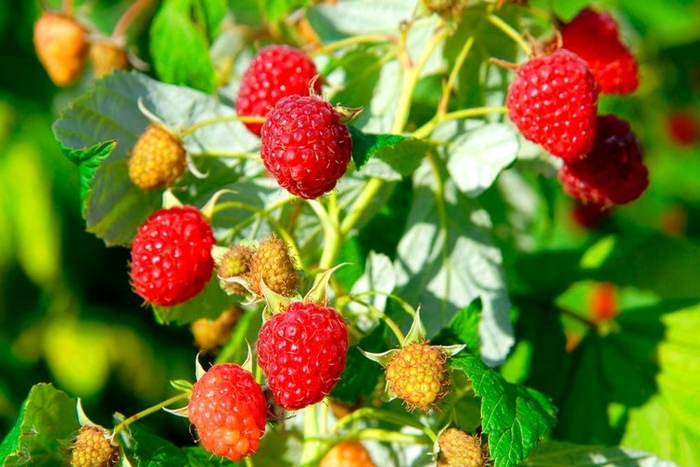
Ripe and fresh raspberries for a Schnaps aux Framboises 250 g raspberries, ripe and whole species Noelia Spain Raspberry water content 85.9%*250 = 215 grams Raspberry sugar content 6.9%*250 = 17 grams Gross weight of the mixture = 645+250 = 895 grams Net weight of the mixture = Vodka (37.5Vol.%) + Raspberry water + Raspberry sugar = 645+215+17 = 877 grams Dry matter remaining in the berries = 895-877 = 18 grams Expected ABW% [207.20/877] % = 23.62% ABW% Formula for converting from ABW% to ABV% = (99823*ABW%)/(20923*ABW%+76769) = 28.83% ABV% According to AlcoDens APP, 23.62% ABW% = ABV% = 28.82 Vol.% According to my Excel calculator, ABV% 28,70% and ABW% 23,63% Sukker procenten er 1,9% Measured pH to 3.15 at 24°C. If you have the Excel program on your PC, use this: Raspberry Schnapps calculations Preface: When the schnapps has soaked for 2 months, I will strain the berries and squeeze as much juice out of them as possible. The total amount of schnapps is measured and weighed, as well as the weight of the berries. Then you can calculate the utilization rate of the berries and thus the final ABV%.
Accessories: 1 liter glass with lid Procedure without liability
Soaking time 2 months at room temperature, dark and dry. But watch the schnapps for the first few weeks and give it a shake. Then let it stand quietly until the fruits are strained. Put the schnapps in a clean, new bottle. Then make the new measurements before refilling. You can expect a mild, perhaps sweet Raspberry Schnapps. The Raspberry Schnapps matures in a cool, dark and dry place for a few months, after which it is decanted if a little sediment has formed after maturation. 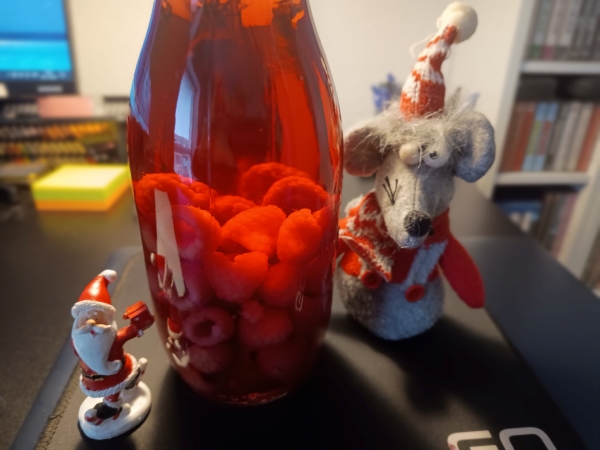
The sample of the raspberry schnapps can be seen here on December 20, 2024 Postscript The intention with this raspberry schnapps is to make a schnapps with as few ingredients as possible and because I want to check my calculations in my Excel spreadsheet by measuring the raspberry schnapps. But of course I expect an acceptable schnapps in the end. More on this when the "Snaps" is finished and has been evaluated. Now the raspberries has been soaking for 7 weeks in vodka and the raspberries are completely pale, so I assume that all the power and juice has been extracted into the schnapps. The raspberry schnapps has been strained and the raspberries have been pressed as much as I could. This gave the following result: 742 ml of measured raspberry schnapps, which is inserted into the Excel spreadsheet. The calculation shows: ABV % 29.8% ABW % 24.7% Sugar % = 1.6% Berry utilization % = 84% The 742 ml raspberry schnapps weighs 713 grams and the residual product was weighed at 152 grams. Total weight 713 grams + 152 grams = 865 grams and we started with 895 grams. 30 grams have been lost during the handling of the schnapps (filtration and spilled schnapps), which corresponds to 3.4% shrinkage. Then I'll come to the tasting, it is a bit disappointing, very sour and tastes too little of raspberry. But I put the schnapps away and let it mature for half a year in a dark cupboard. Back to the page where you came from. |
|
No. 62 A Scottish Gaelic Whisky - Uisge Beathe
Danish version Next Down |
|
1 bottle 700 ml Swedish Vodka 37.5 Vol.% 5g Anise seeds, whole 5g Dill seeds, whole 5g Fennel seeds, whole 5g Coriander seeds, whole 5g Cardamom seeds, whole 5g Cloves, whole 5g Paradise seeds, whole All seeds get a few bumps in a mortar, so that the shell cracks 1 Stick Cassia cinnamon whole, crushed 1 Stick Ceylon cinnamon whole, crushed The cinnamon sticks are lightly crushed with a hammer 5g Lemon peels, dried 5g Licorice root, cut 1 stk. *Nutmeg with 2 strands Mace ½ teaspoon **Hyssop ½ teaspoon ***Irisrod, powder (Iris Florentina) ½ ***Glass Saffron, threads (250 mg) 50 g Dates, finely chopped 6 pcs. 50 g Figs, finely chopped 6 pcs. 50 g Raisins 25 g Cranberries * Can be purchased together in a square can ** Not yet purchased *** Not found yet **** Used my essence 4 cl Preface: I found an interesting recipe online for a Scottish Gaelic Whiskey with Swedish ancestry - Cajsa Warg from Örebro. She was a well-known chef who apparently also made "Spice Schnapps." The recipe is above. I might want to double the mixture, but I'll see about that at that time, so I'll need an extra bottle of Vodka. You can also use your favorite neutral alcohol at about 40% vol. if that's what you want. I have measured the teaspoons of the spice mixture to grams because I prefer a more precise measurement for my spice schnapps. Accessories: 1 pc. 1 liter jars with lids 
Scottish Gaelic Whisky aged 2½ months Procedure without liability
Infusing time 2 to 3 months at room temperature, dark and dry. But watch the schnapps for the first few weeks and give it a shake. Then let it stand quietly until the fruits are strained off. Put the schnapps in a clean, new bottle. Then do a taste test before topping up. You can expect a strong, slightly sweet and spicy Schnapps (Whisky???). The schnapps matures in a cool, dark and dry place for a couple of months, after which it is decanted if a little sediment has formed after maturation. My spice schnapps soaked for 2½ months and was strained in my gold filter and bottled. After just 2 days, 2 cm of sediment had formed. The spice schnapps is very strong, so I do not steep twice, but add more Vodka when it has settled. It is now decanted and must be diluted 1:1 and left to mature for 6 months. 
Scottish Gaelic Whisky suitable for a cup of coffee Postscript: In 6 months there will probably be a comment here. Now the Spice Schnapps just needs to mature for at least half a year. Back to the page where you came from. |

one.com |